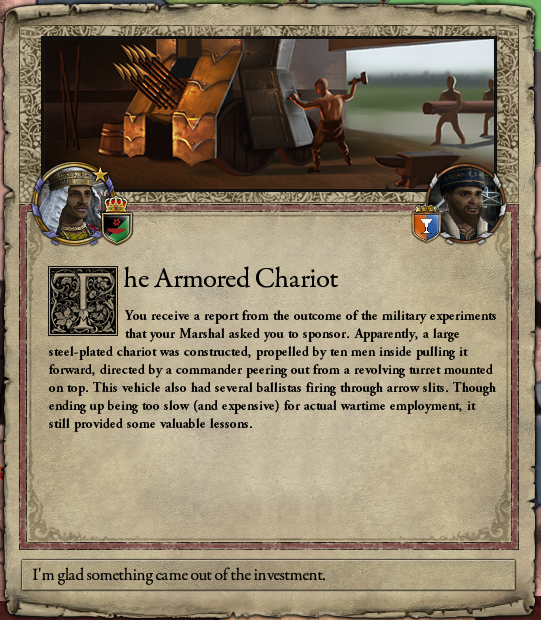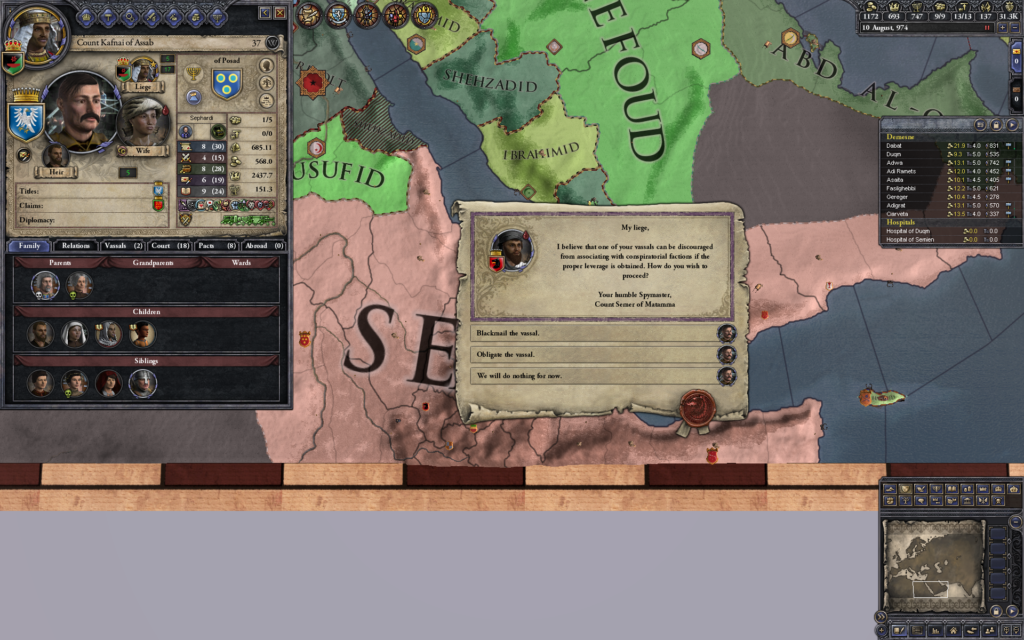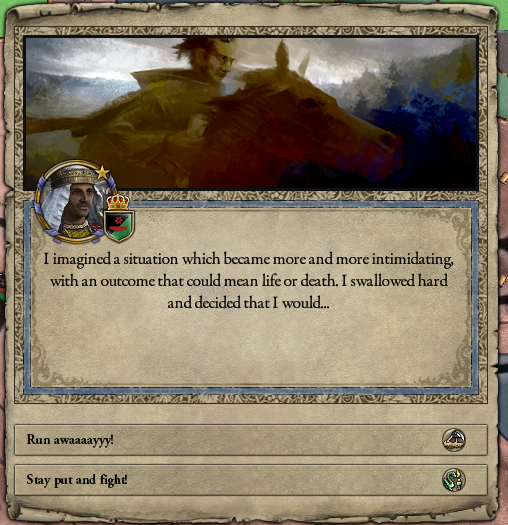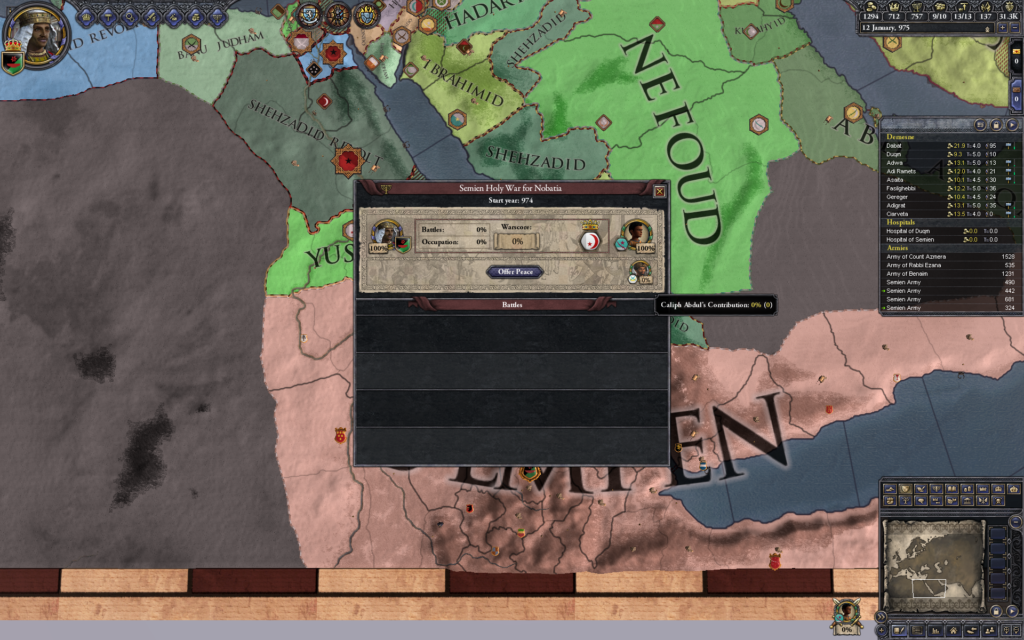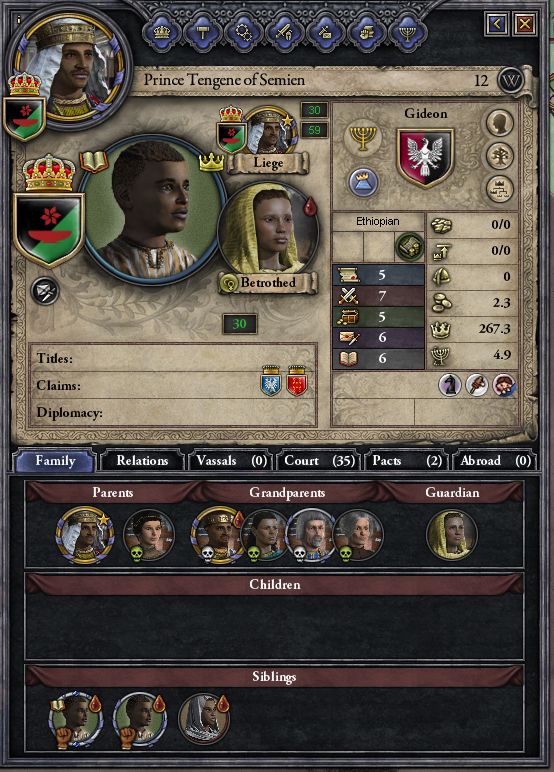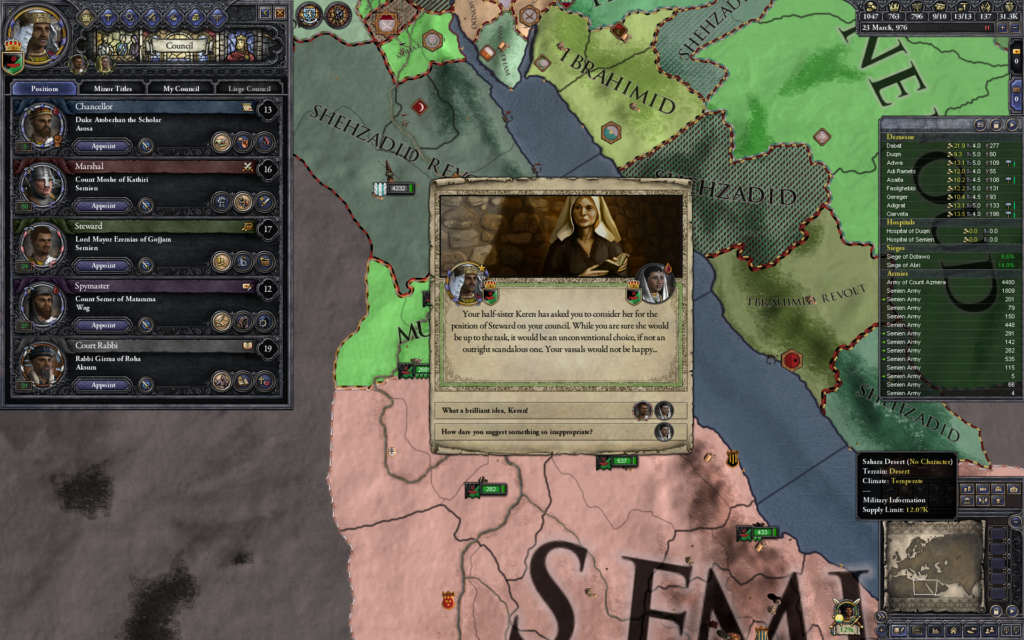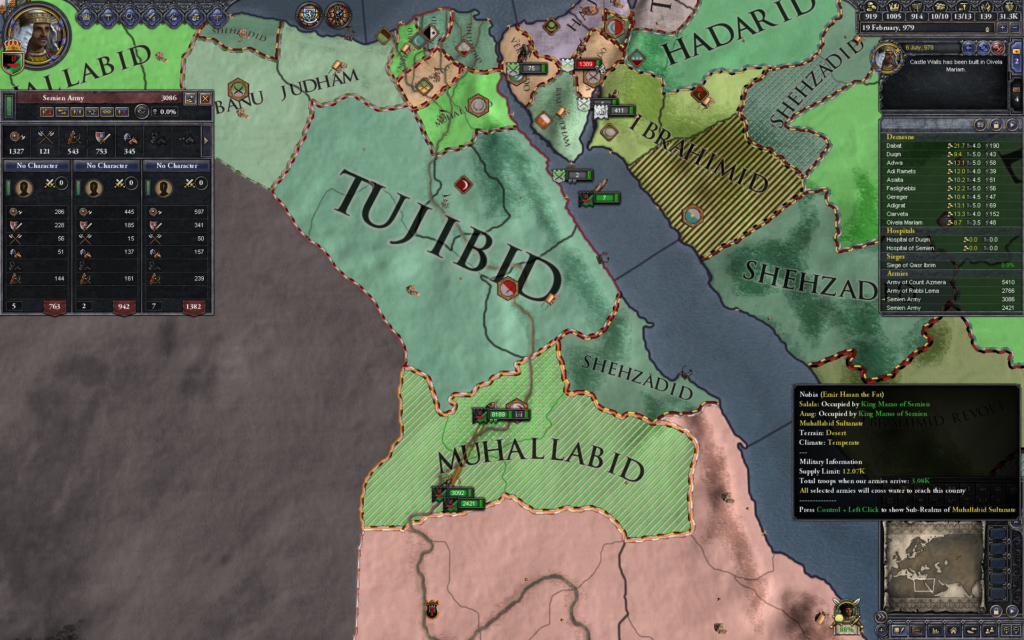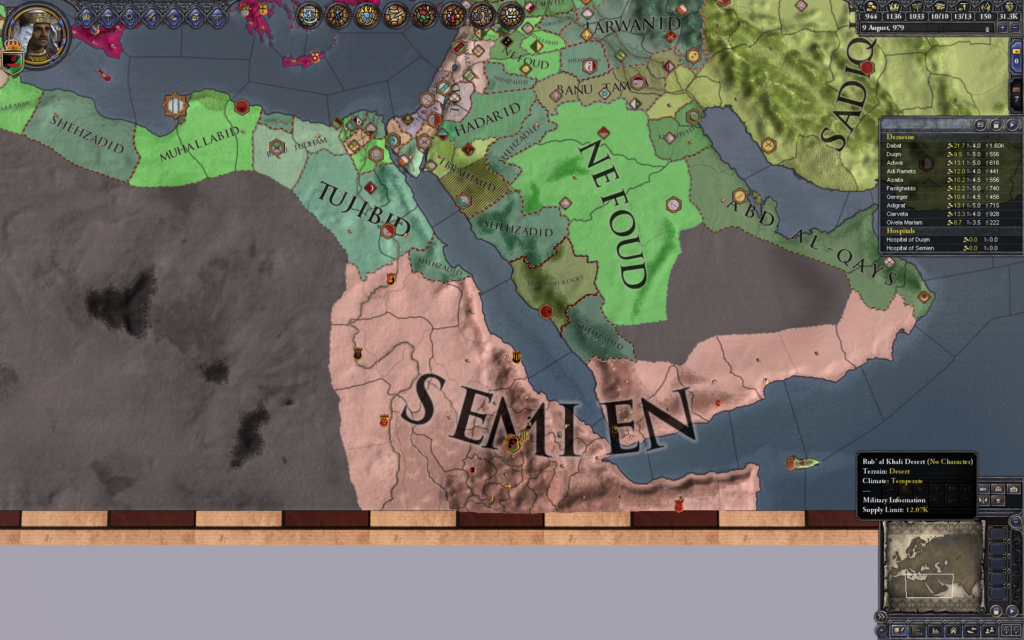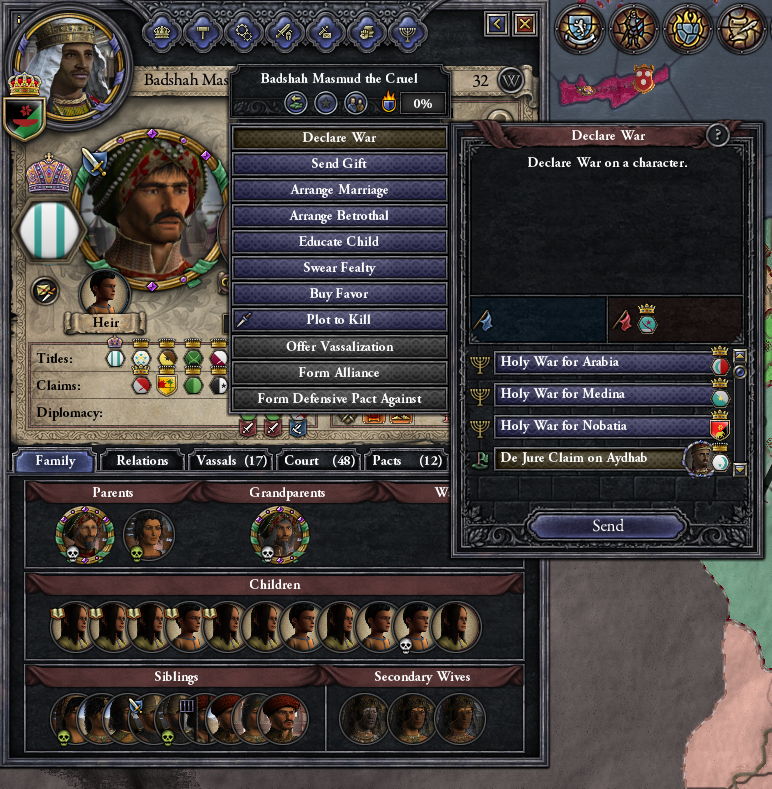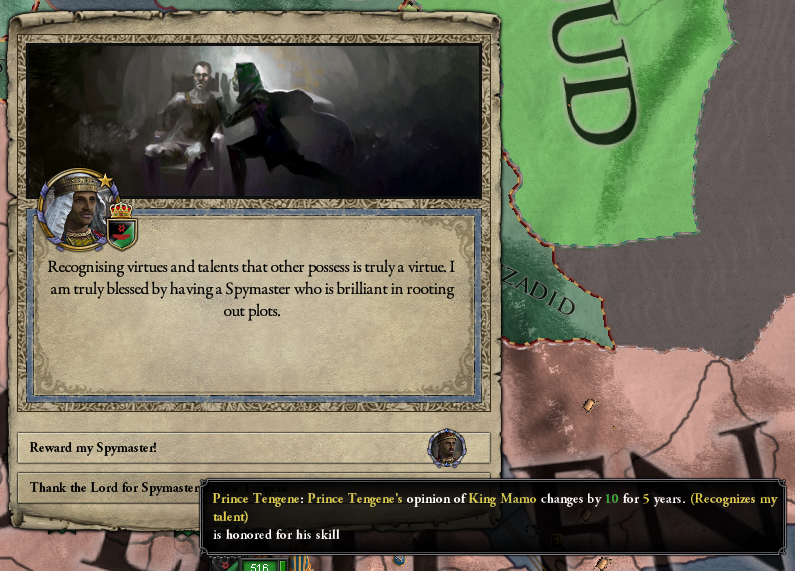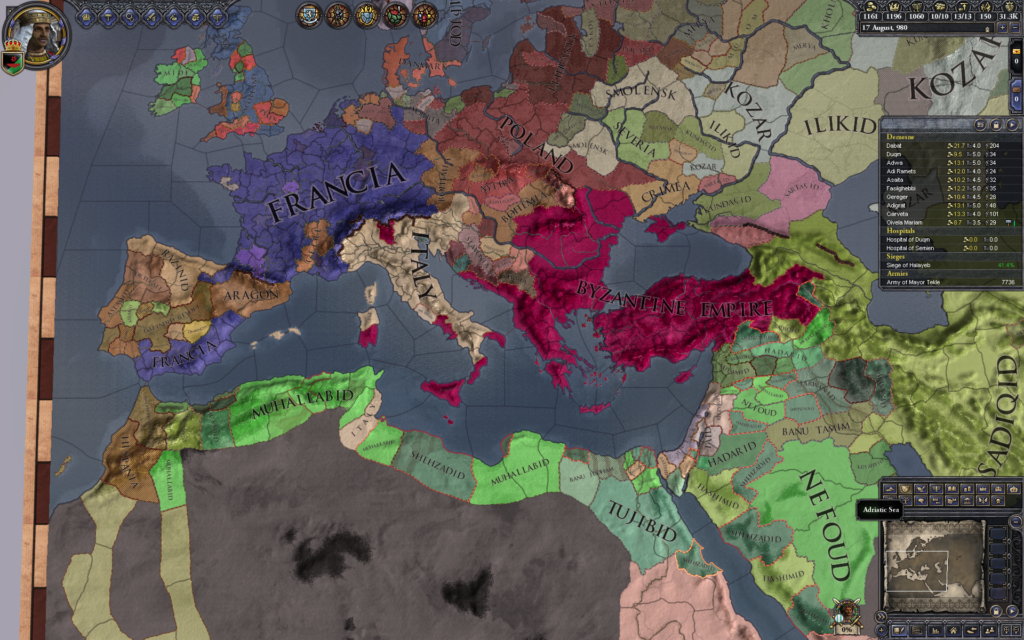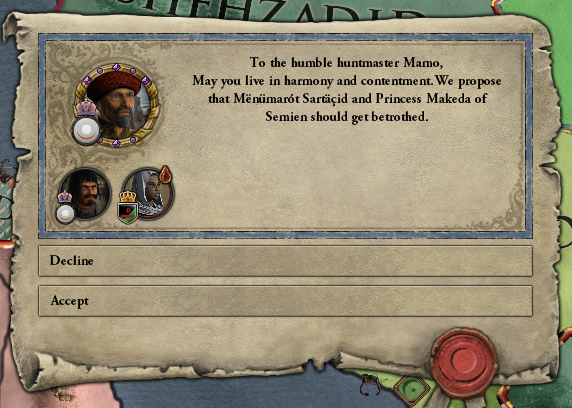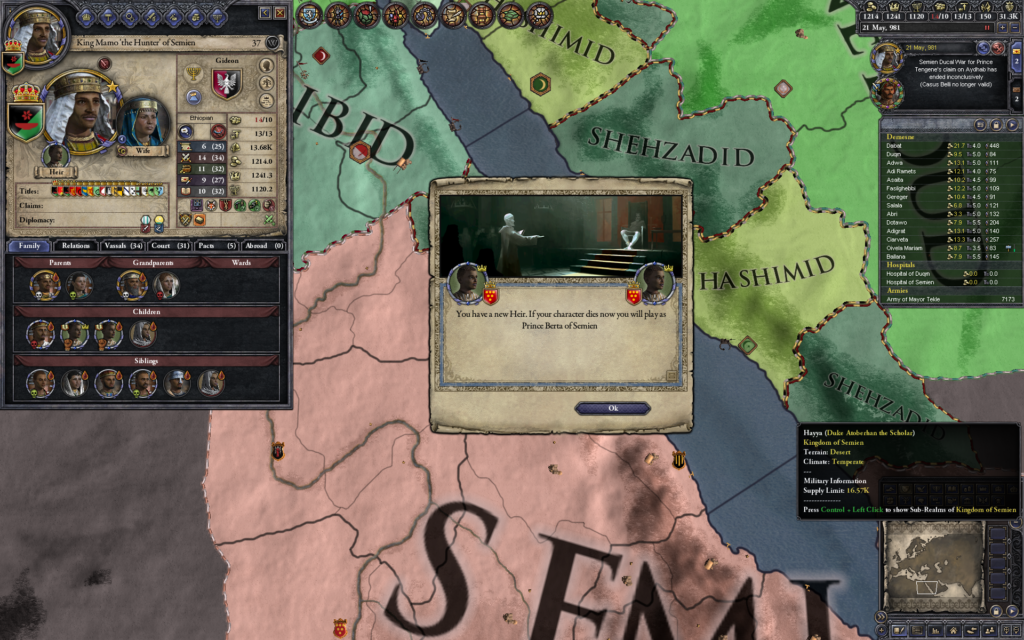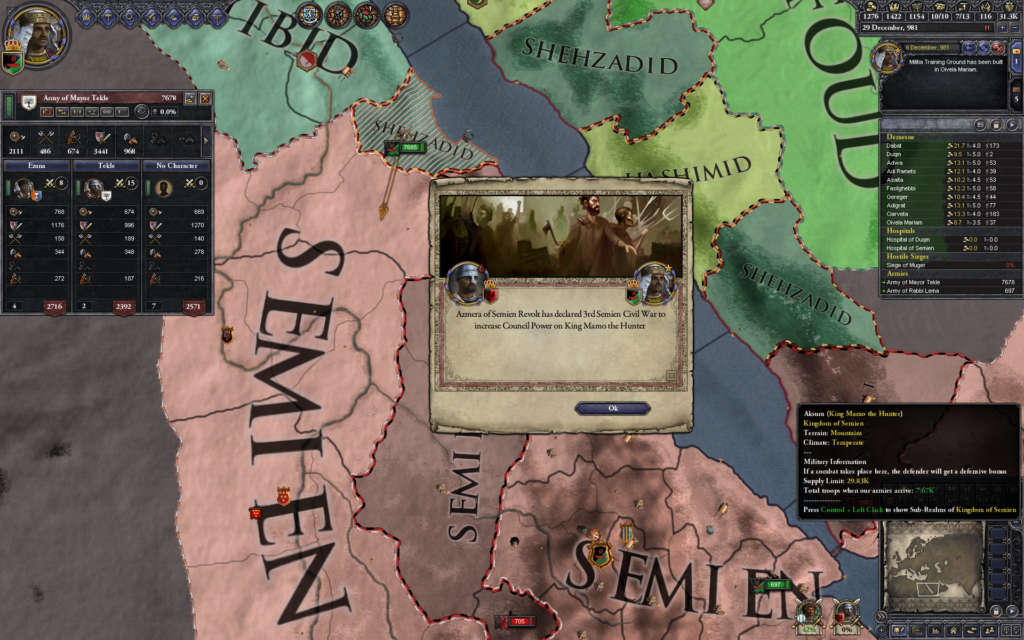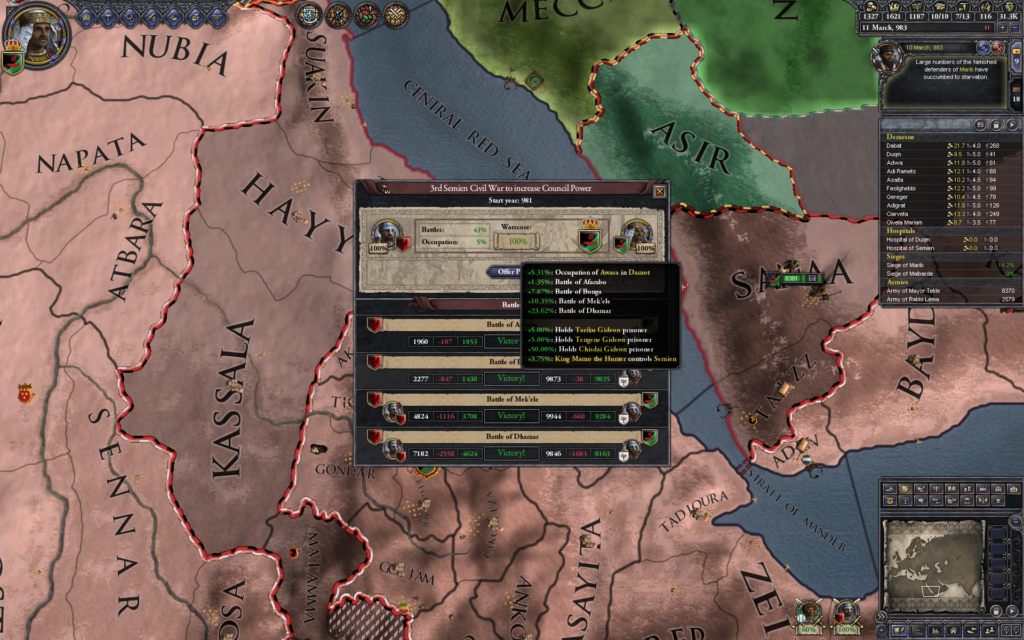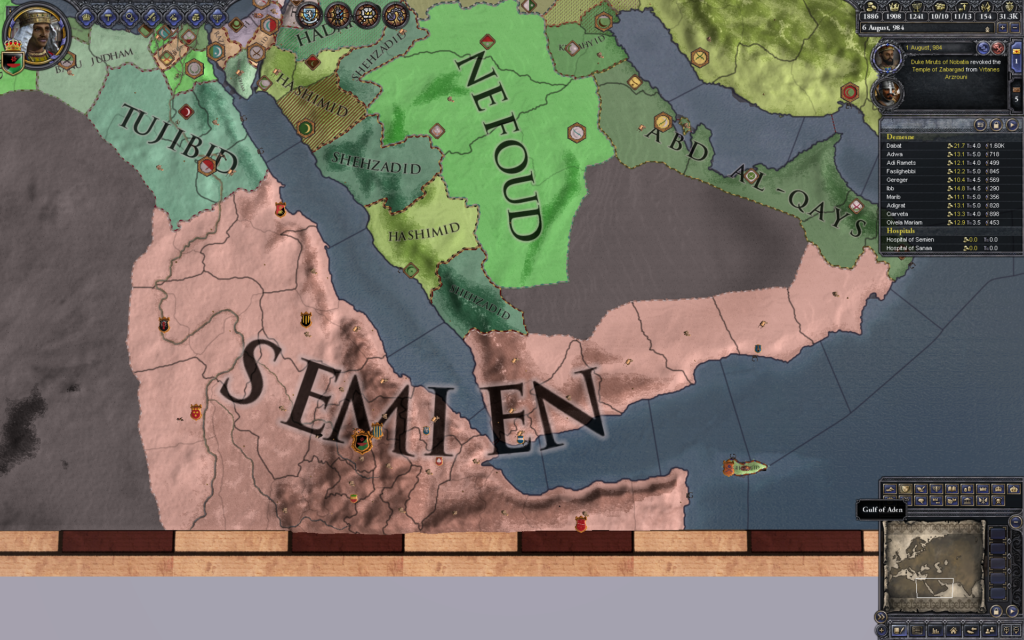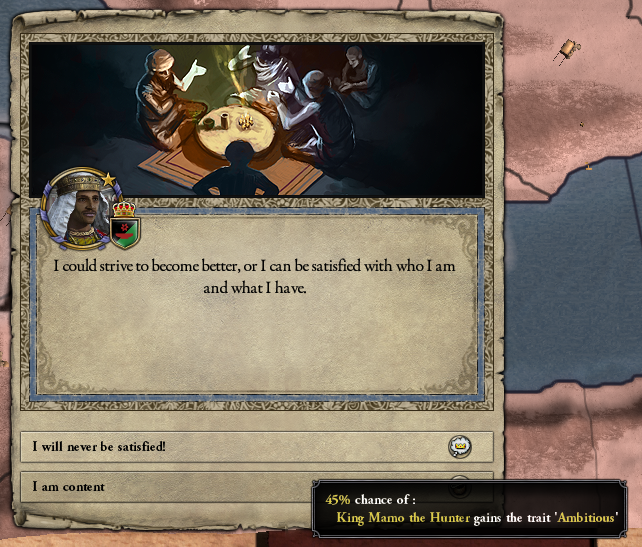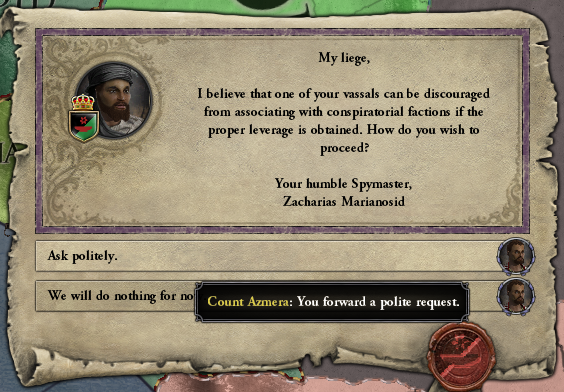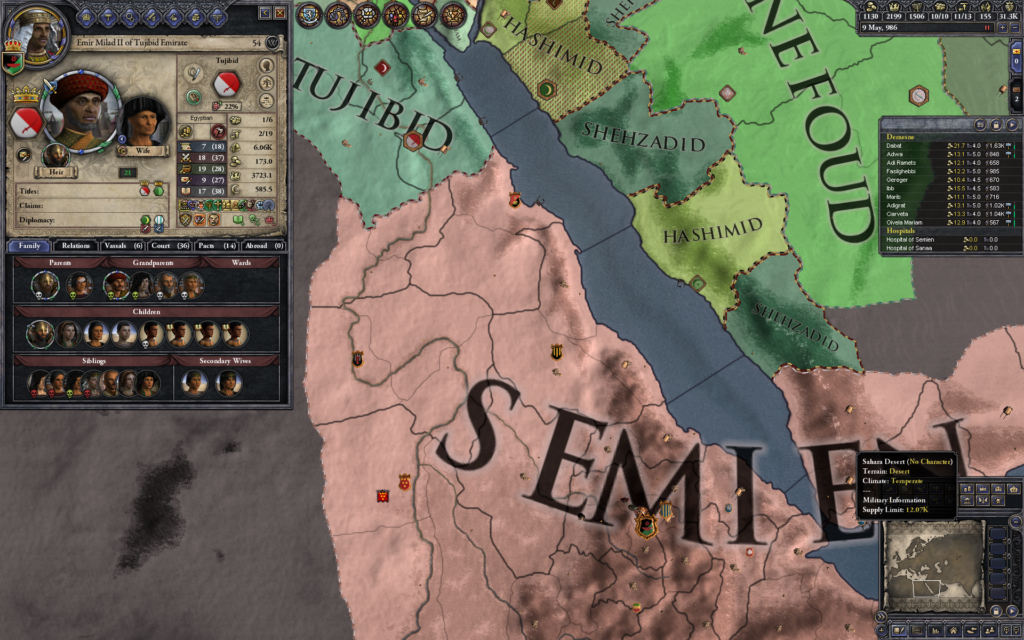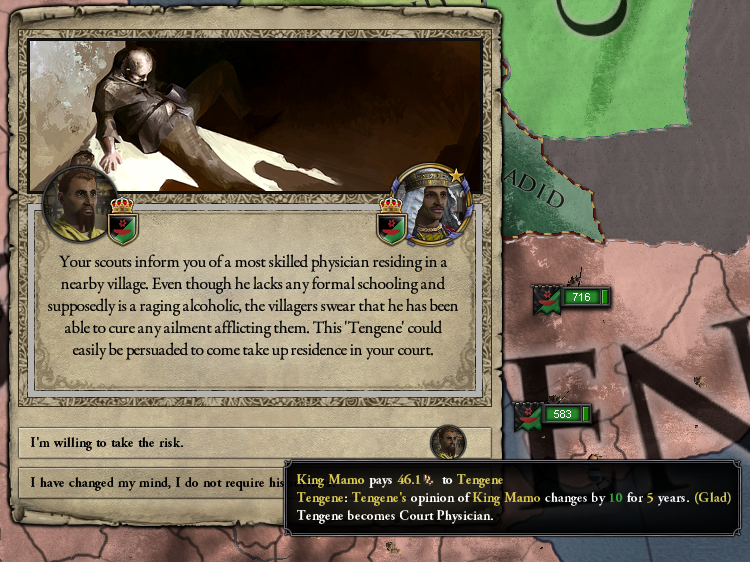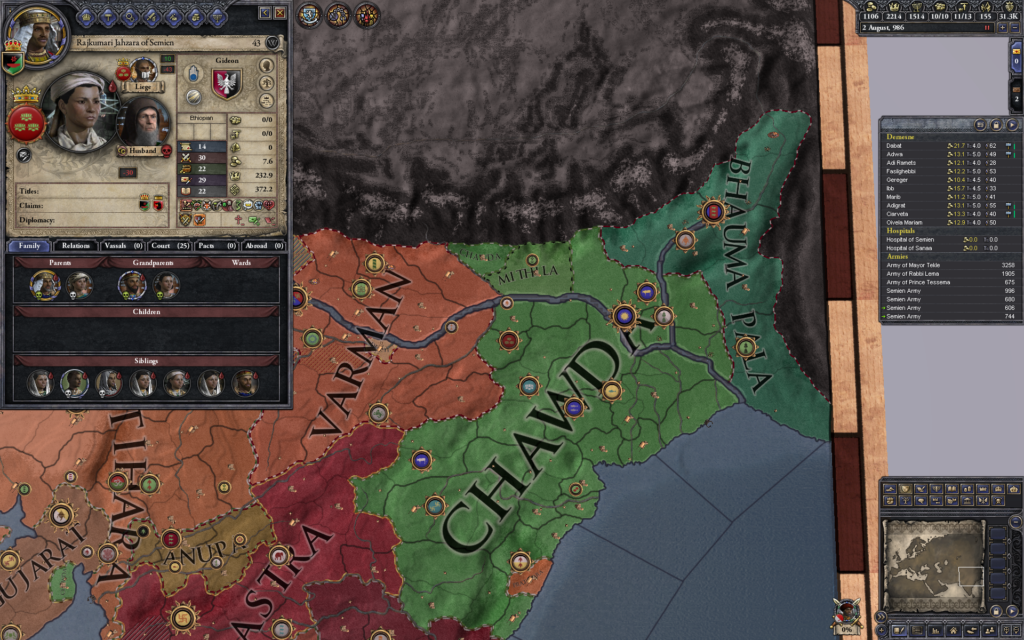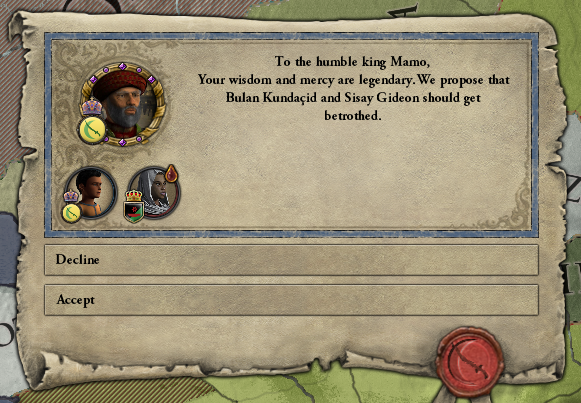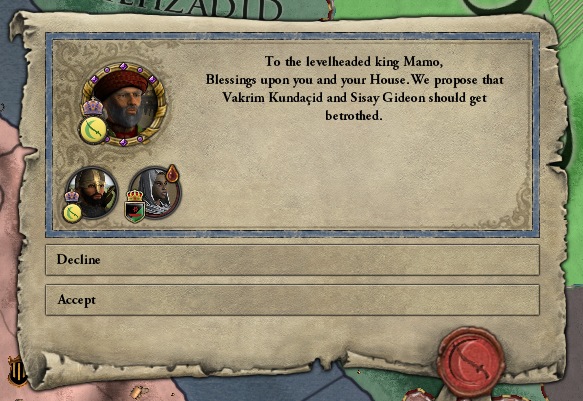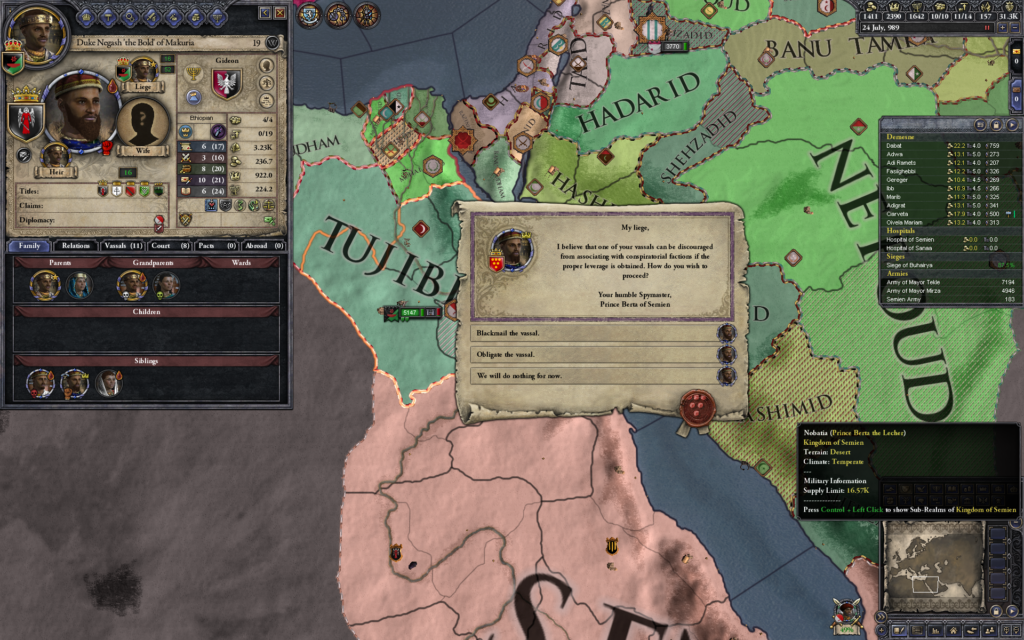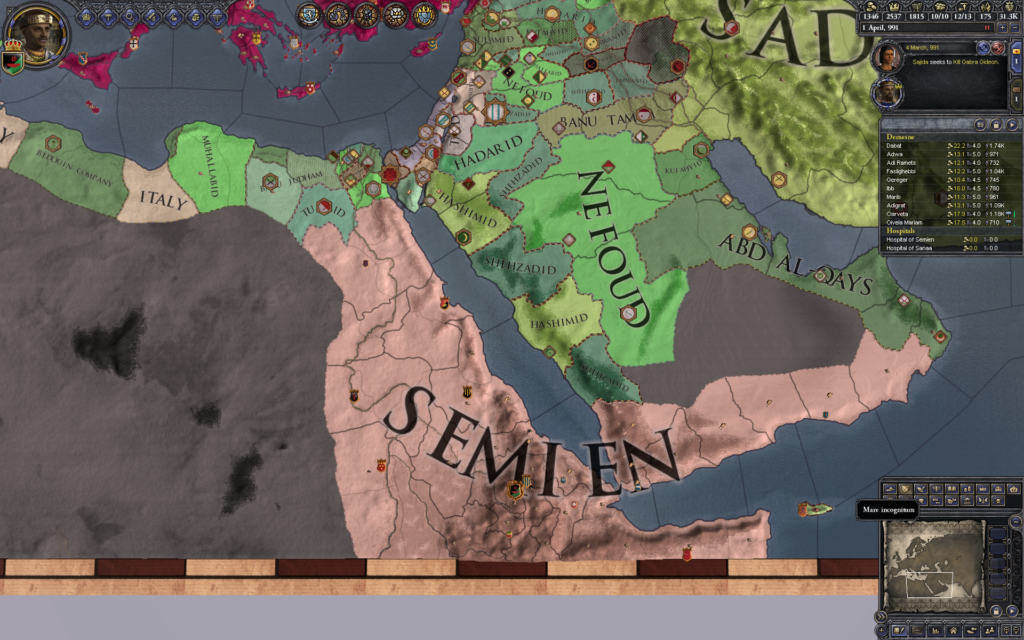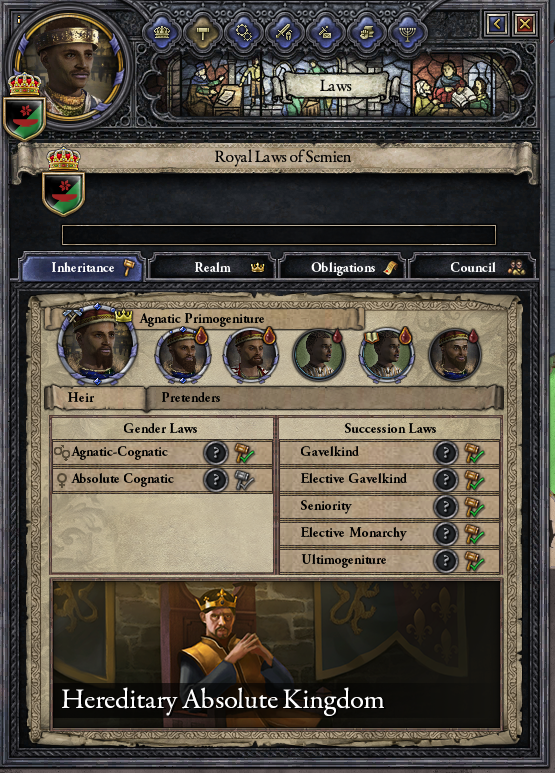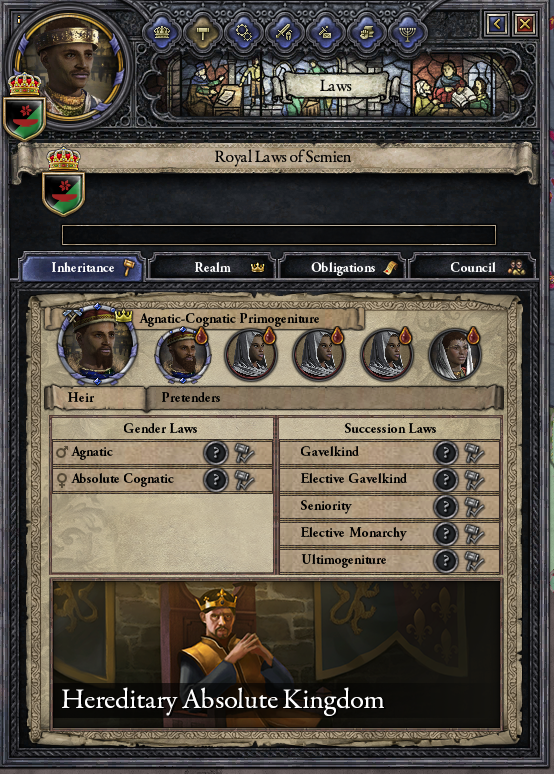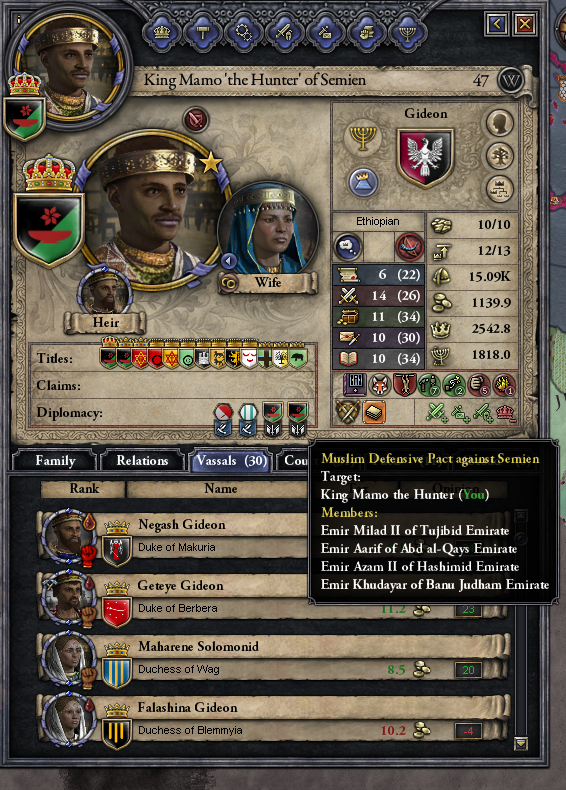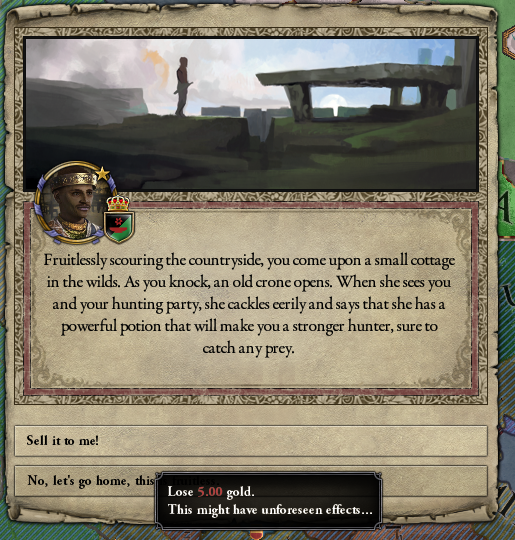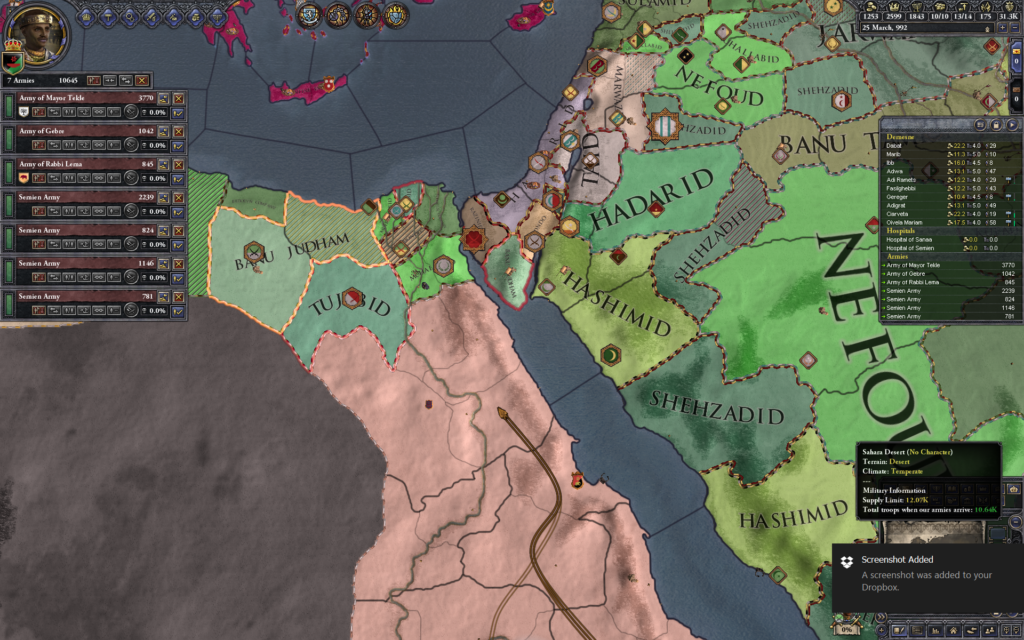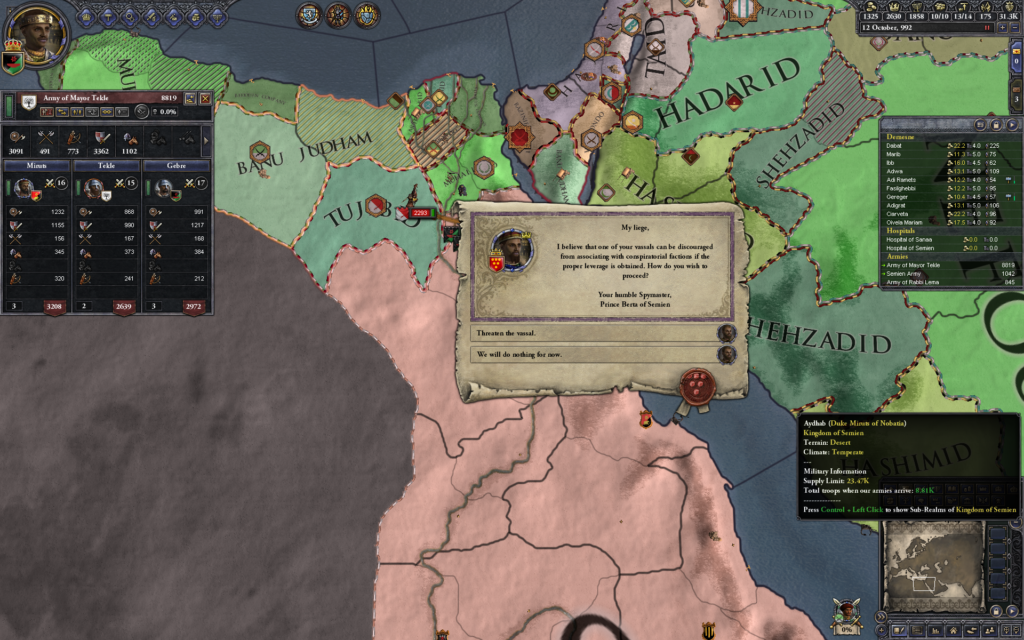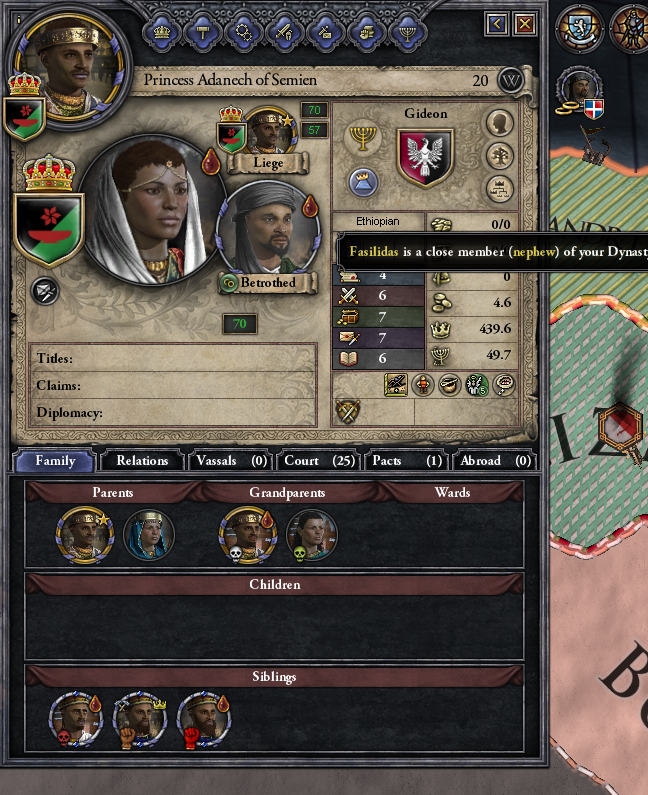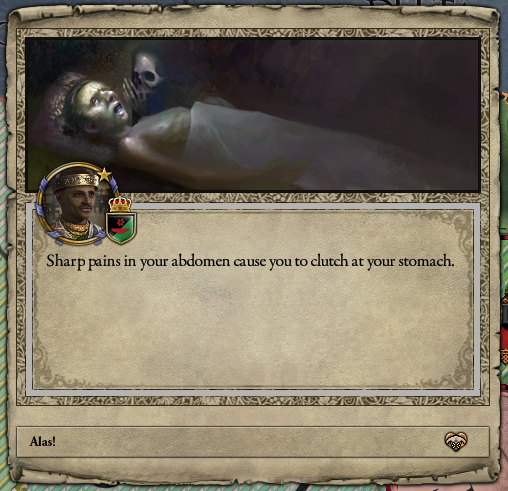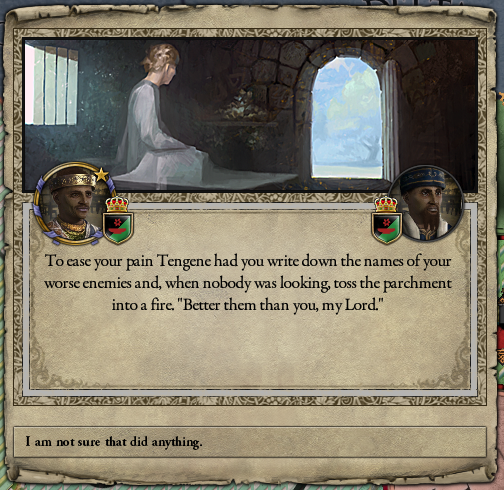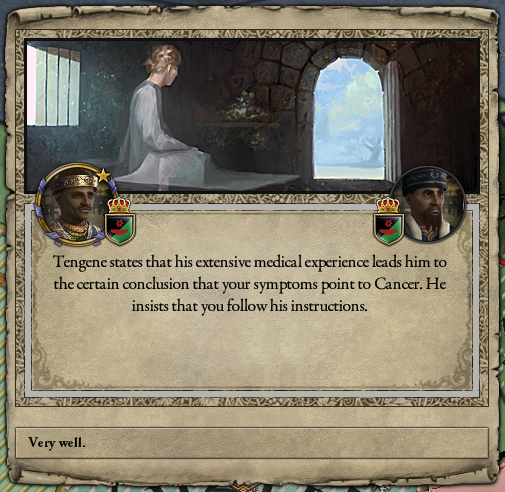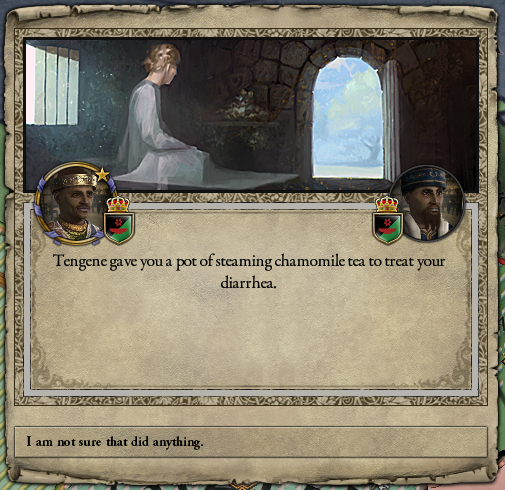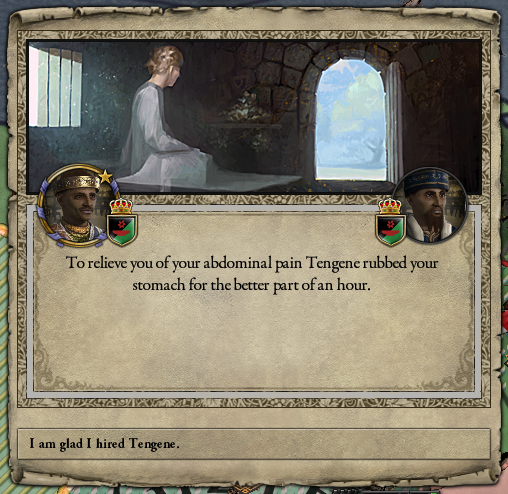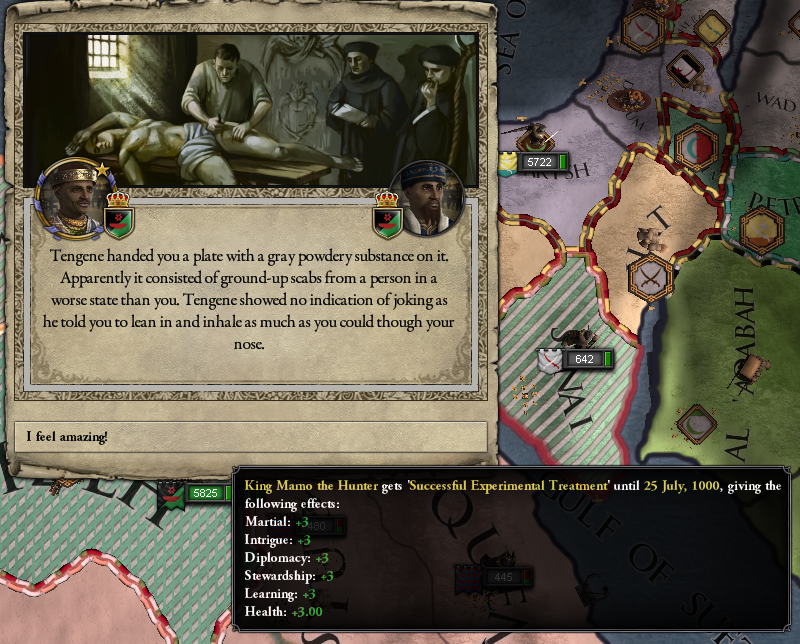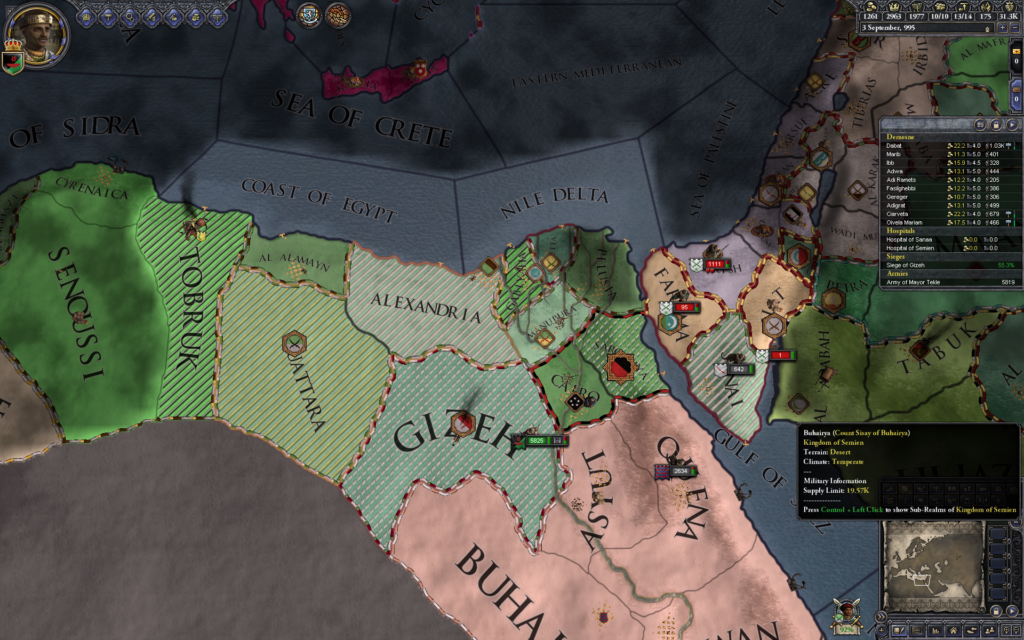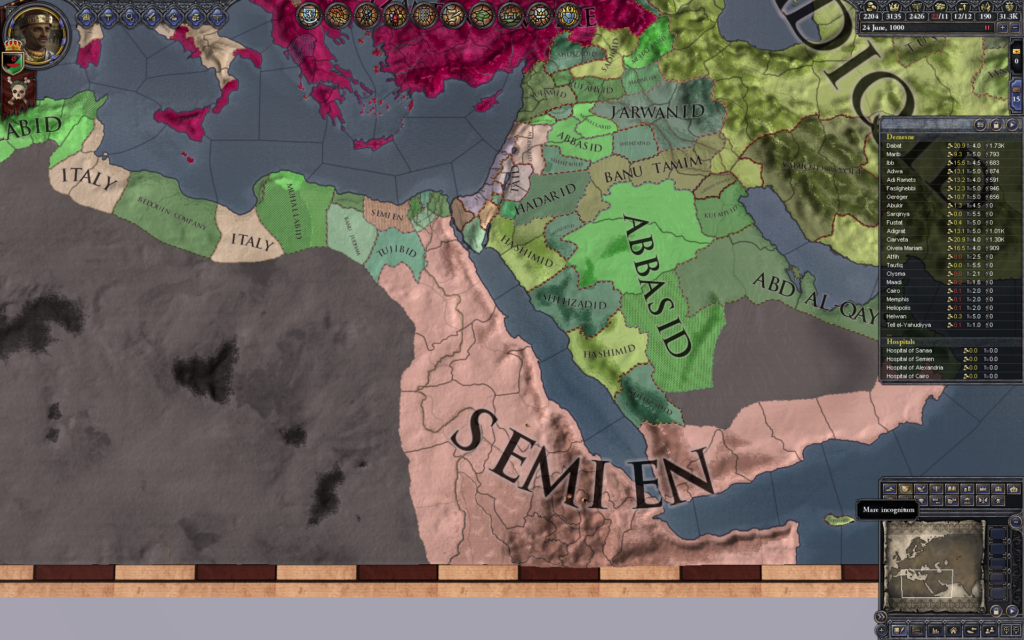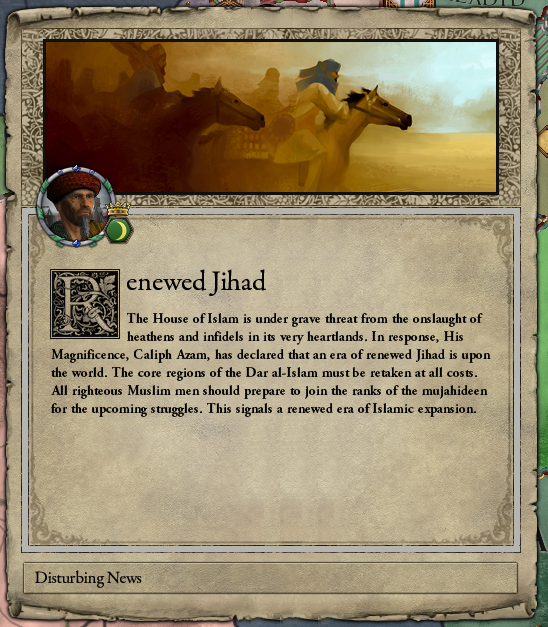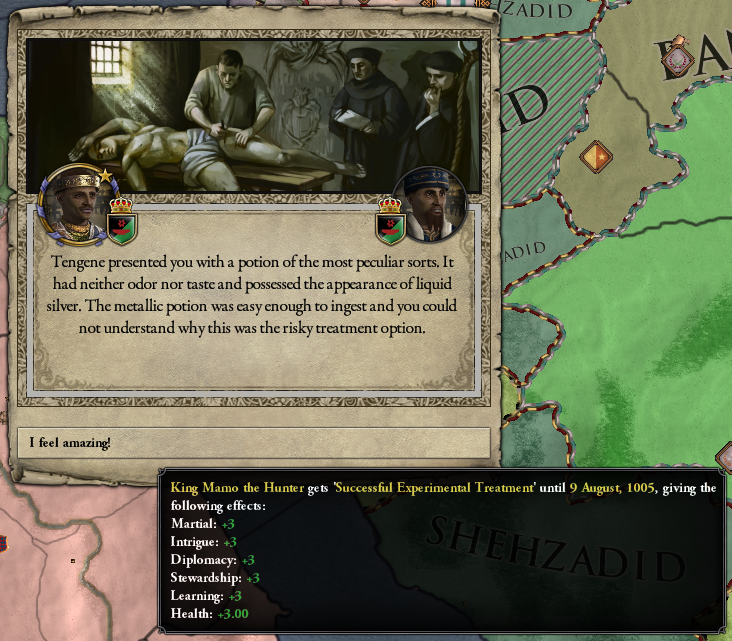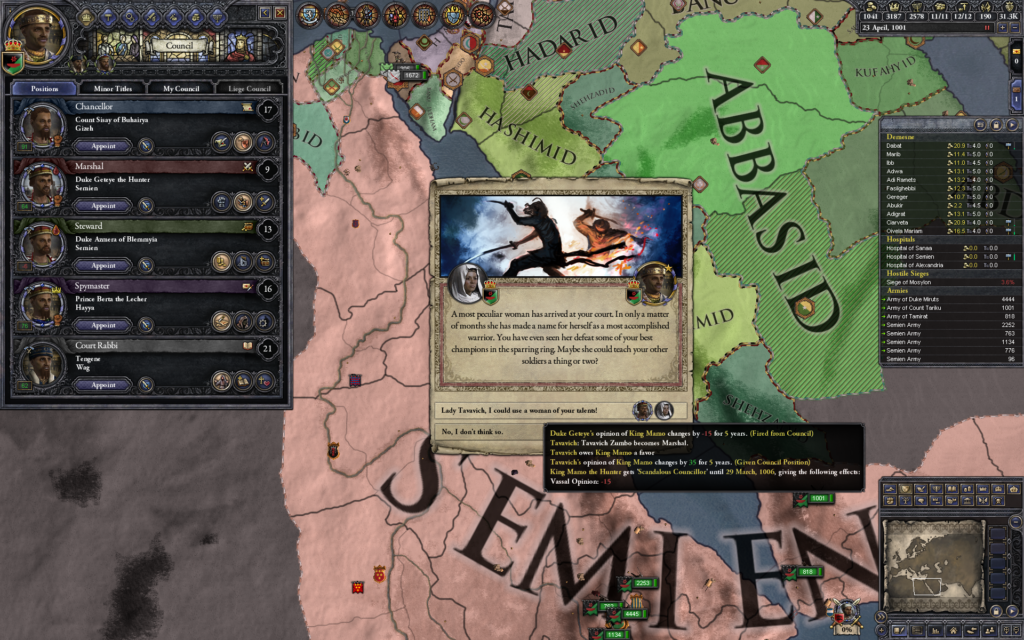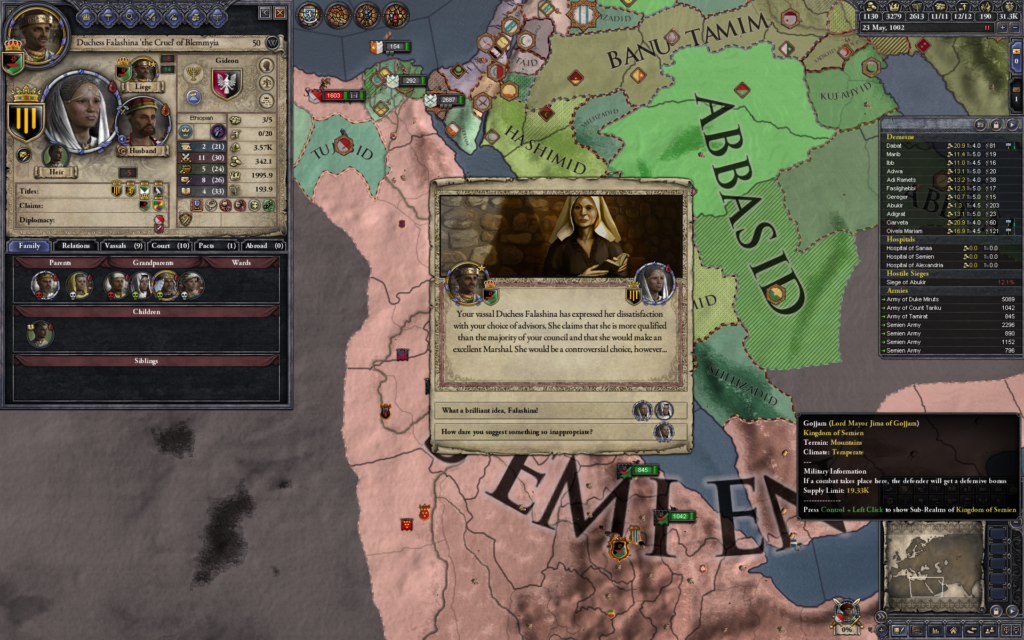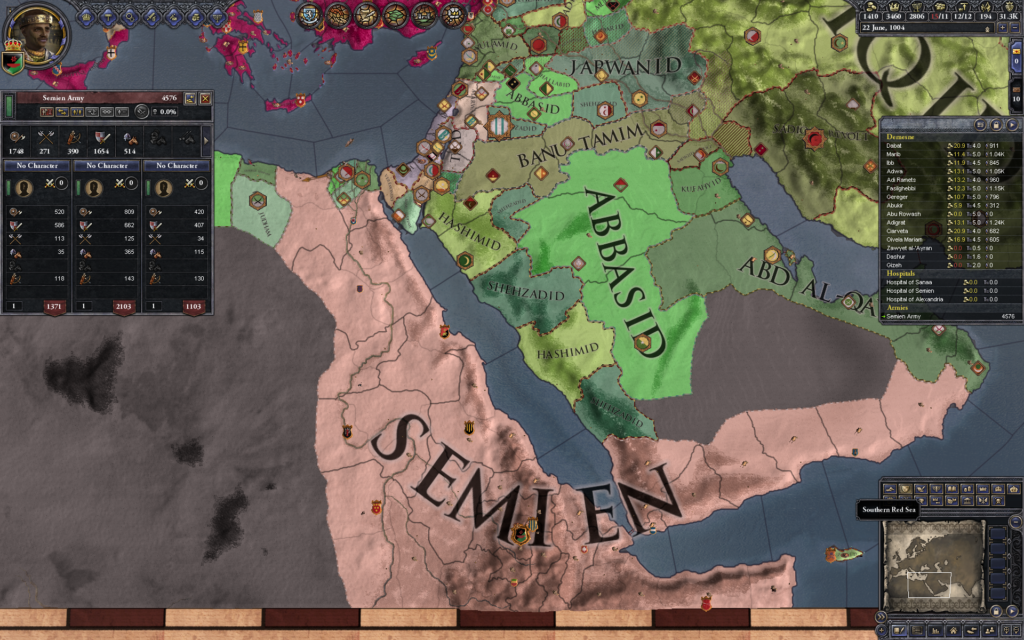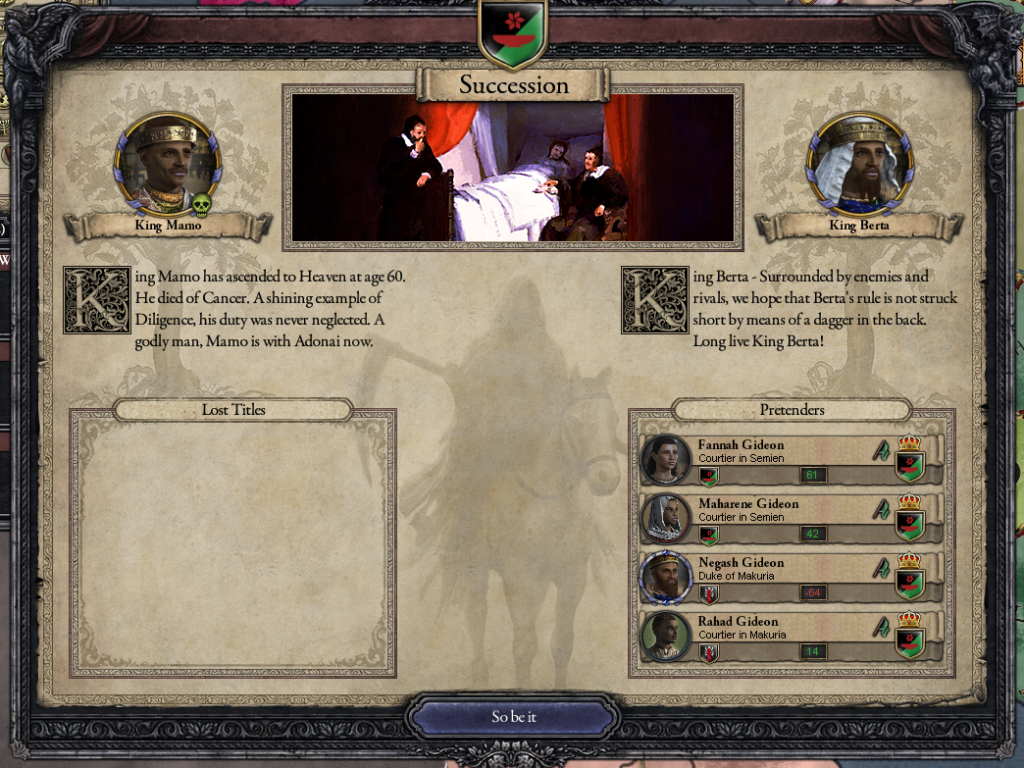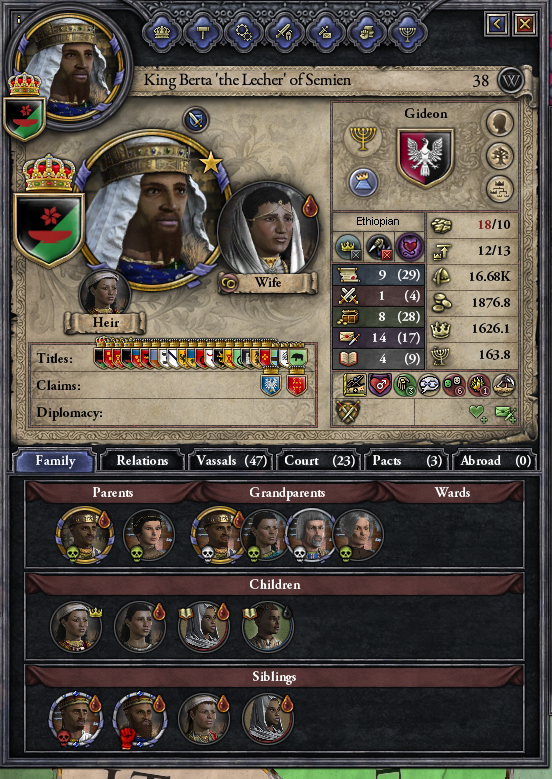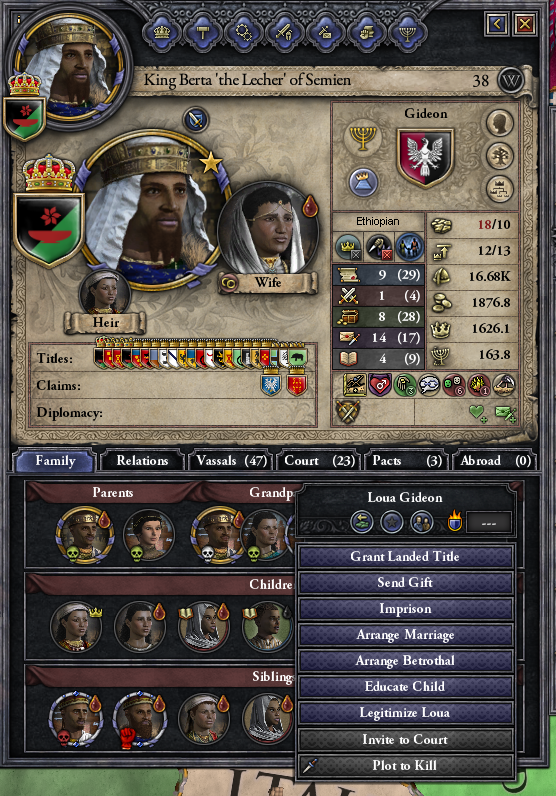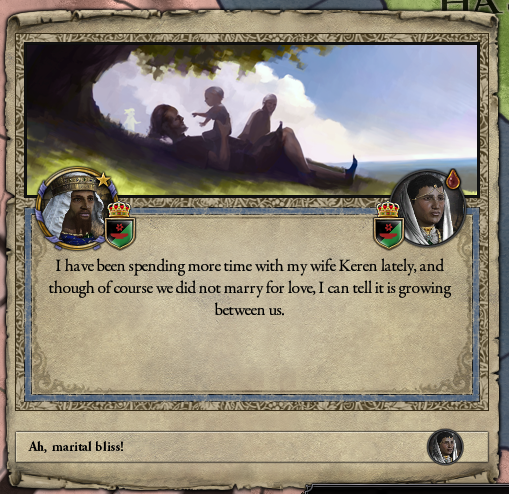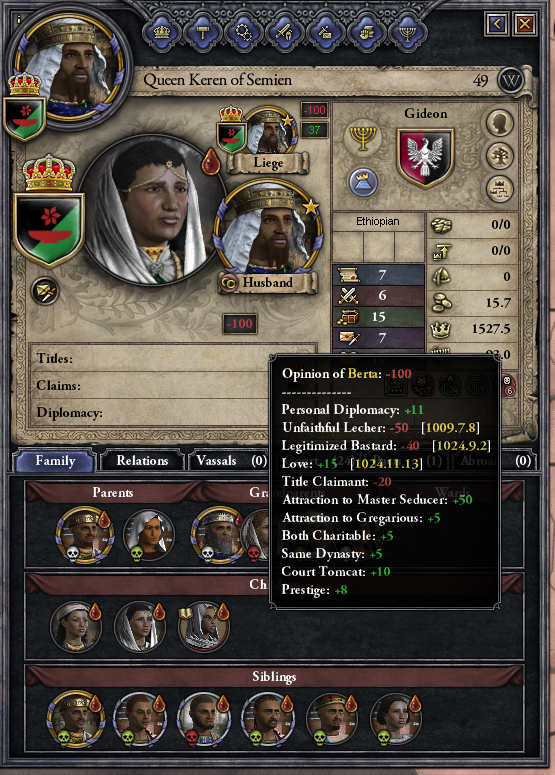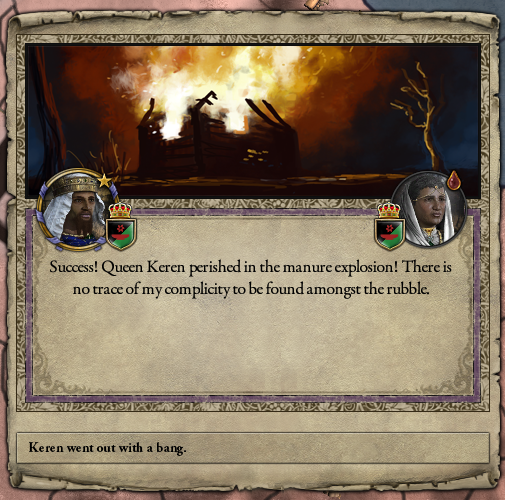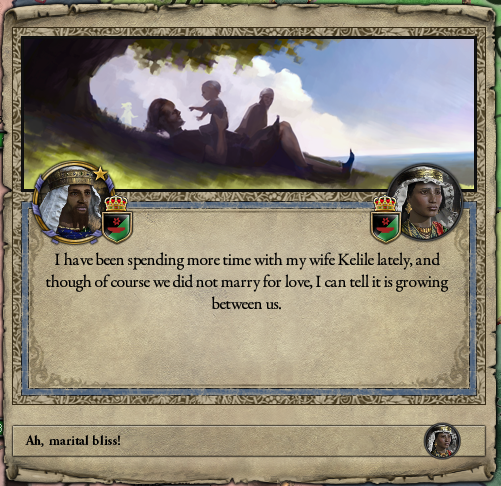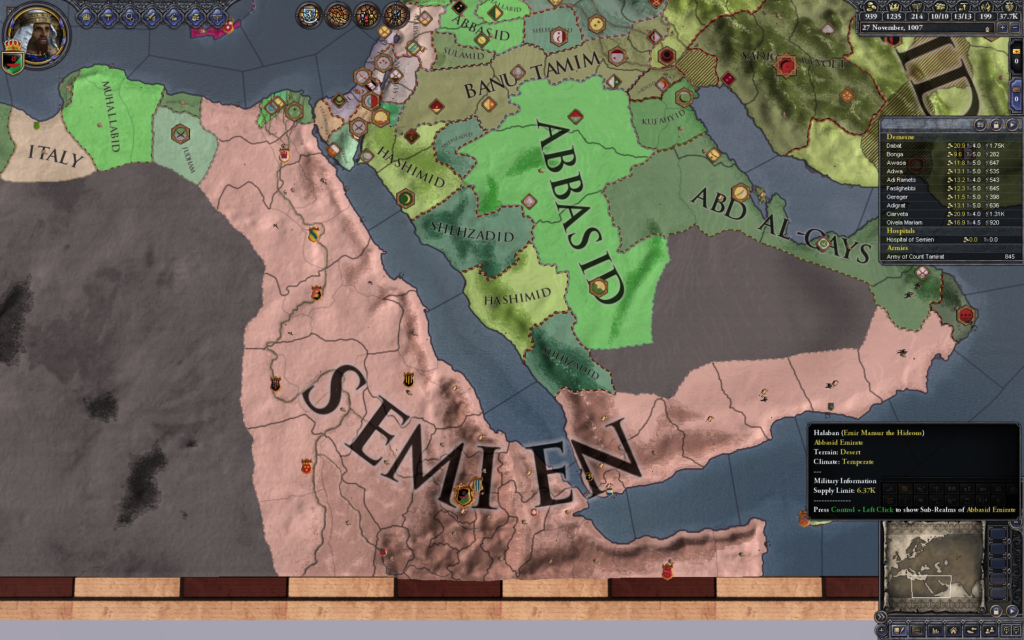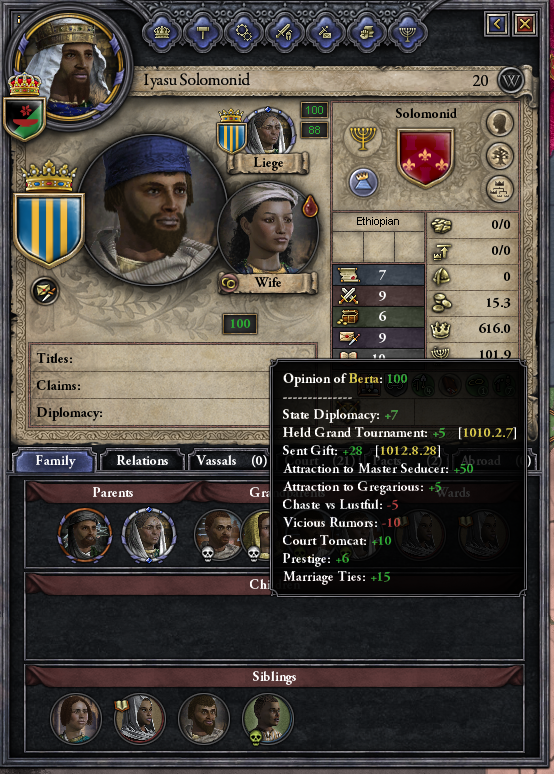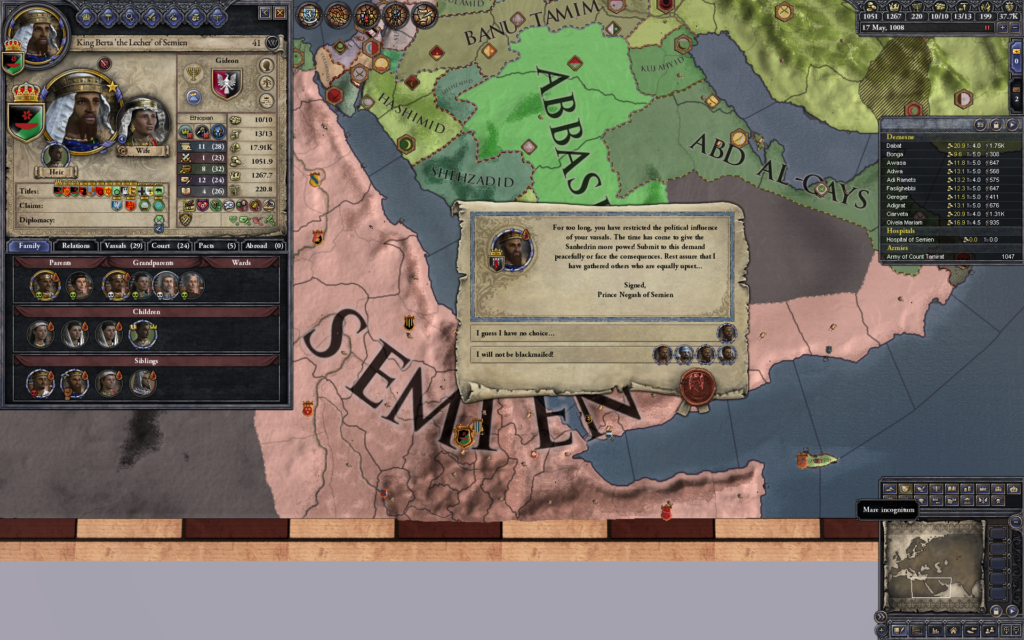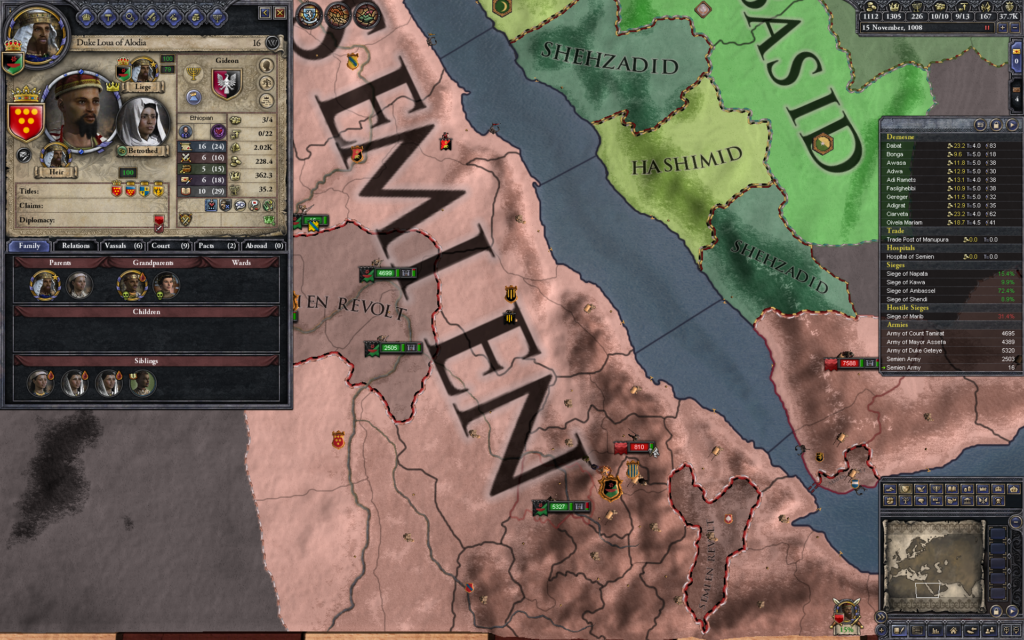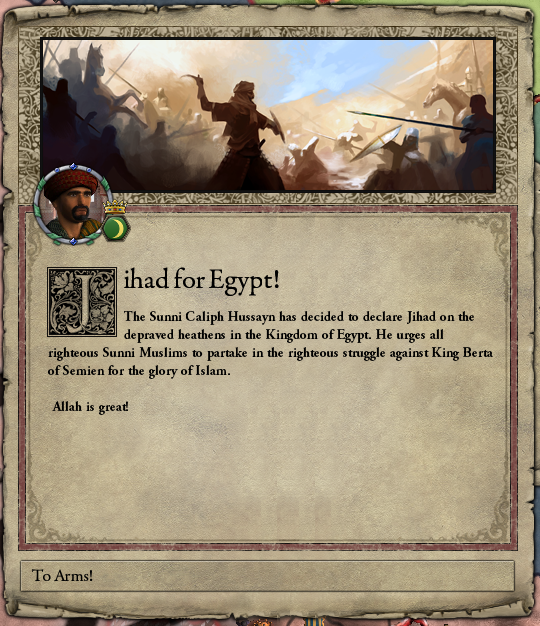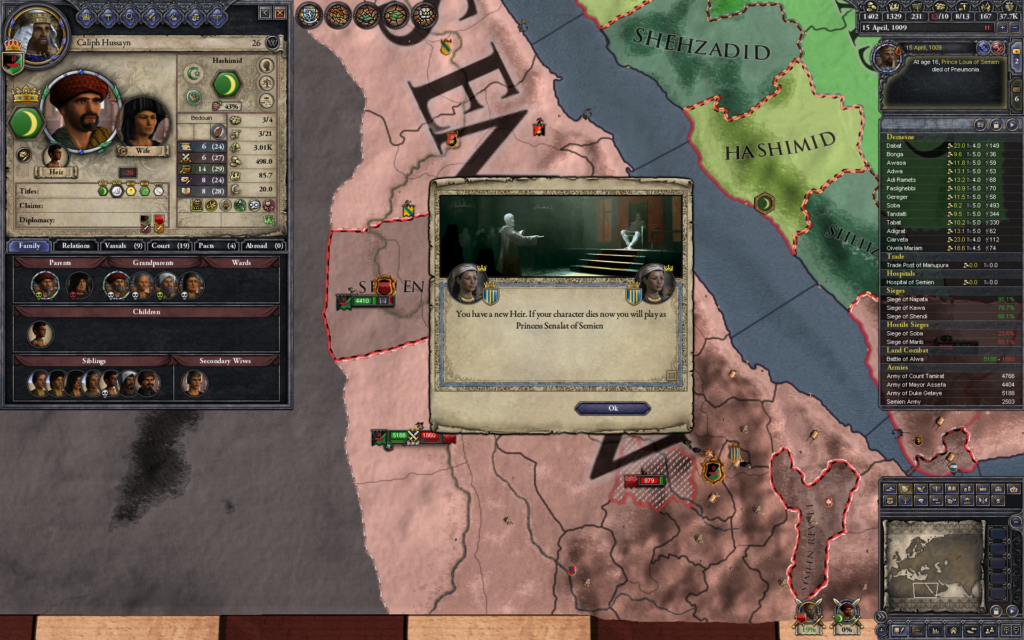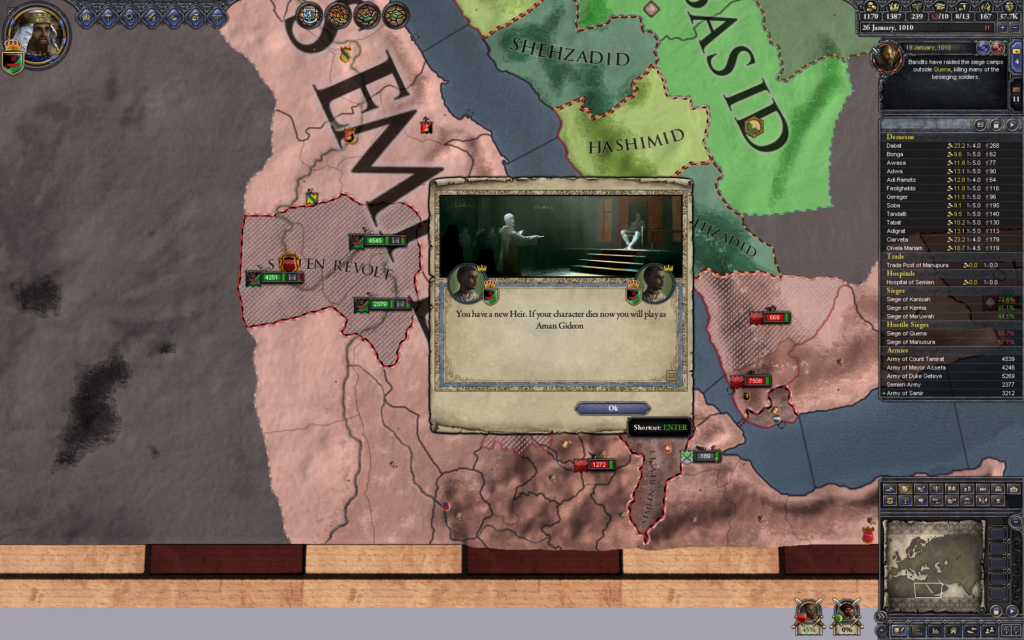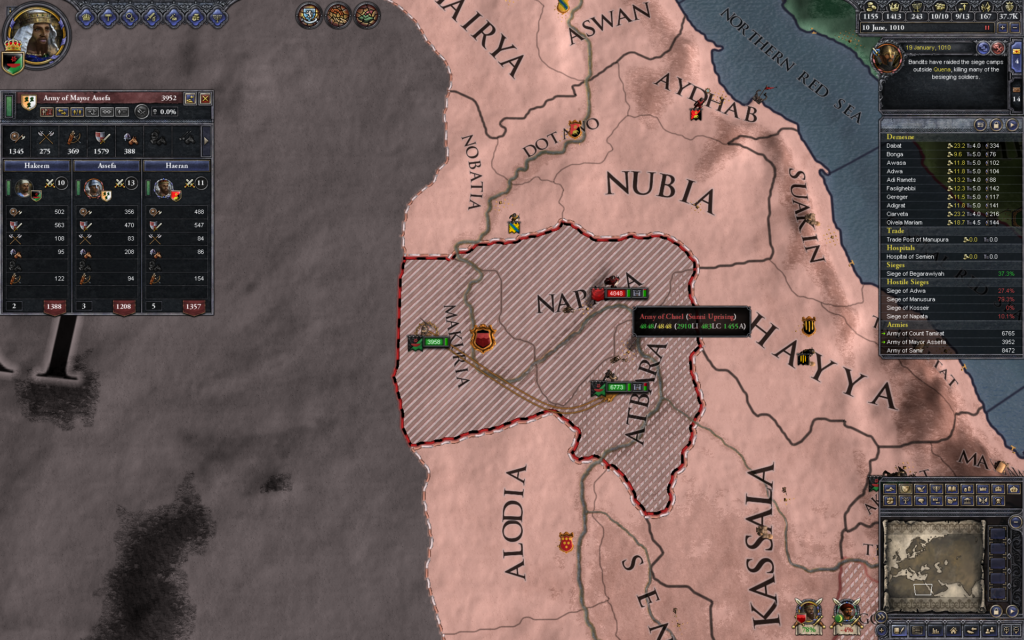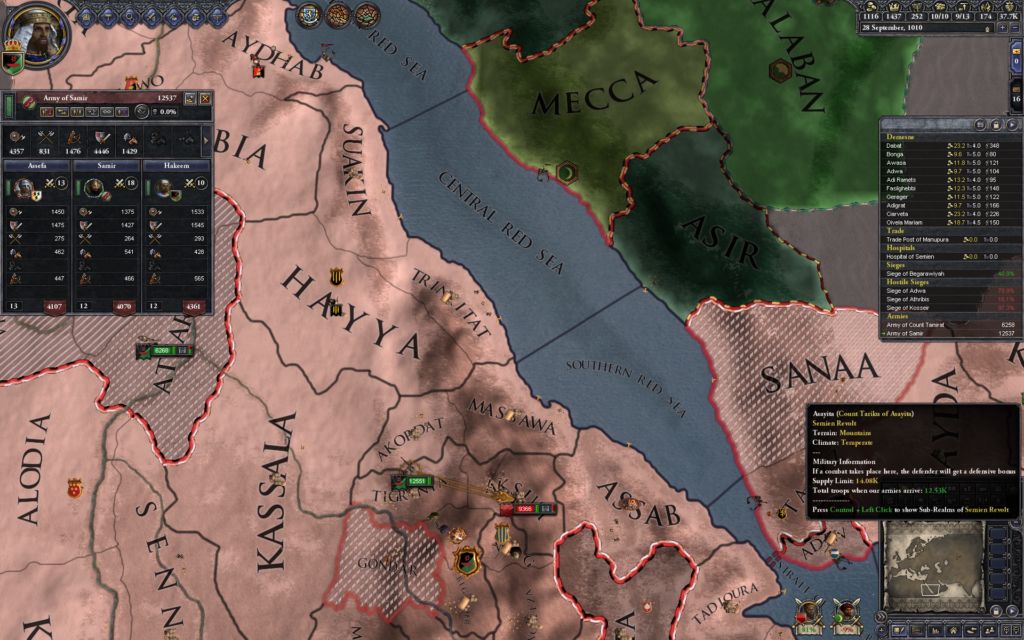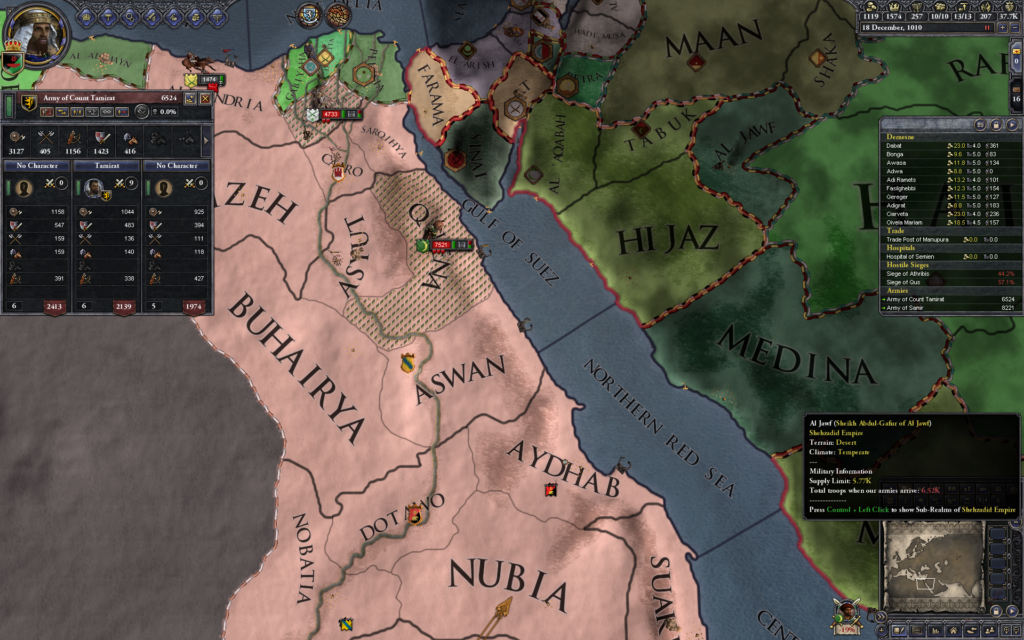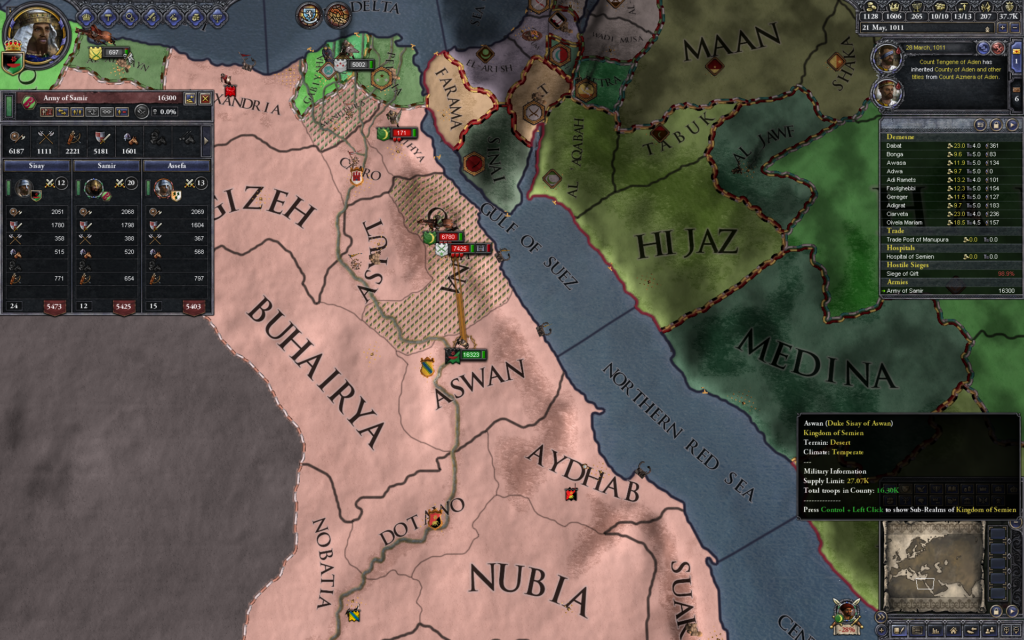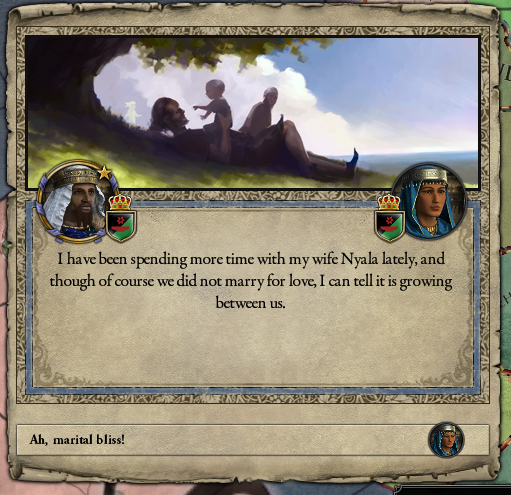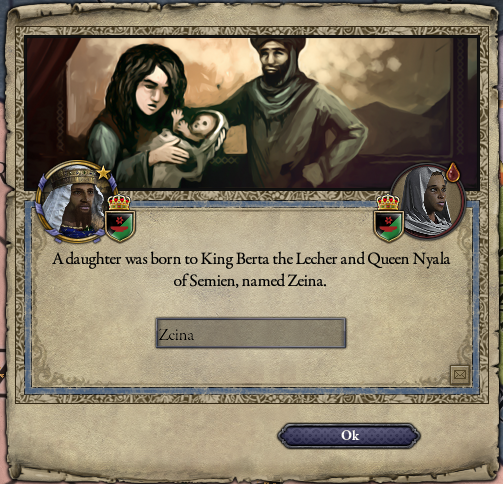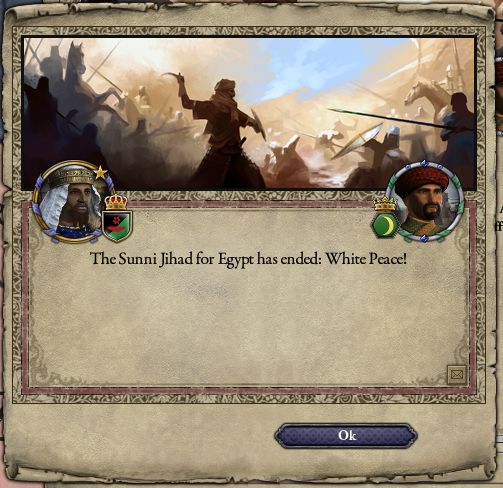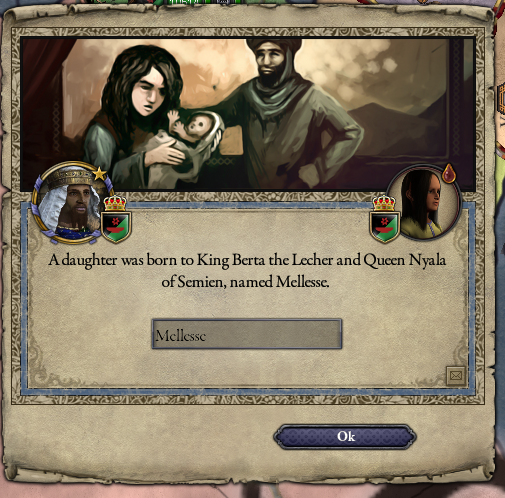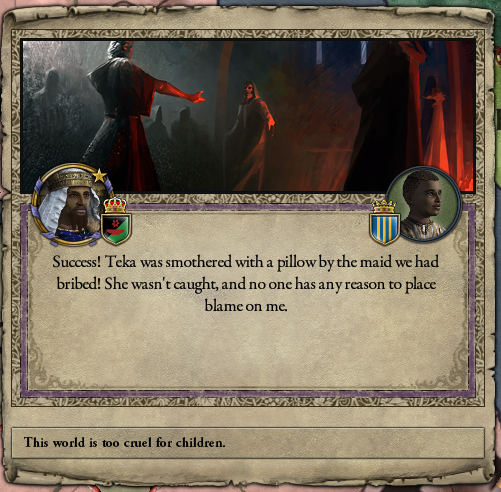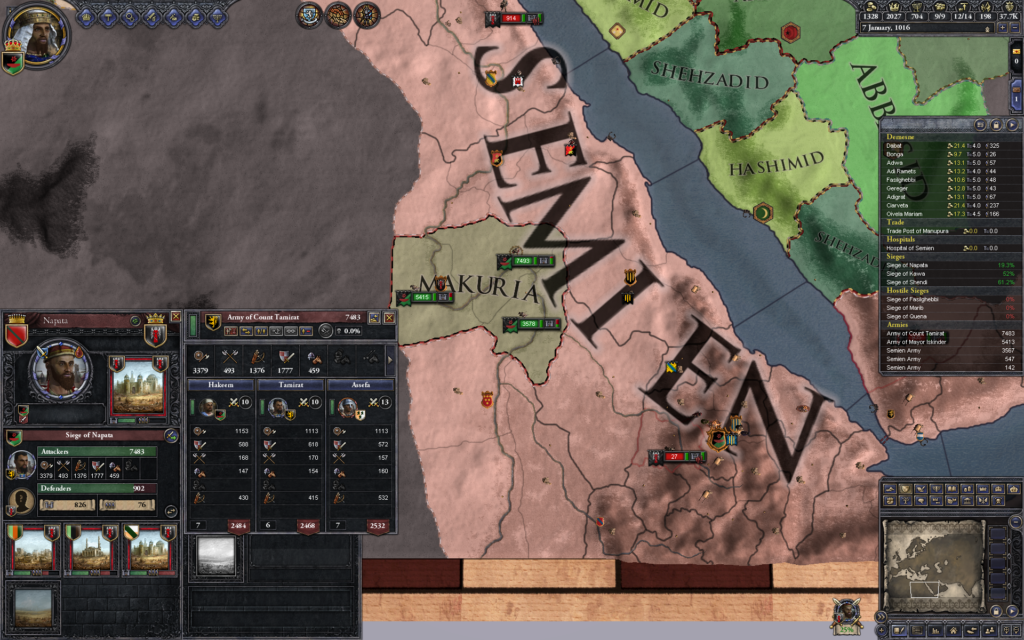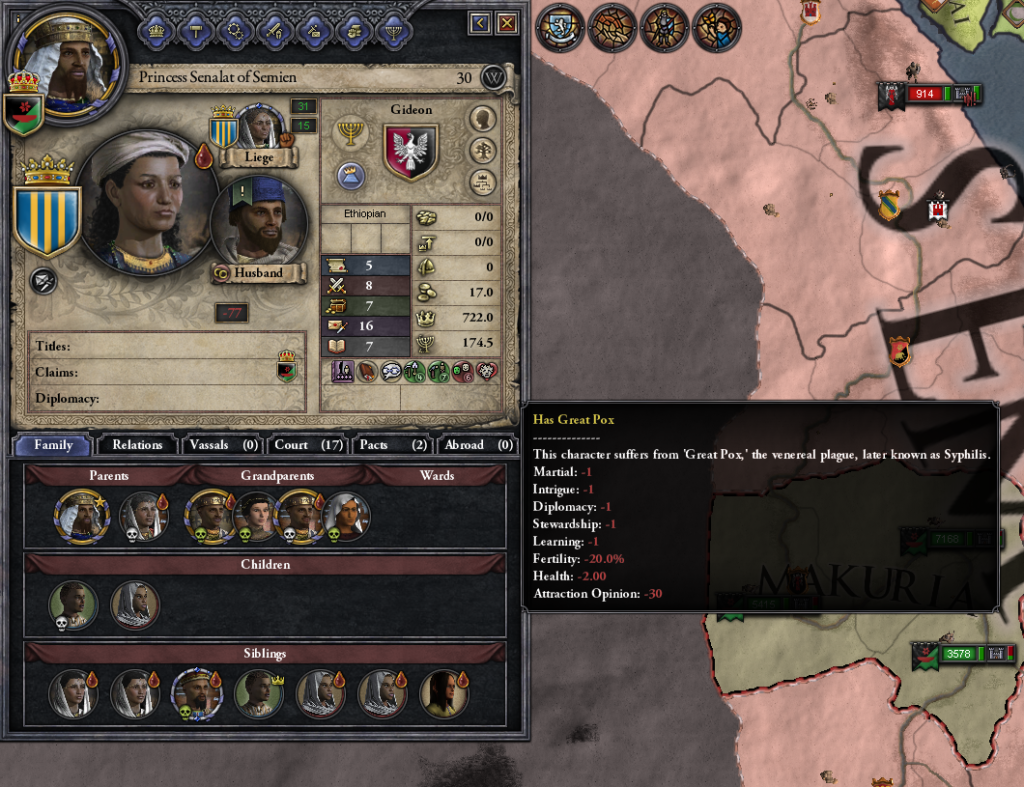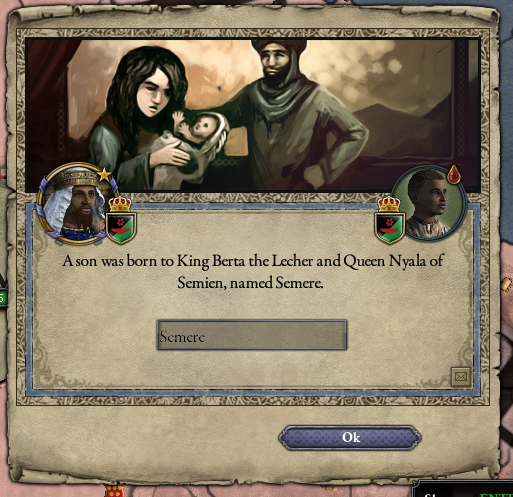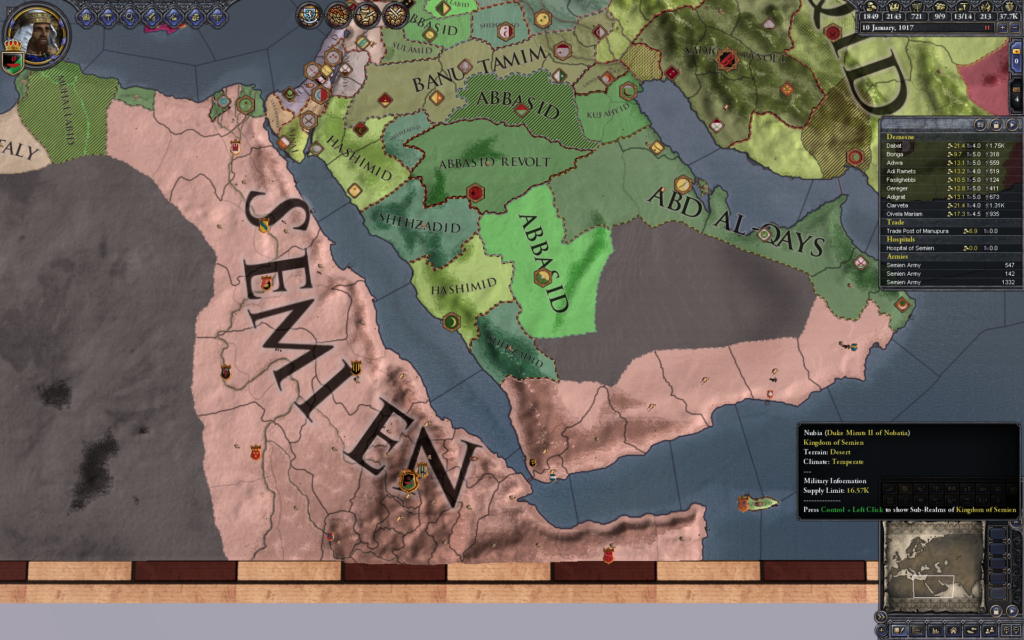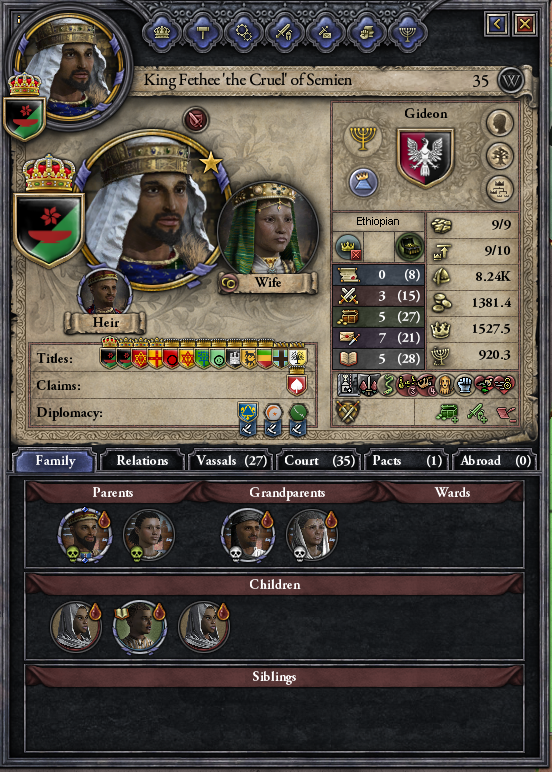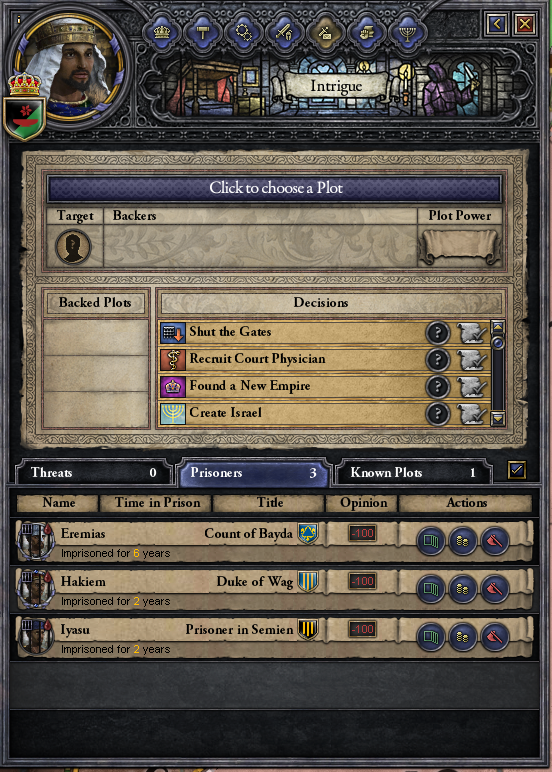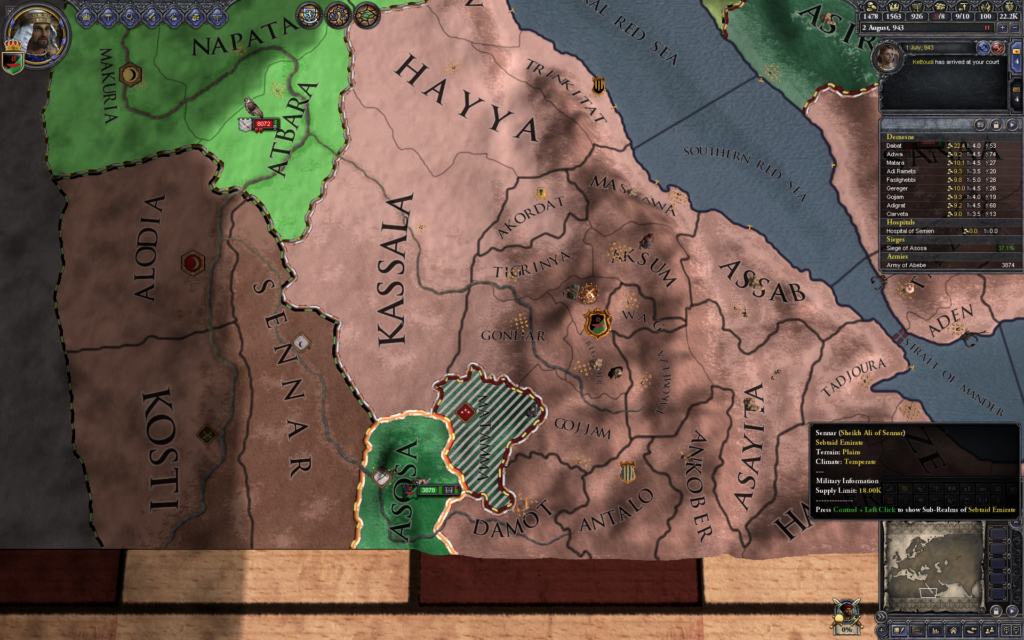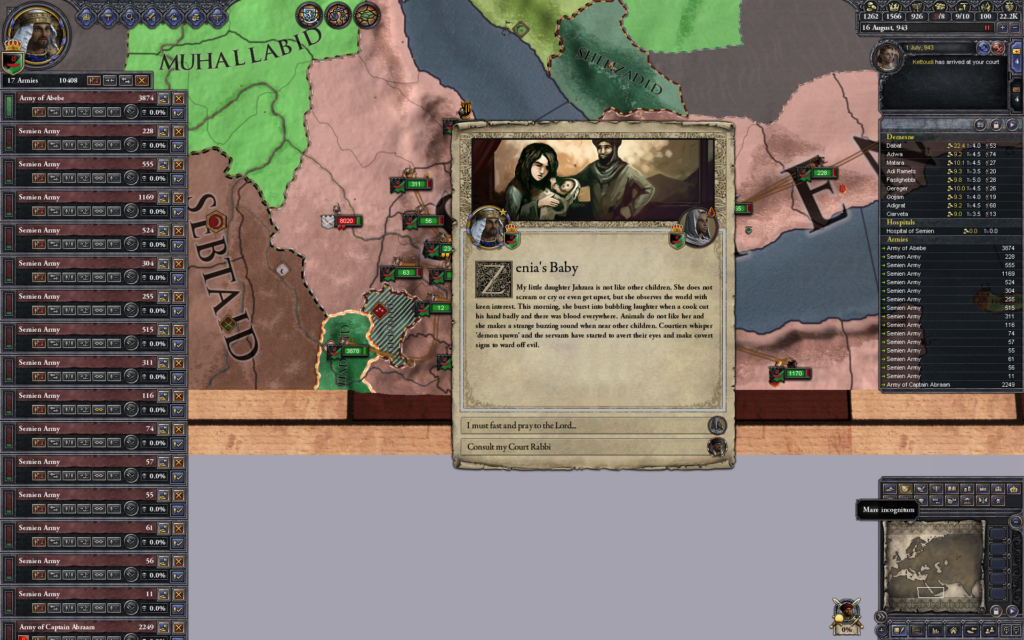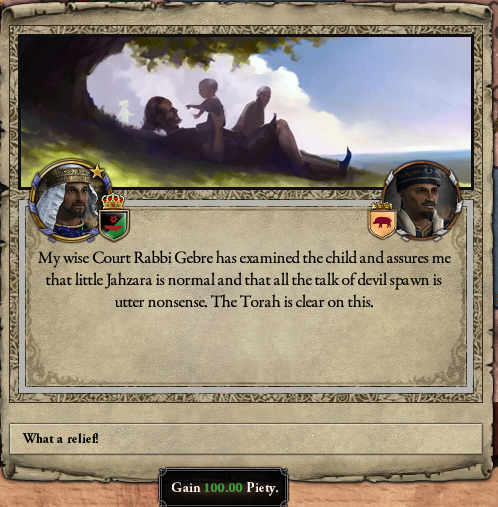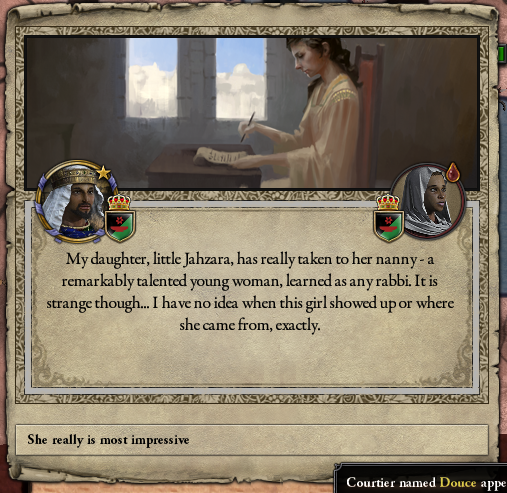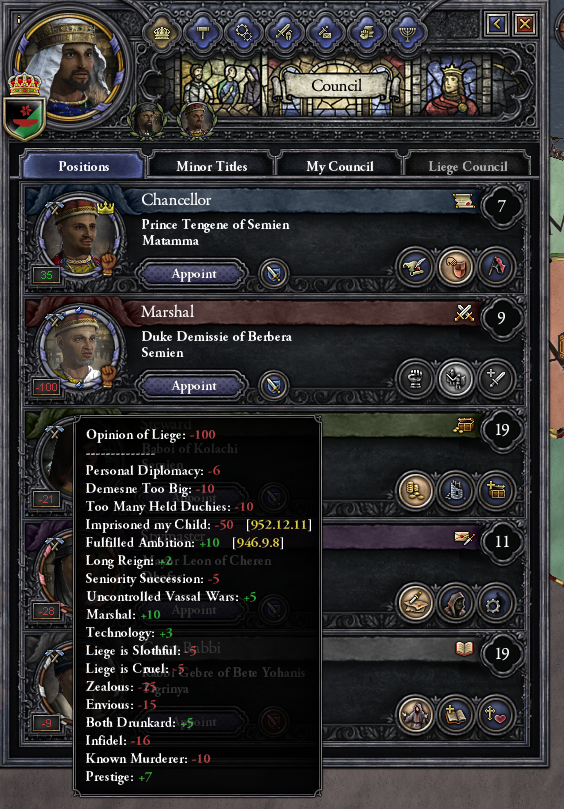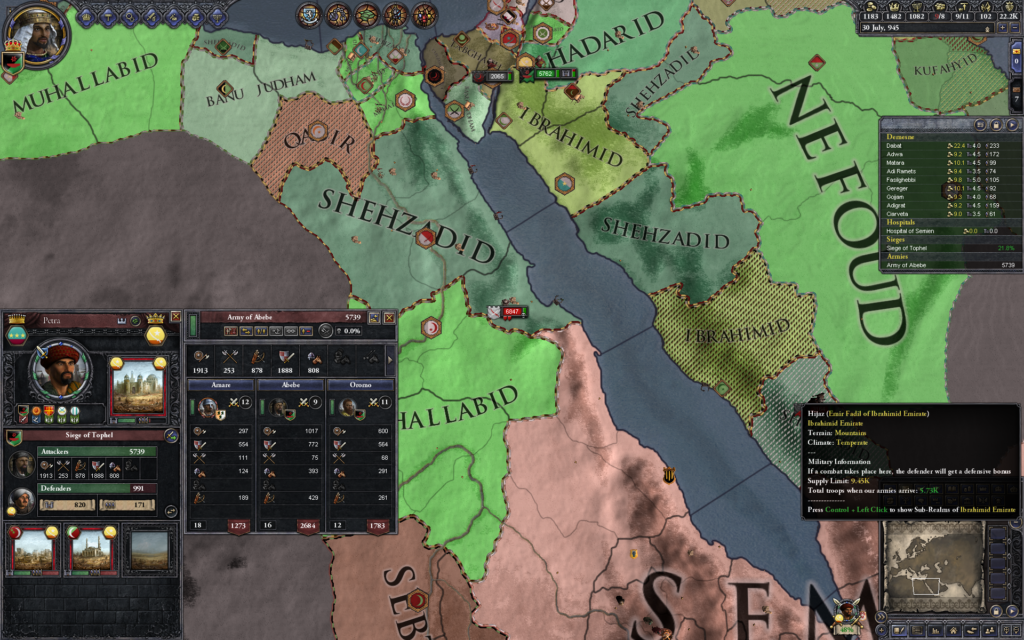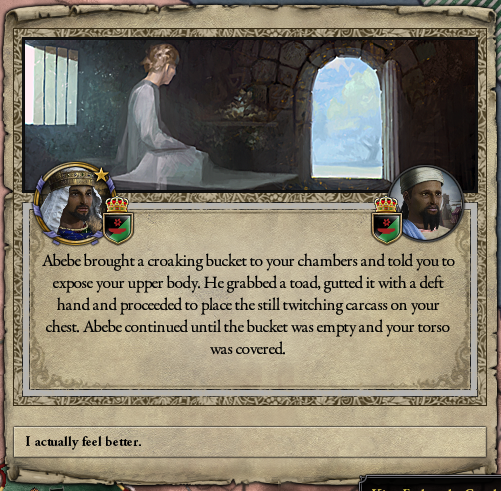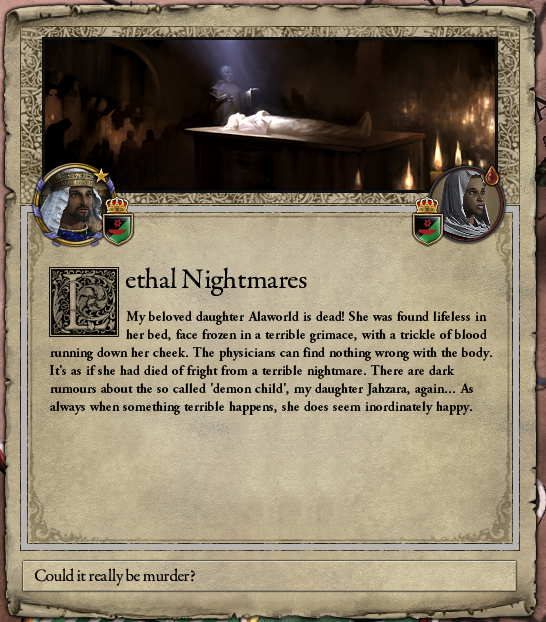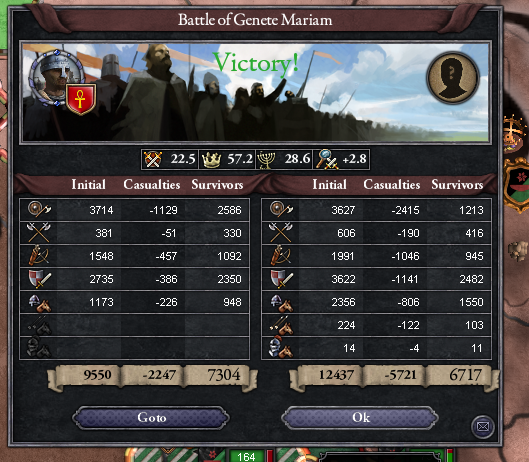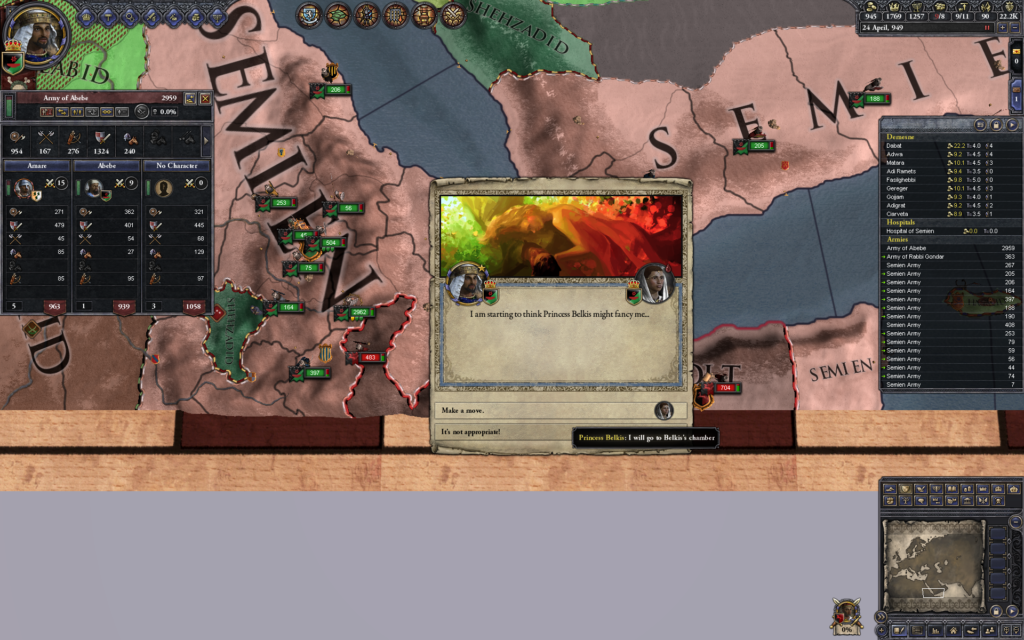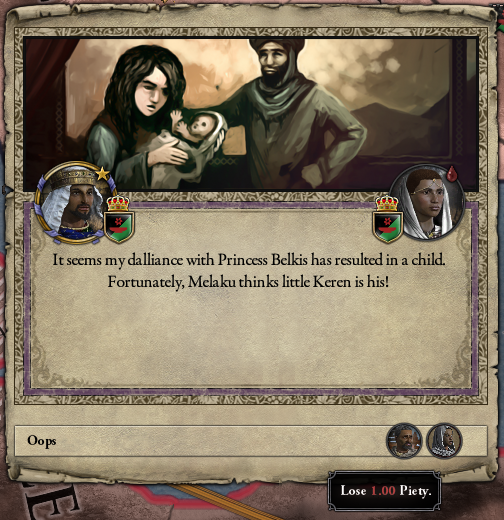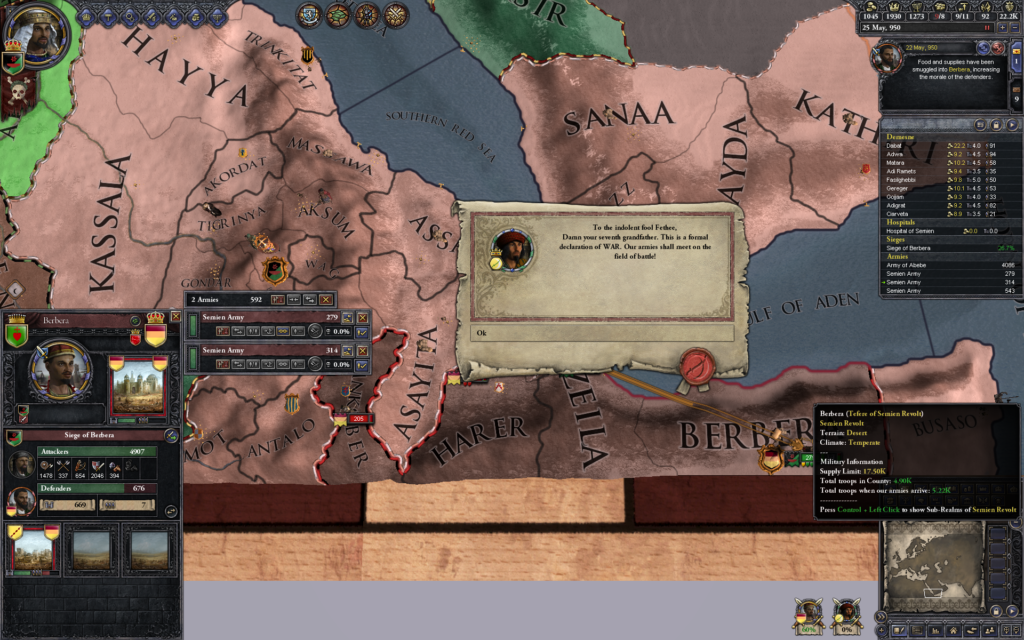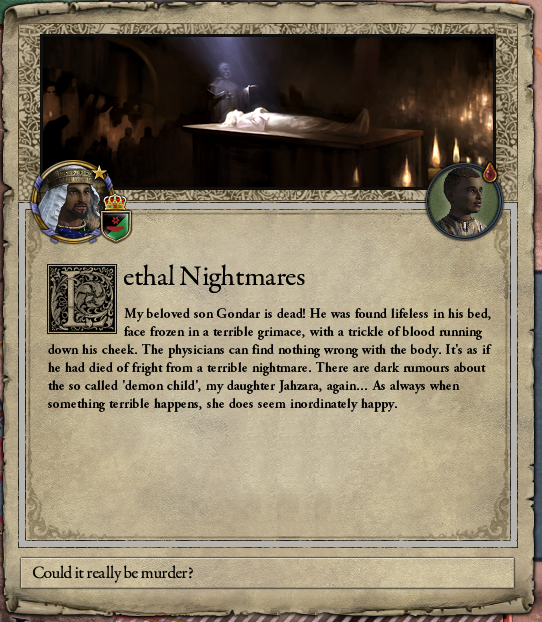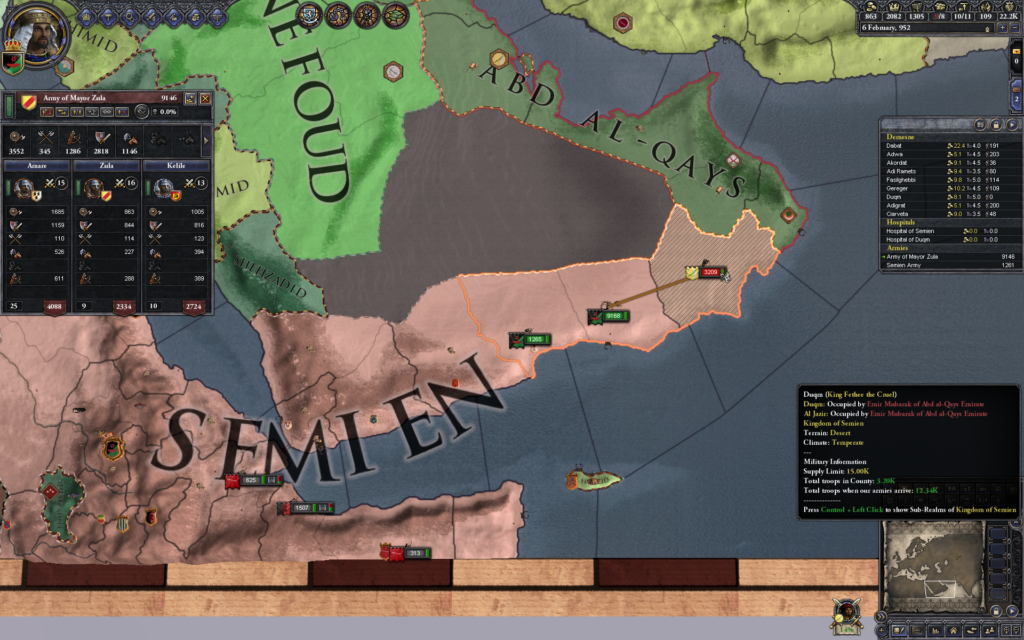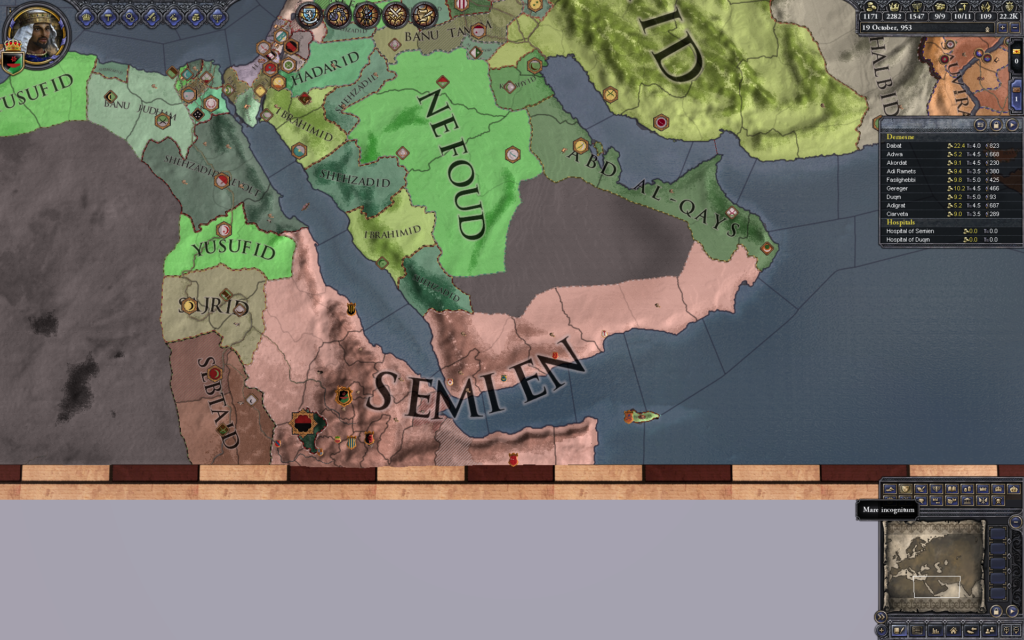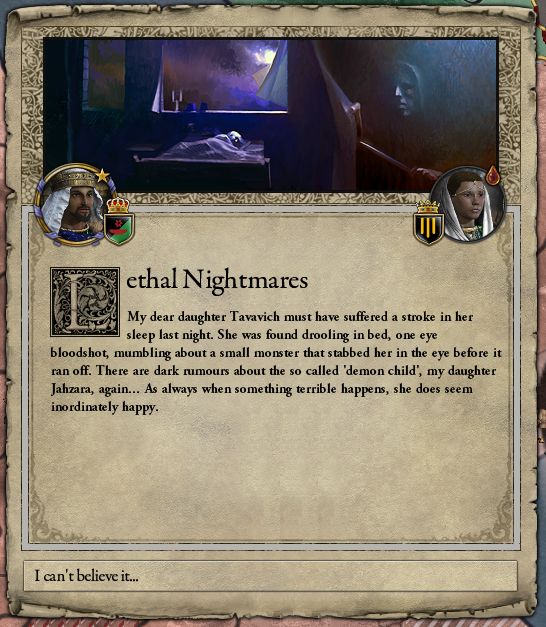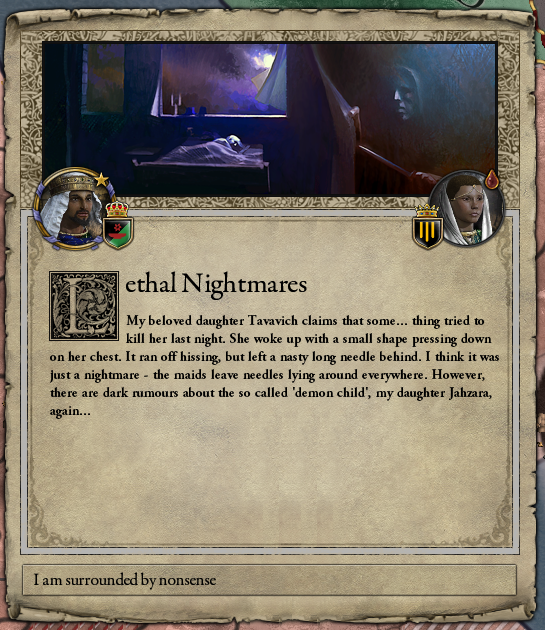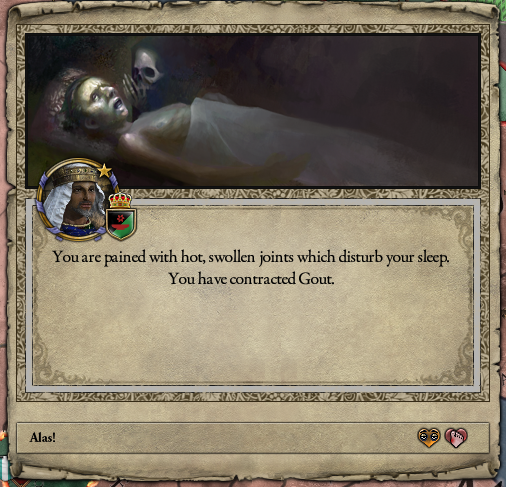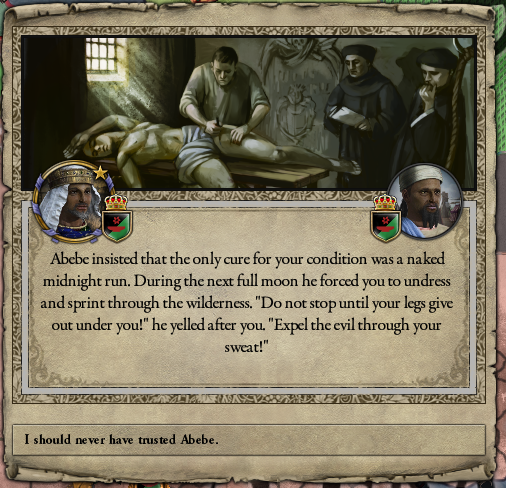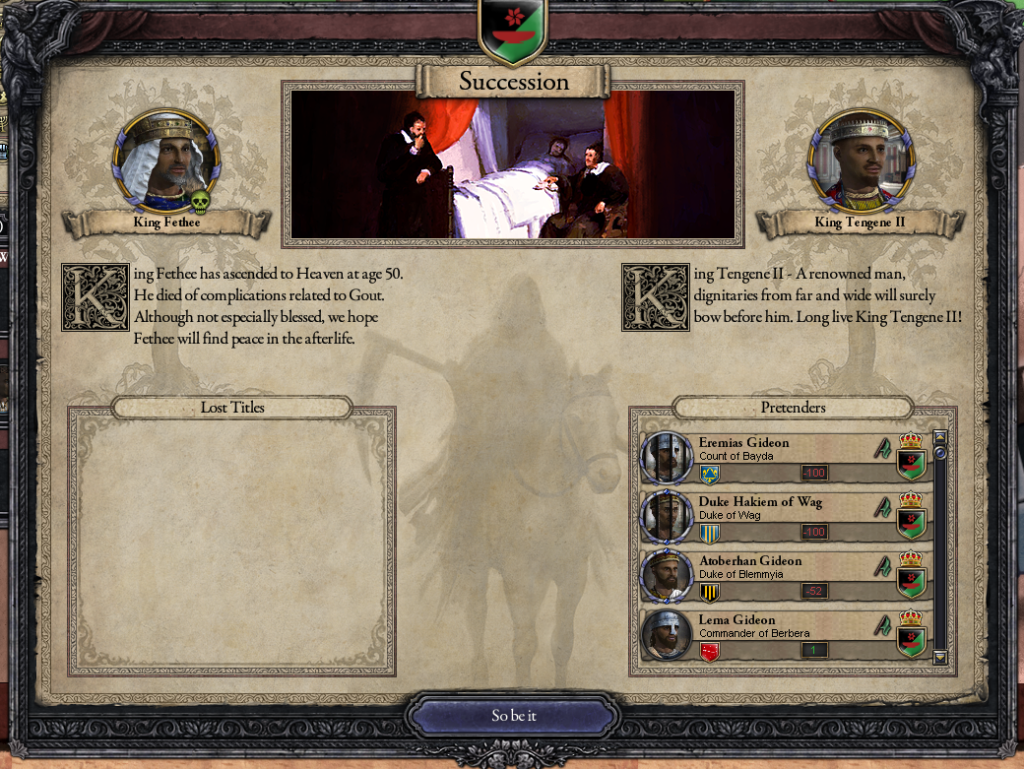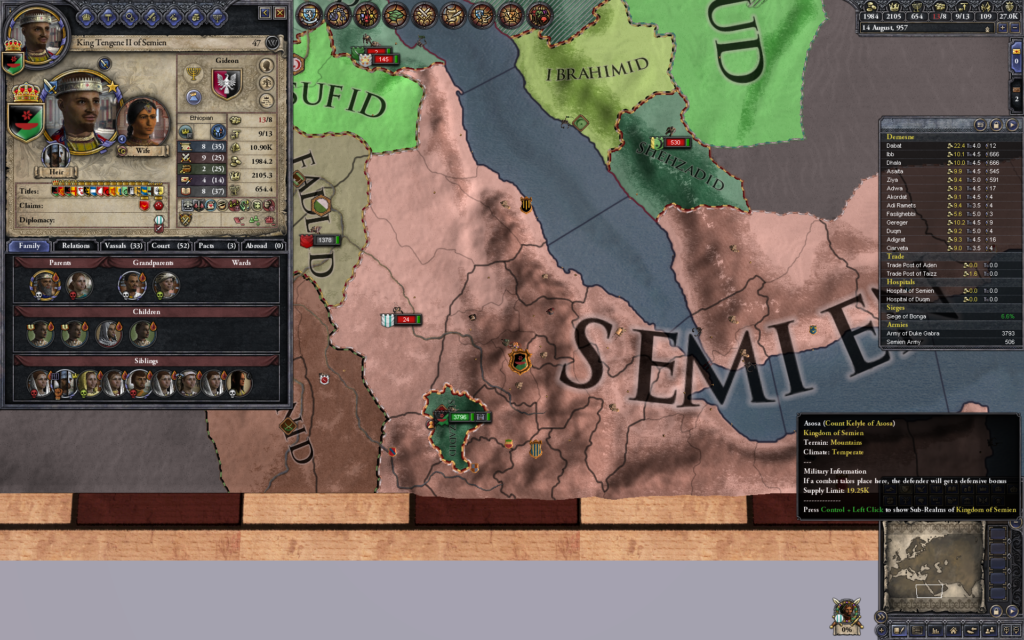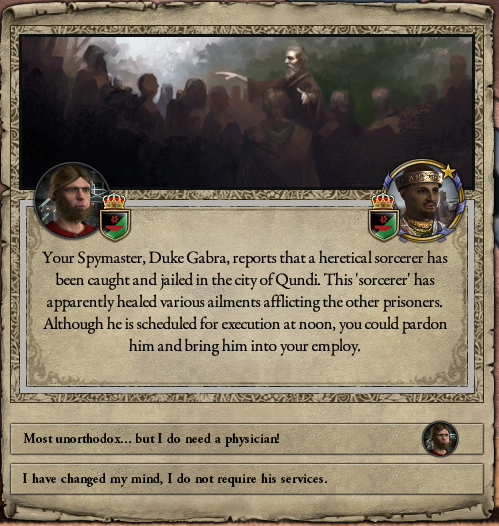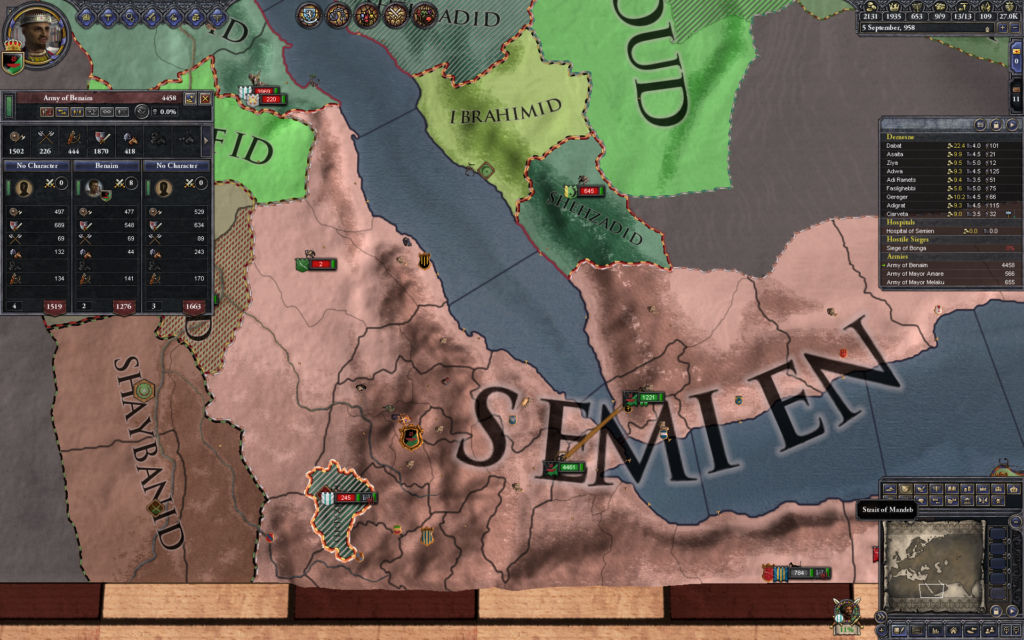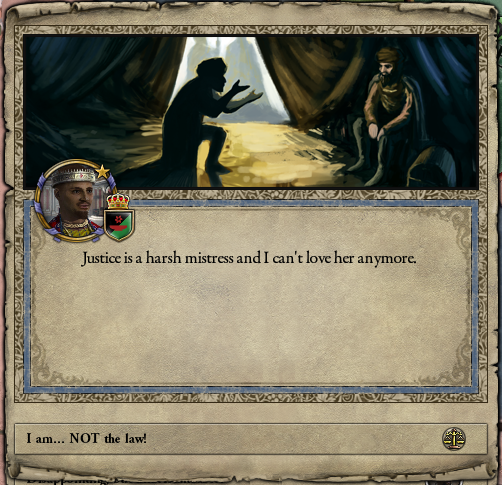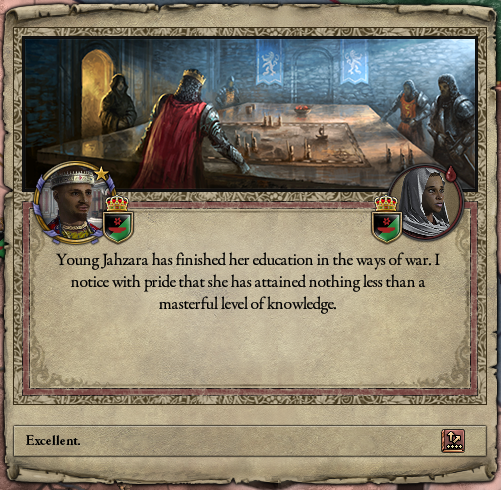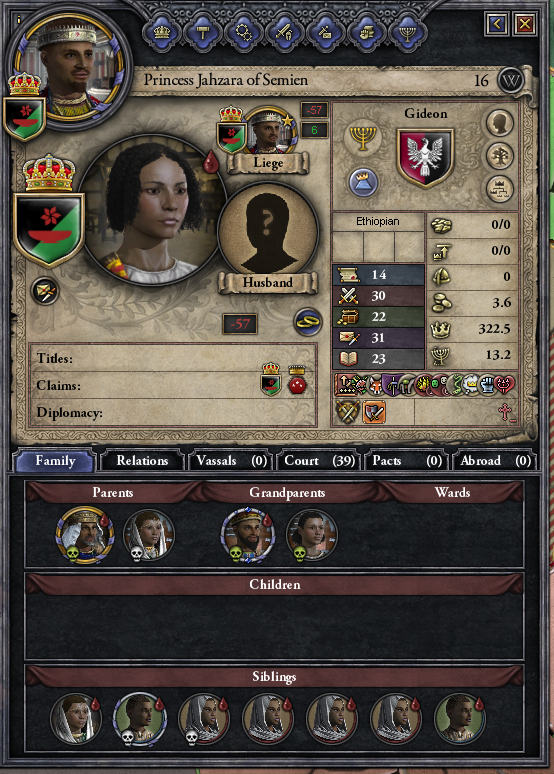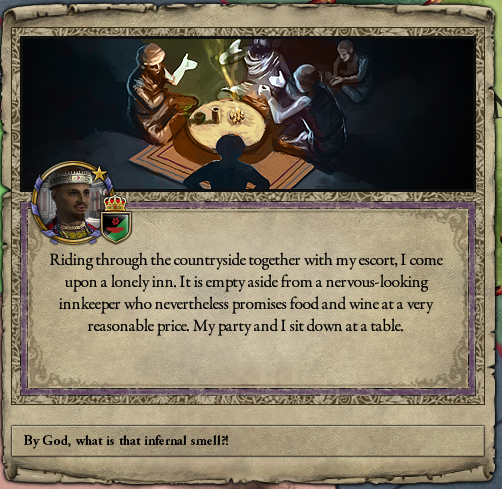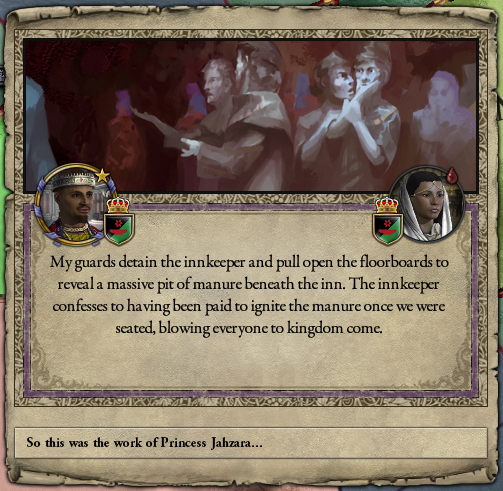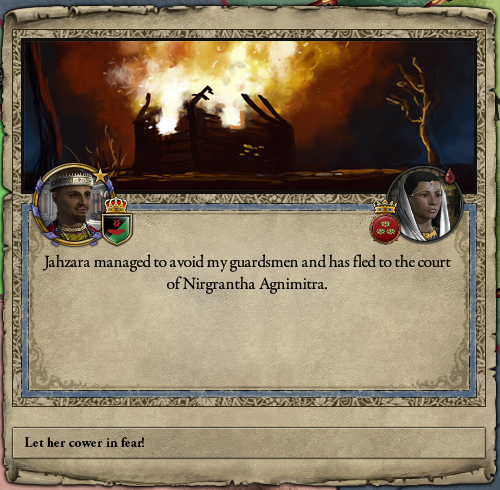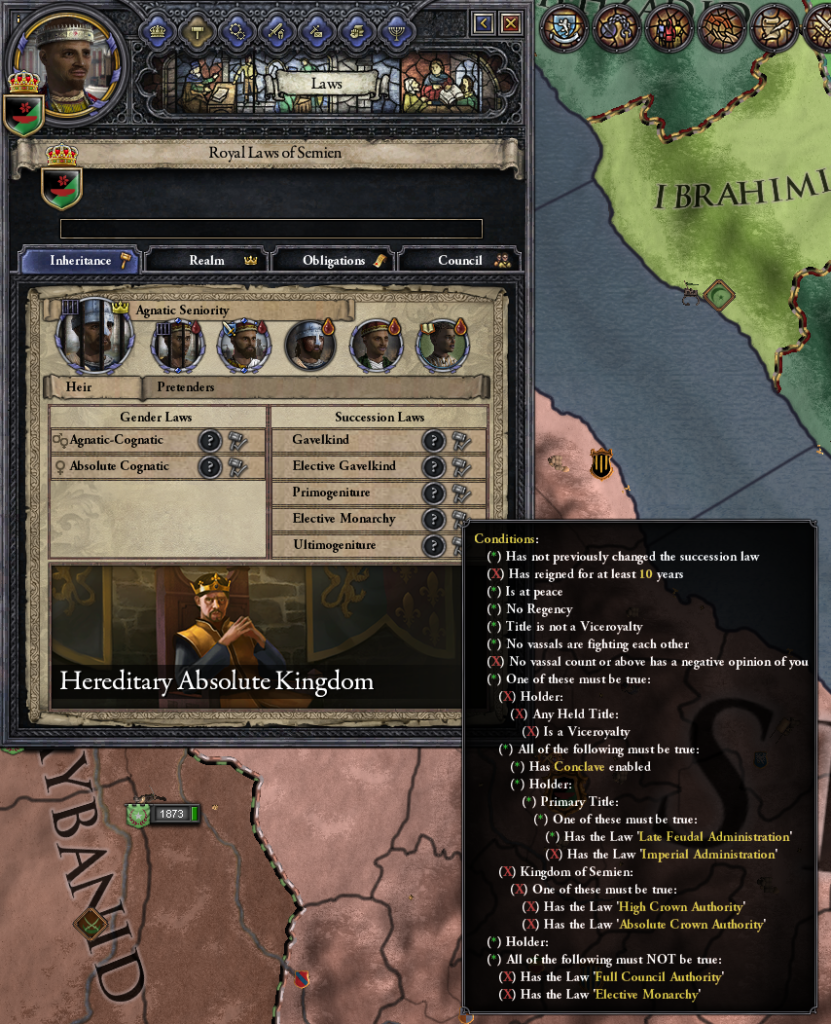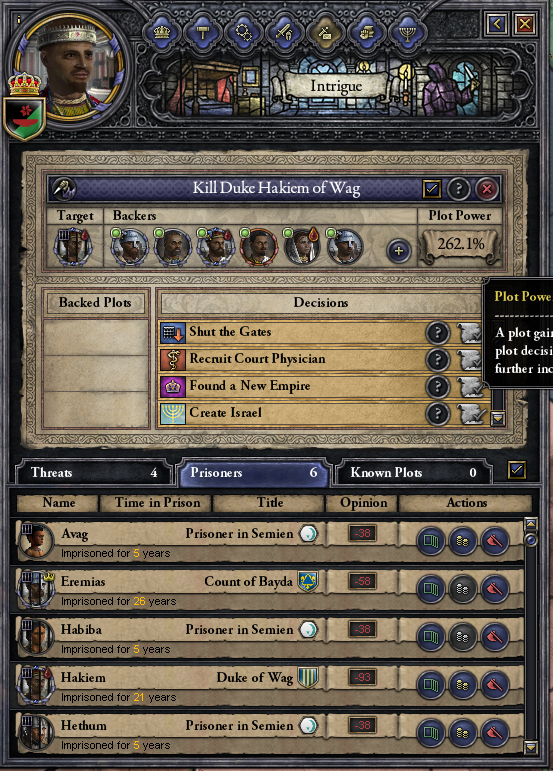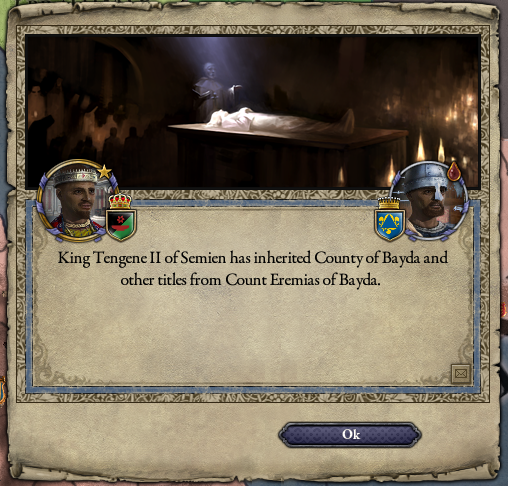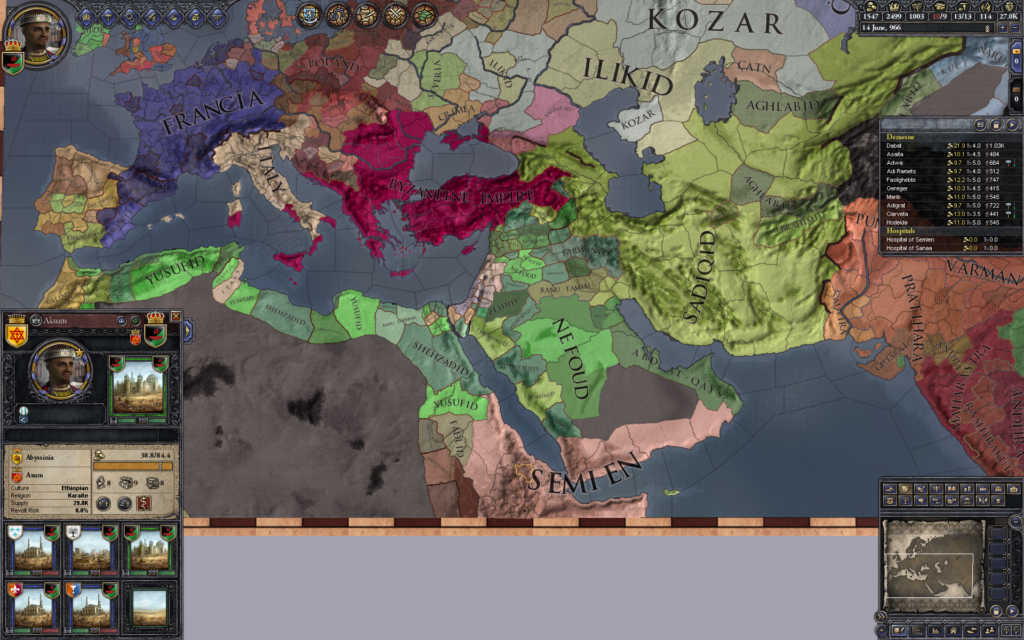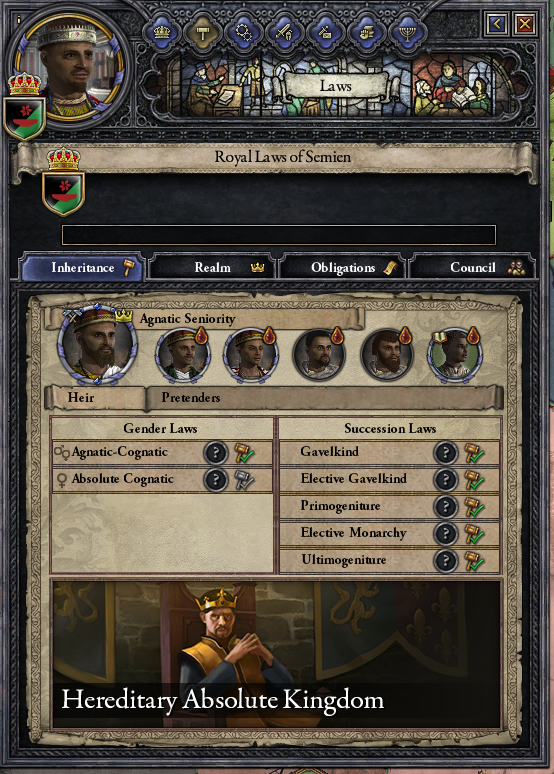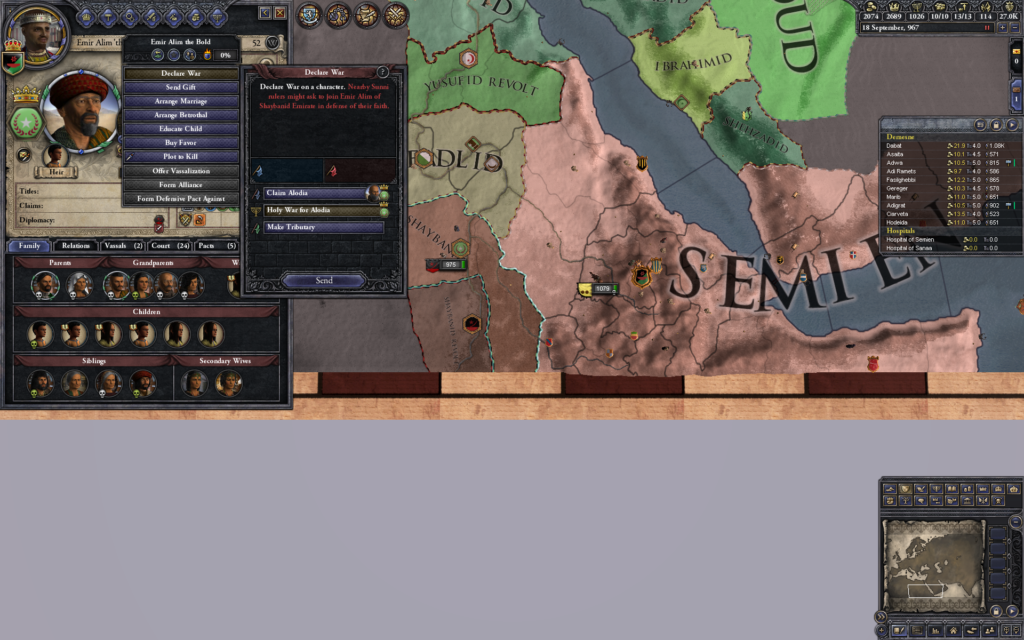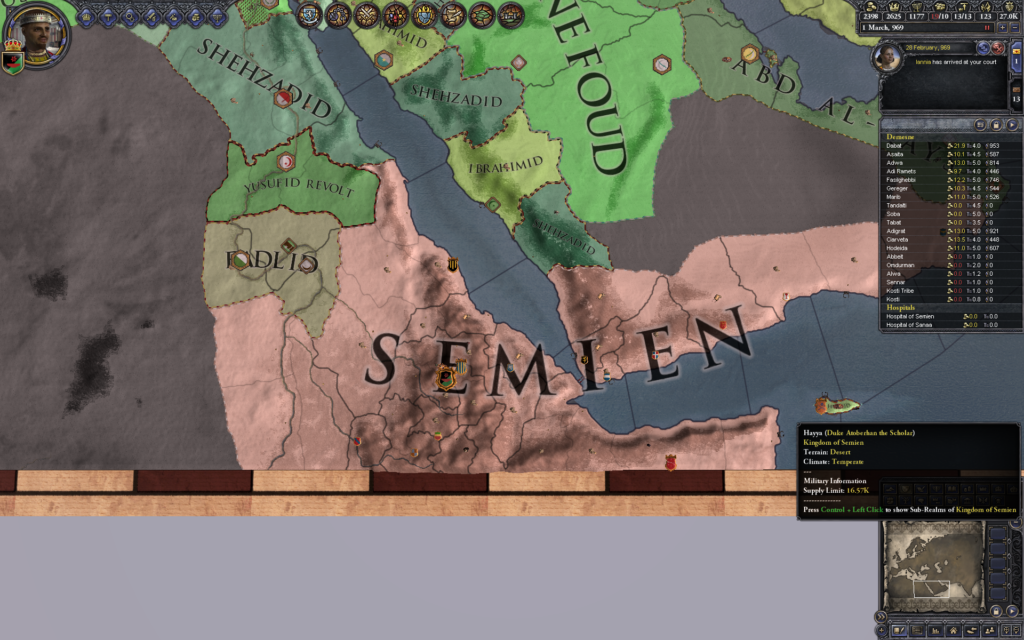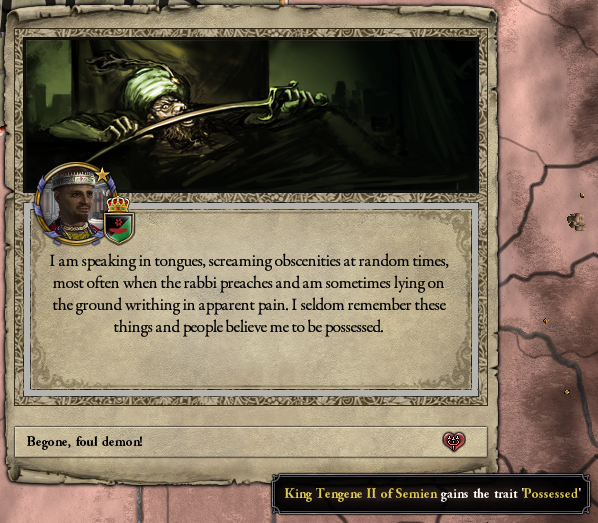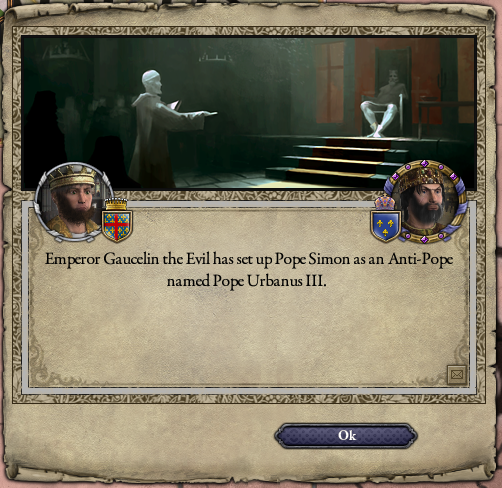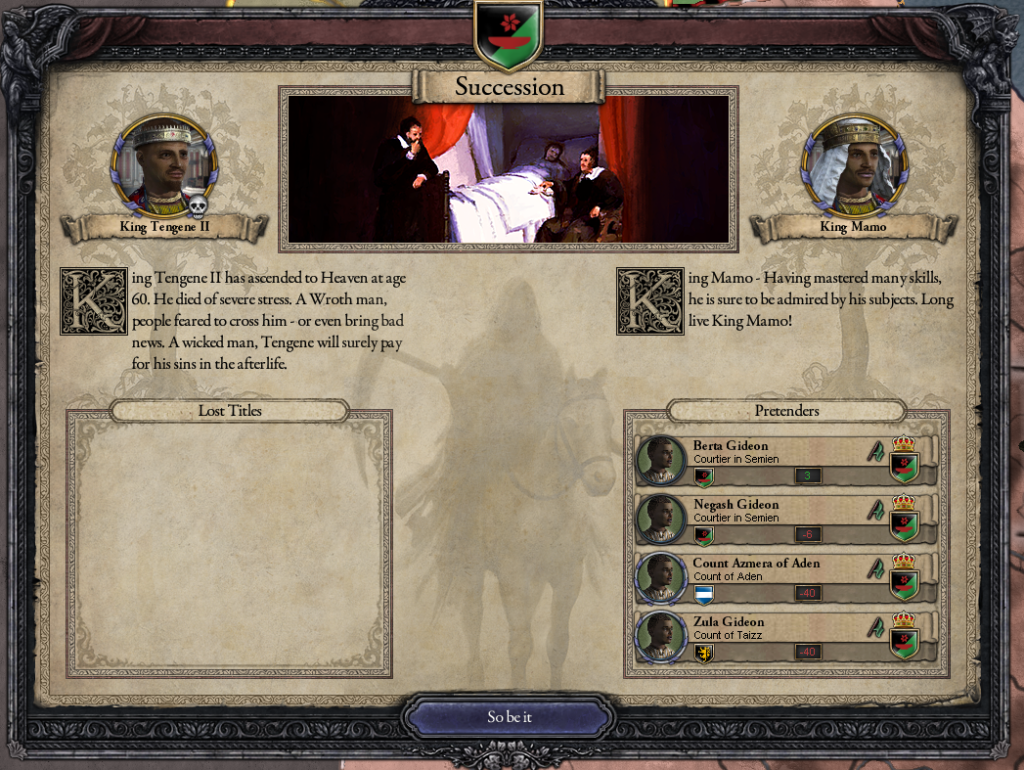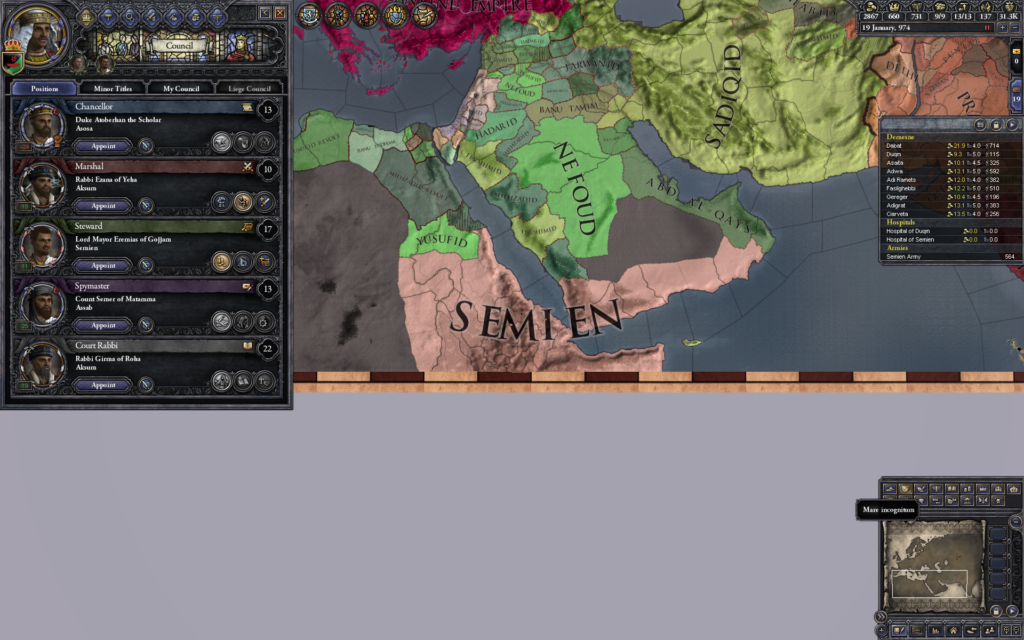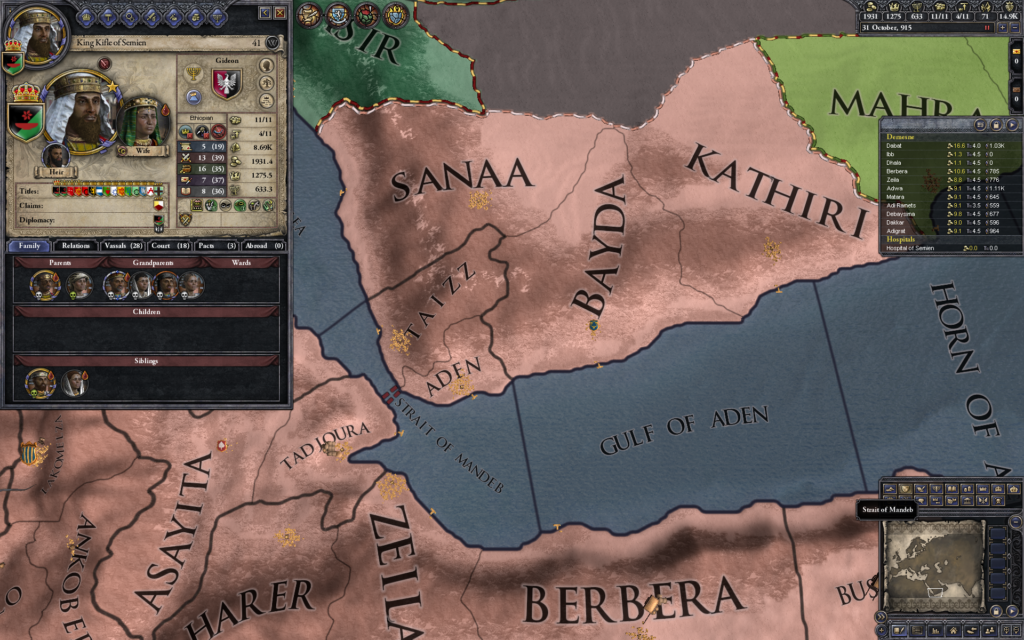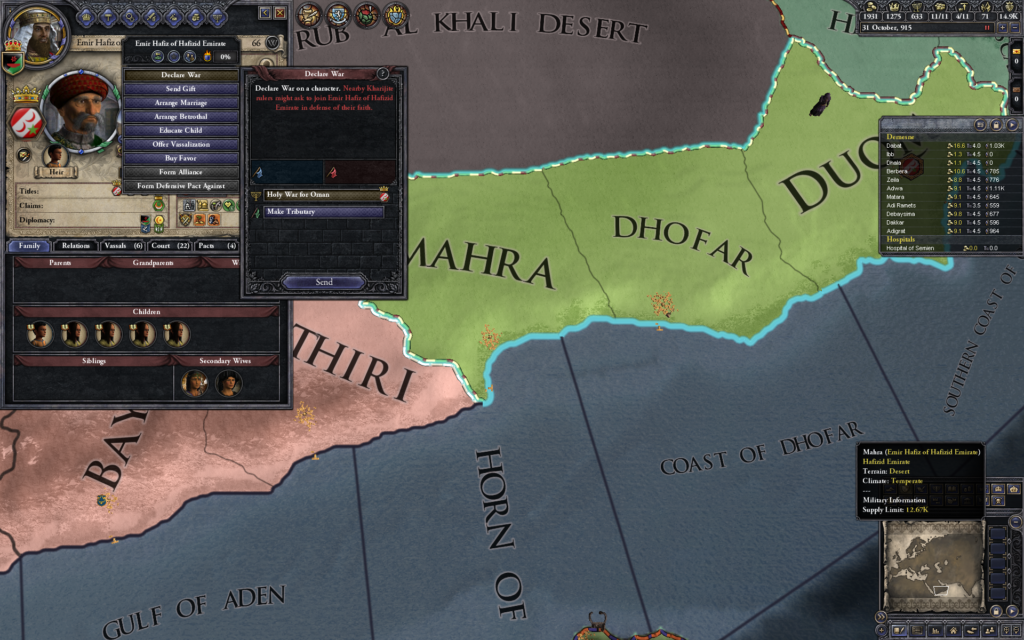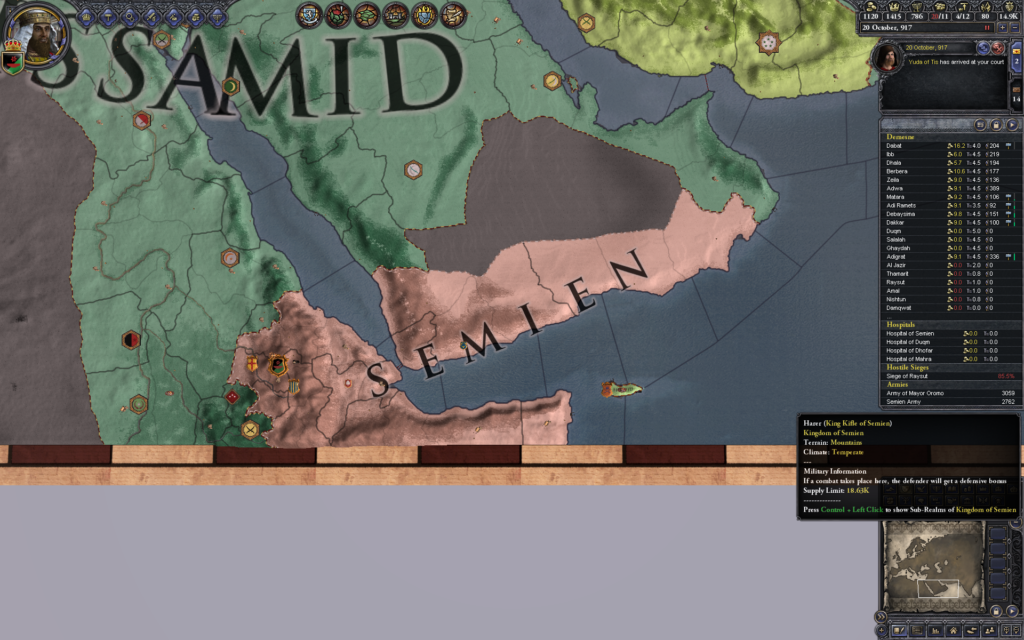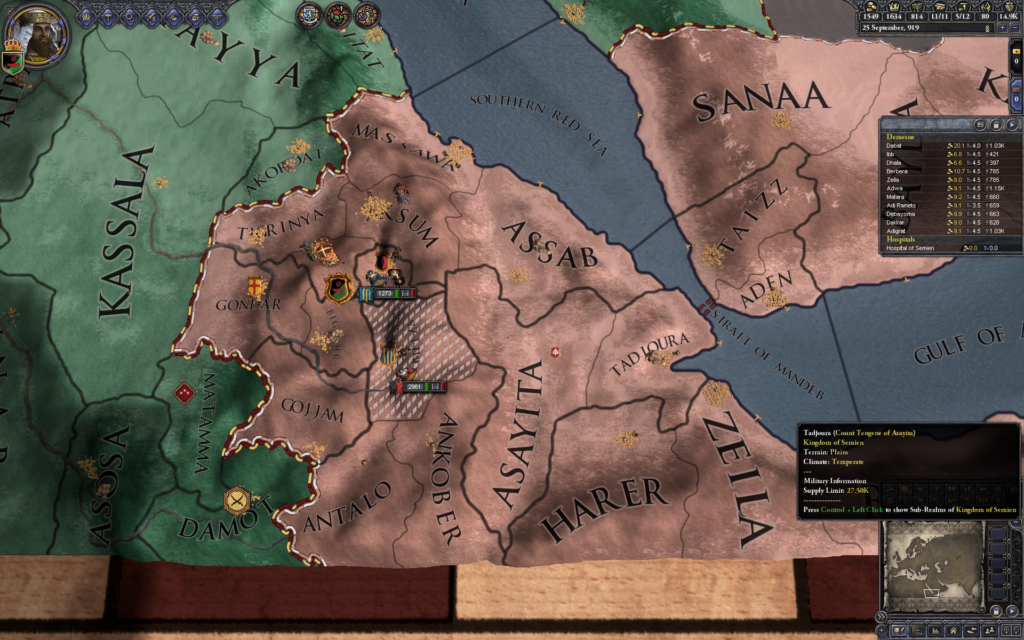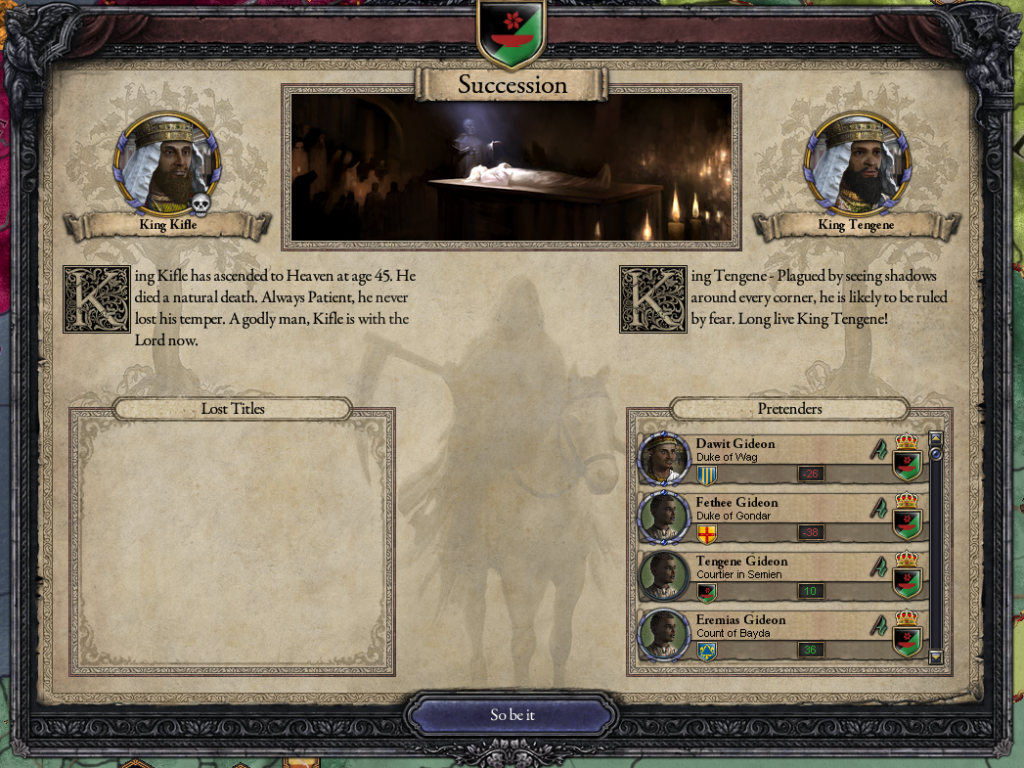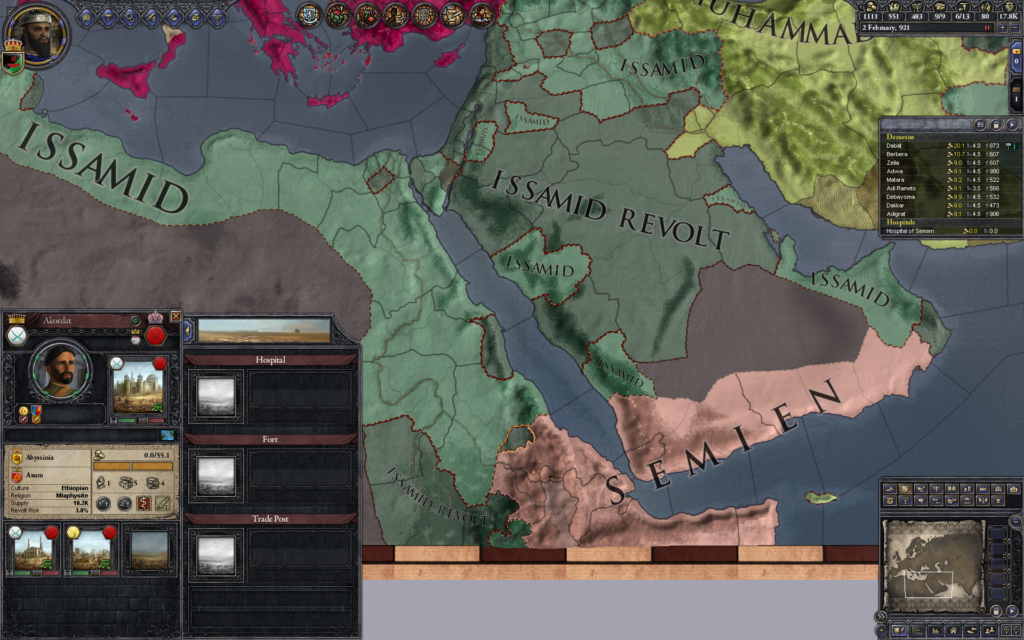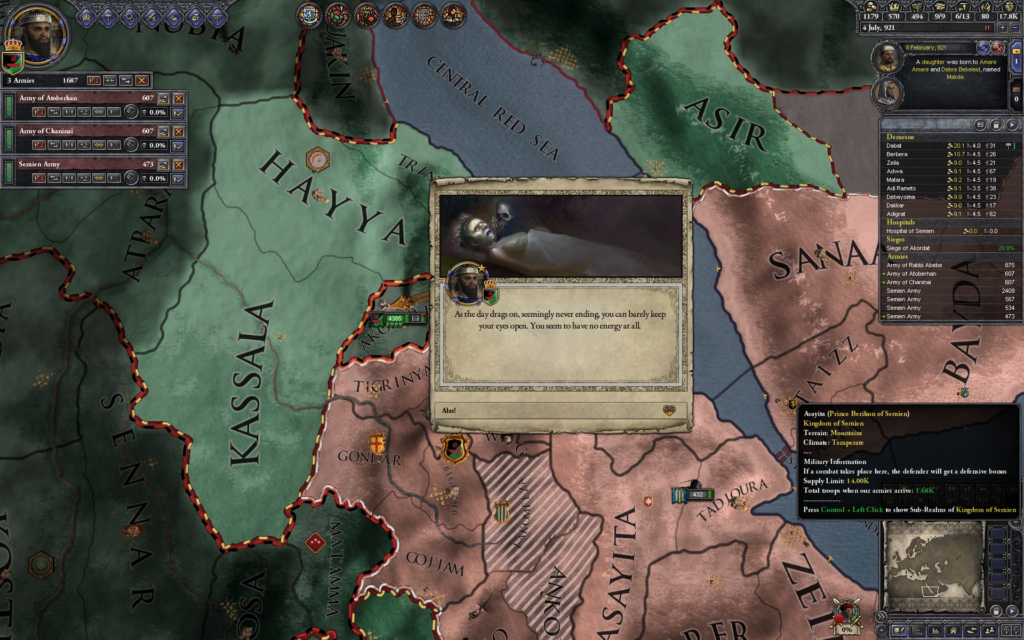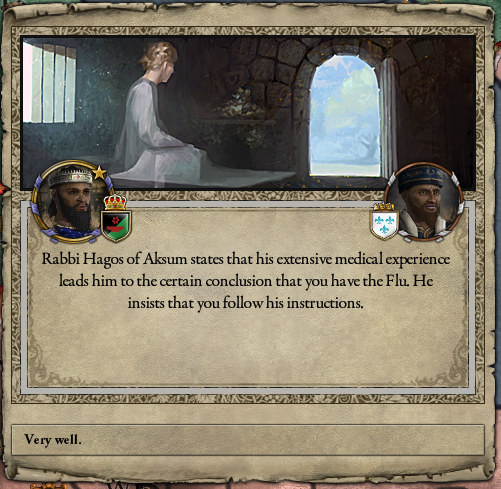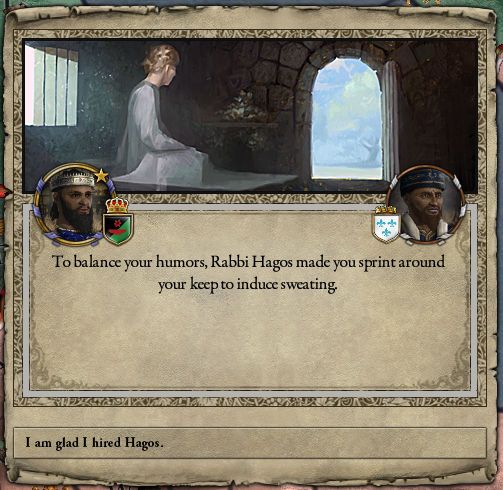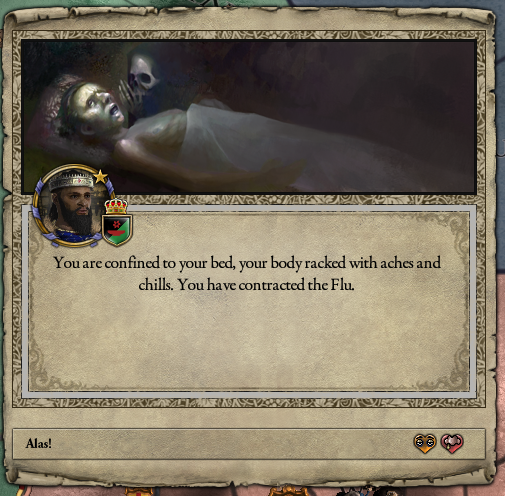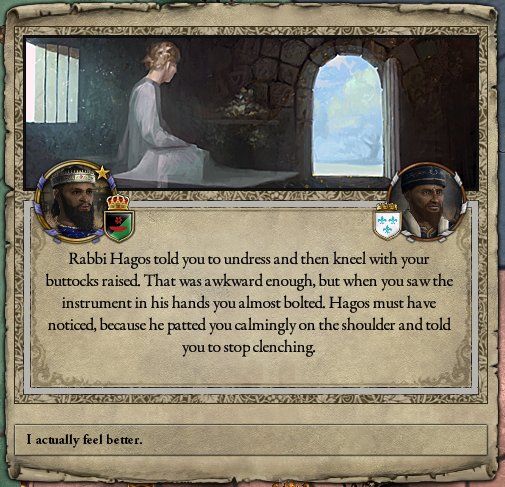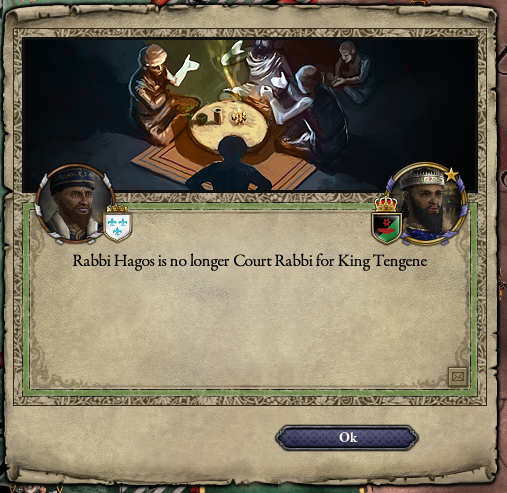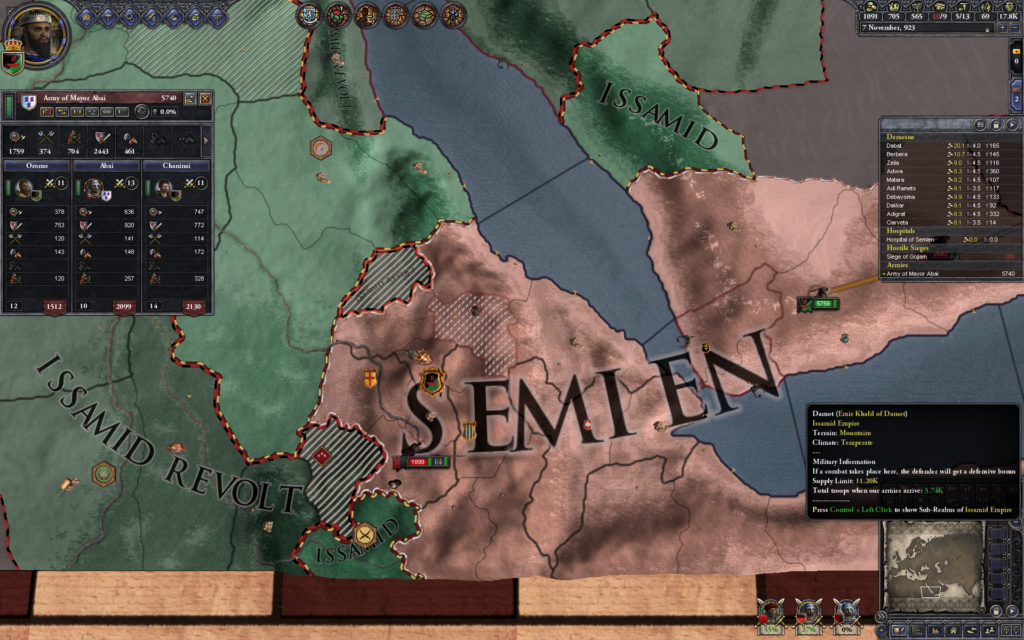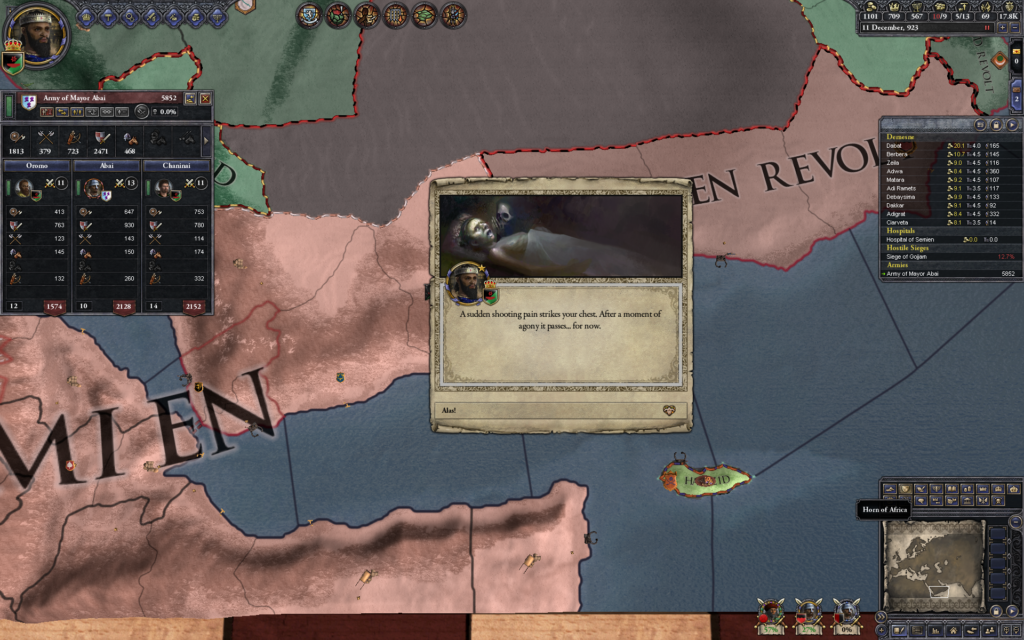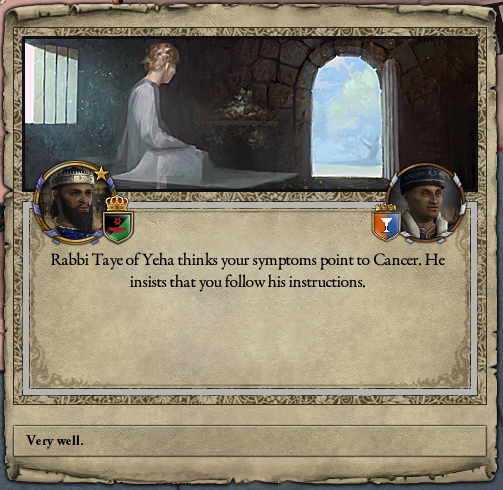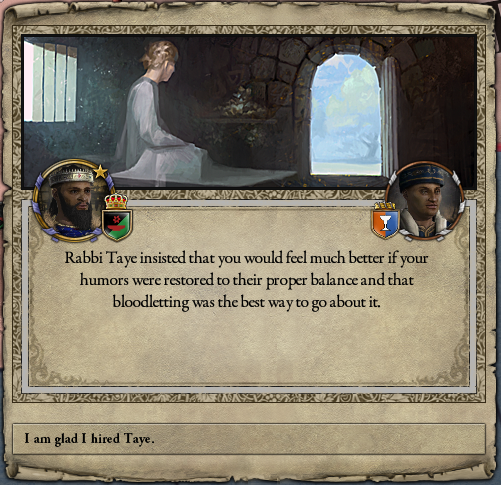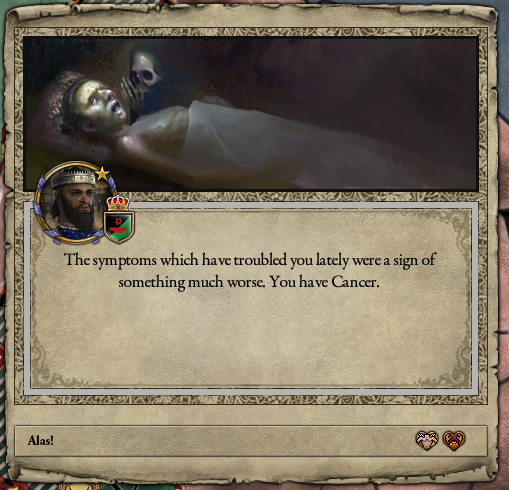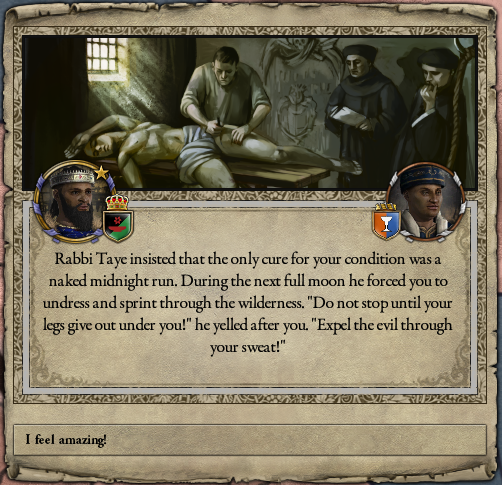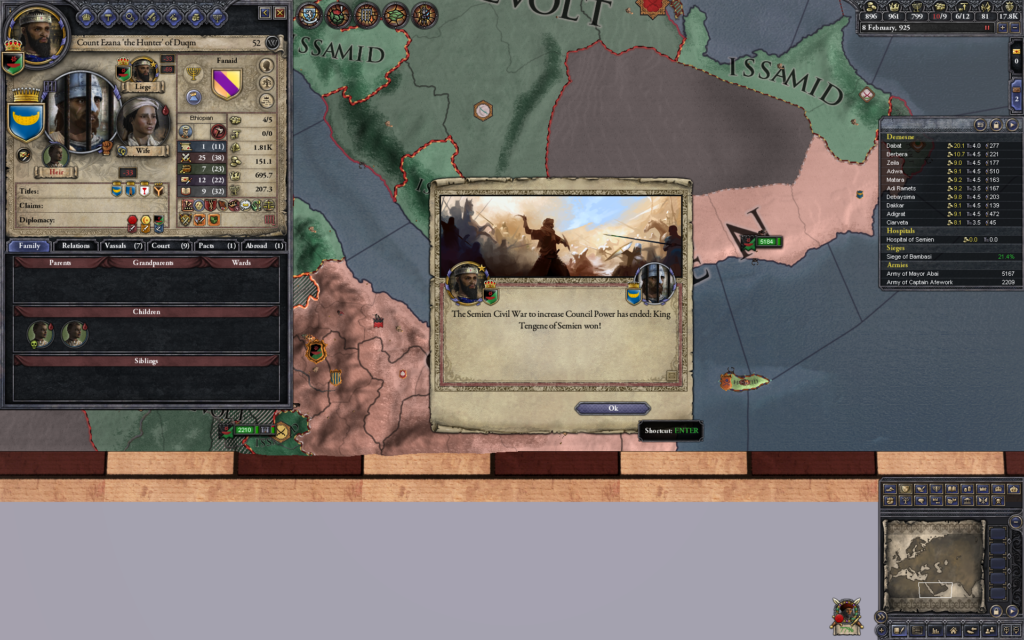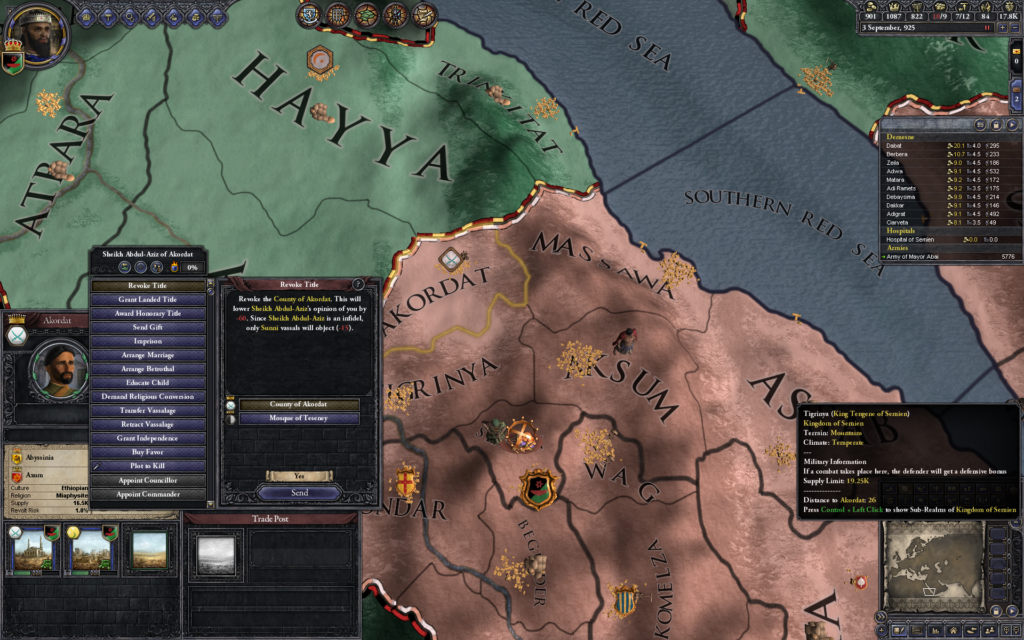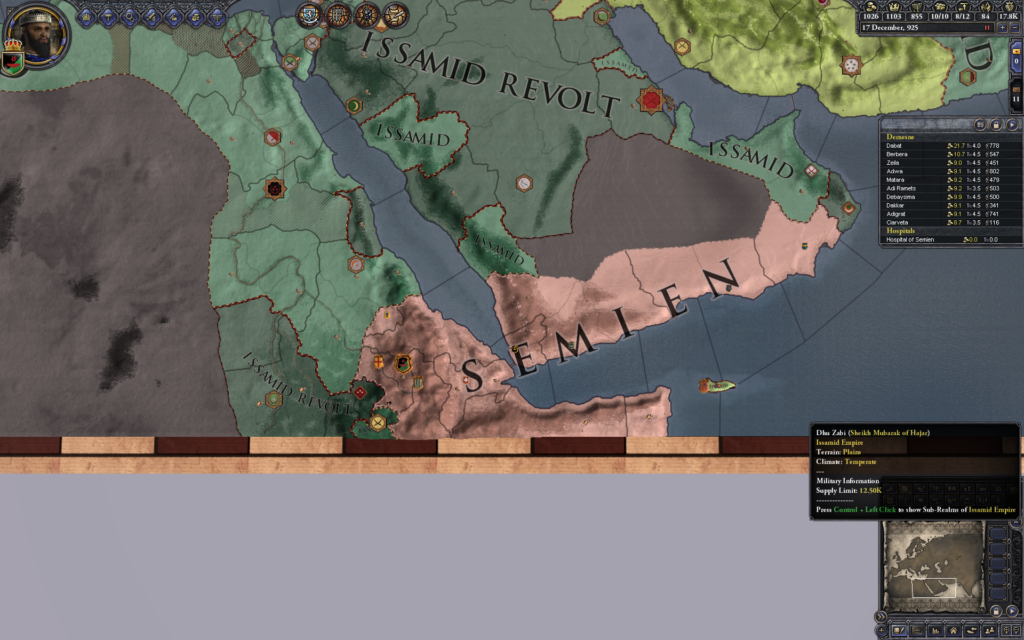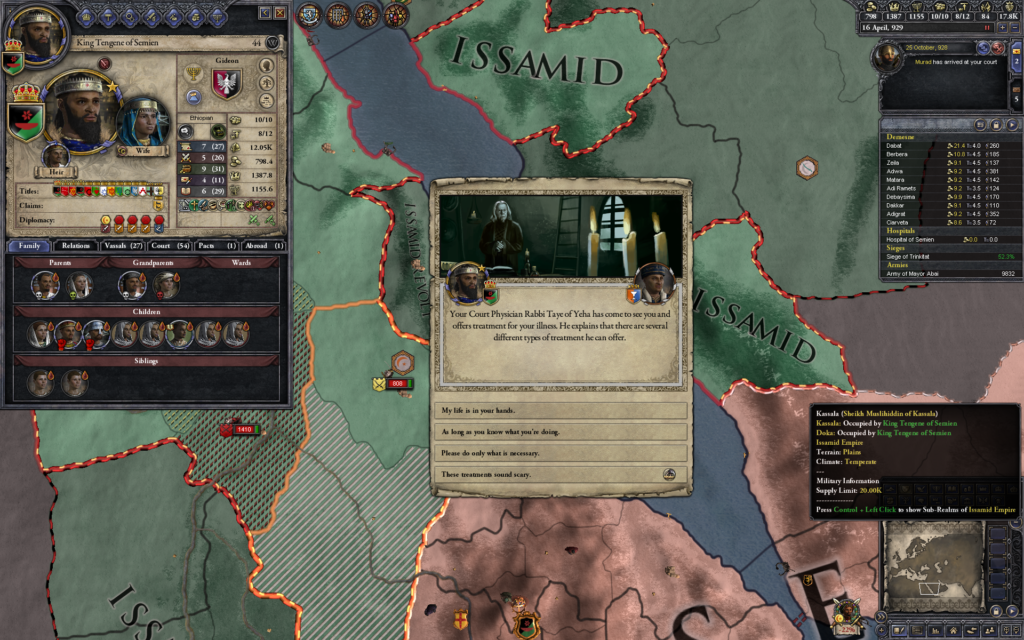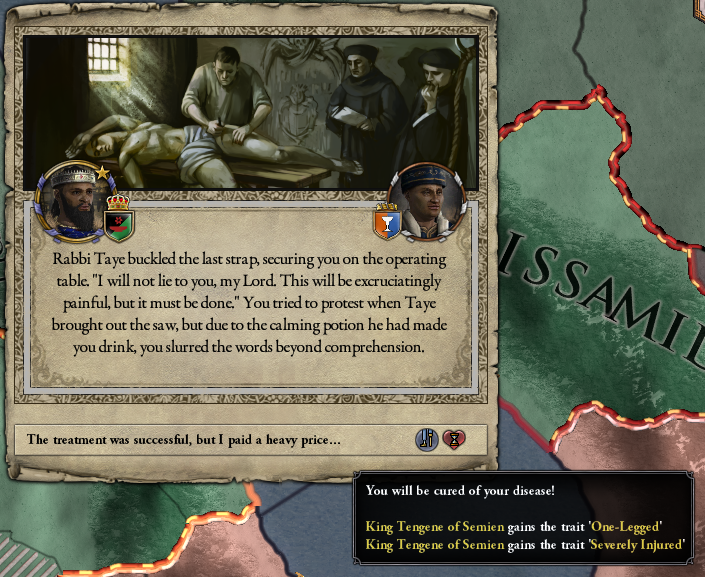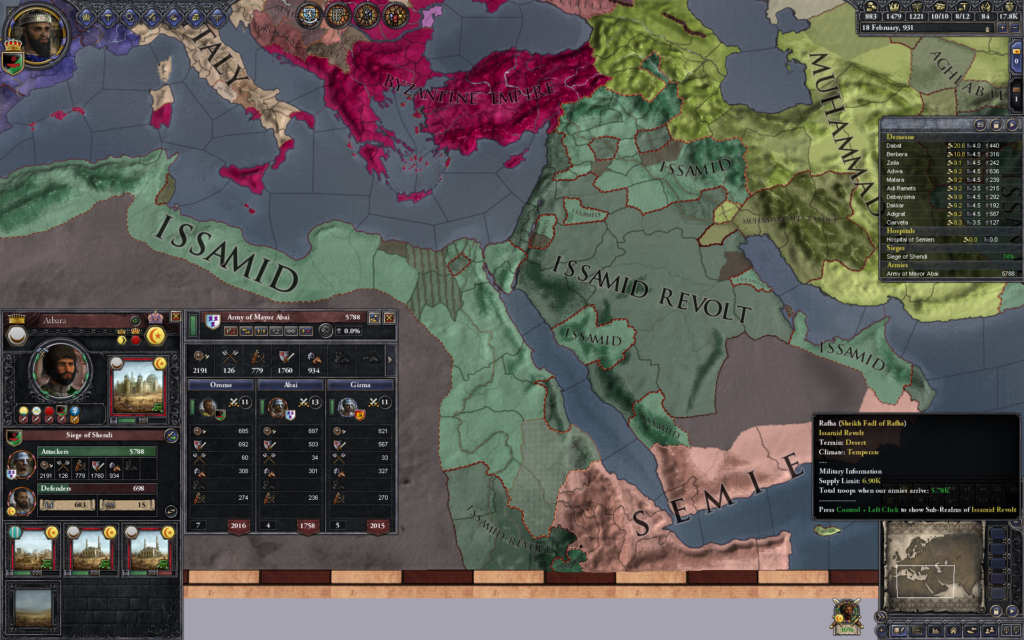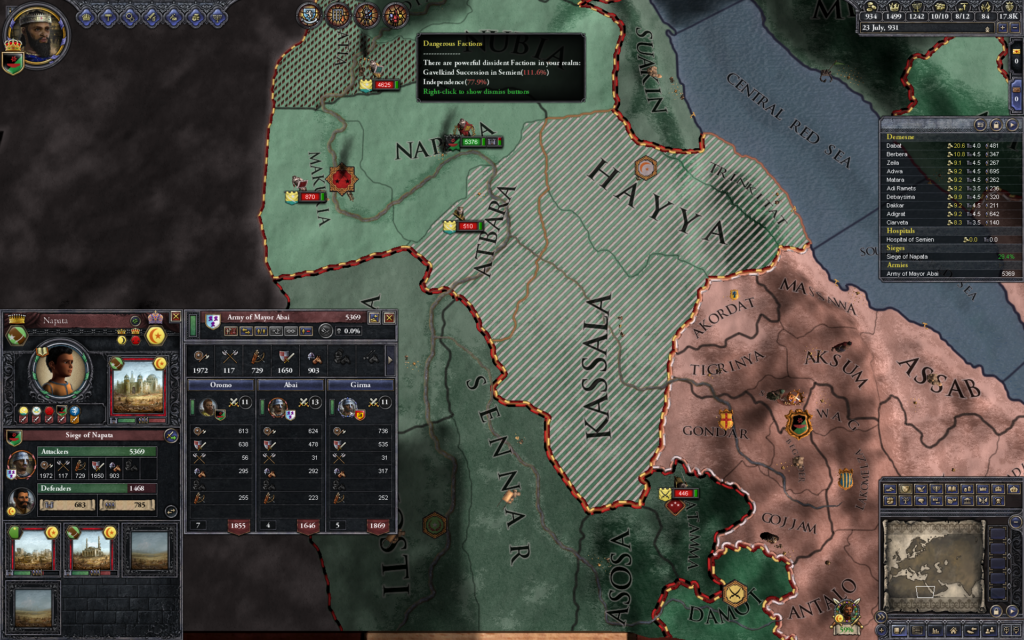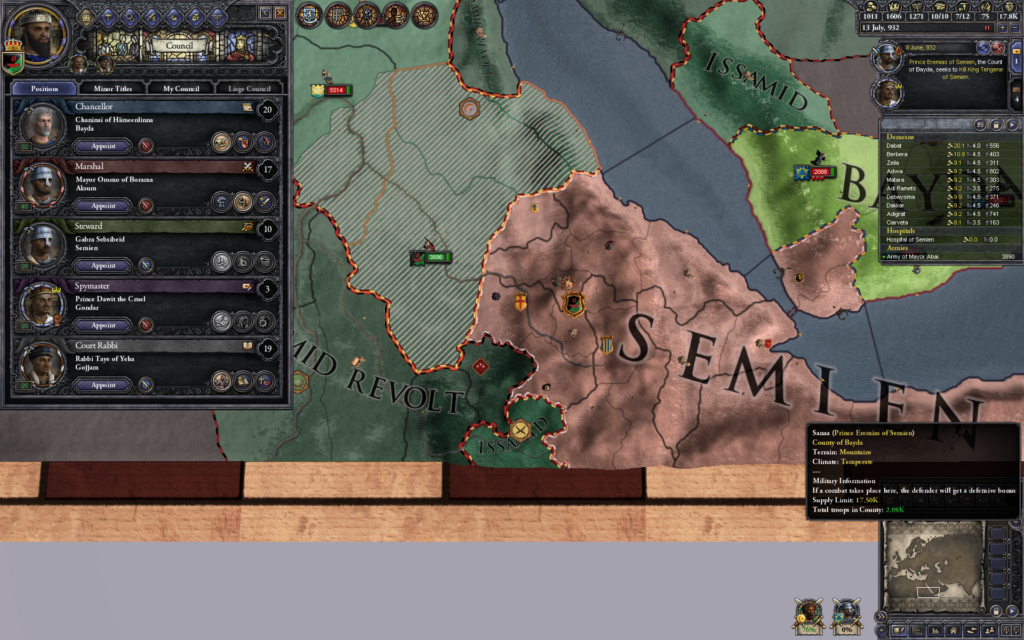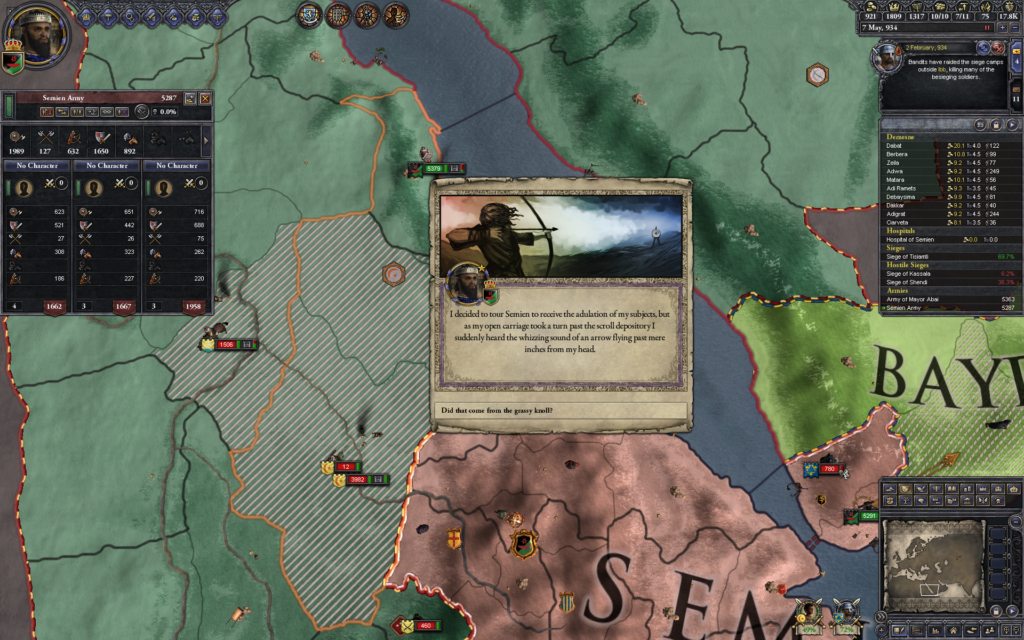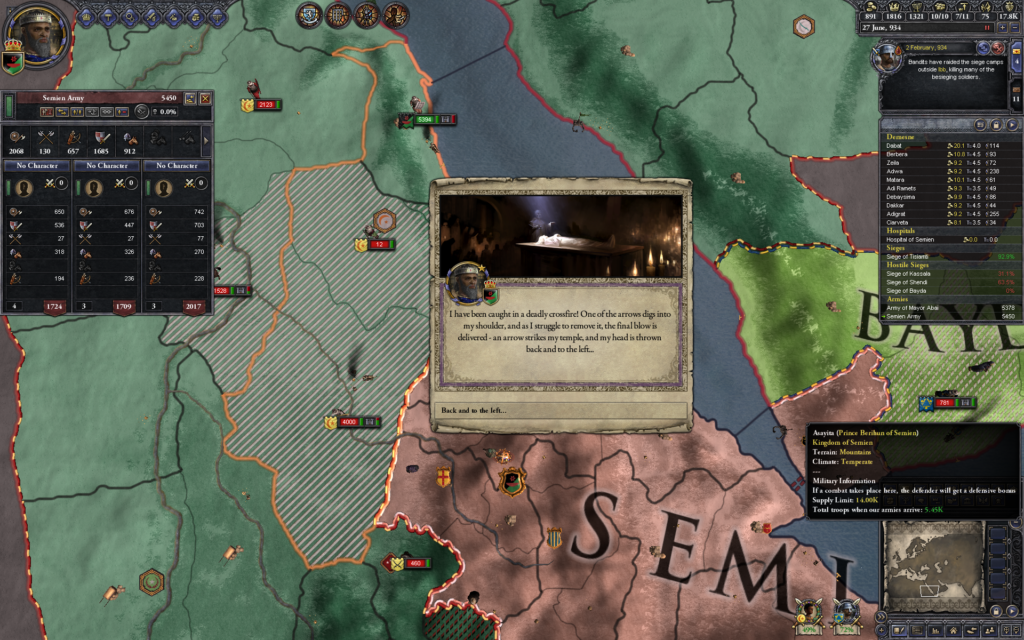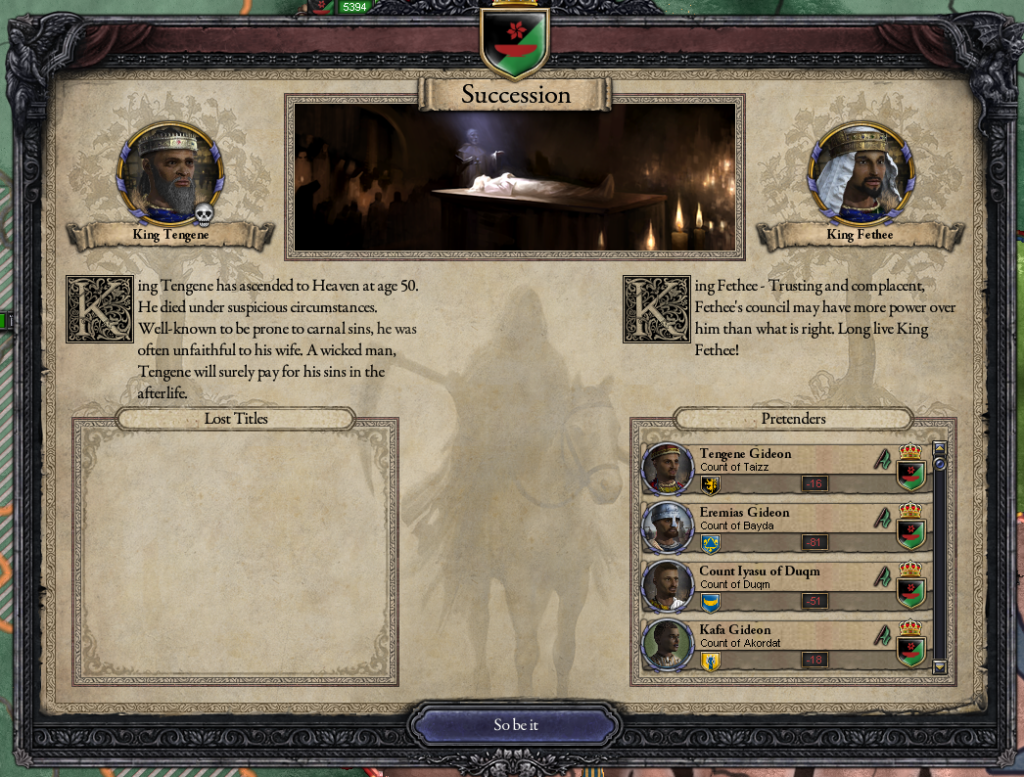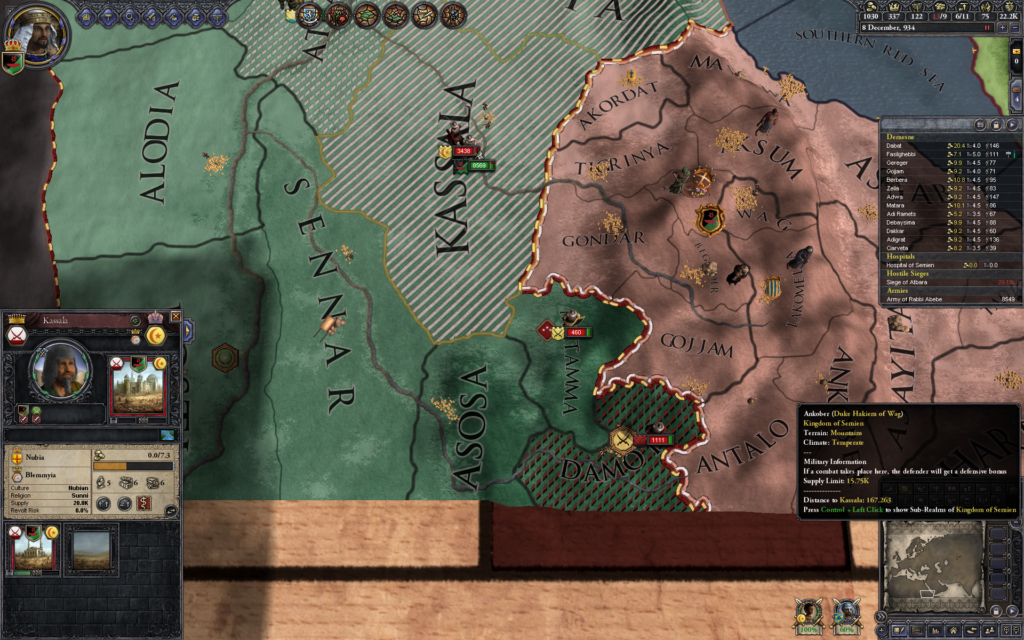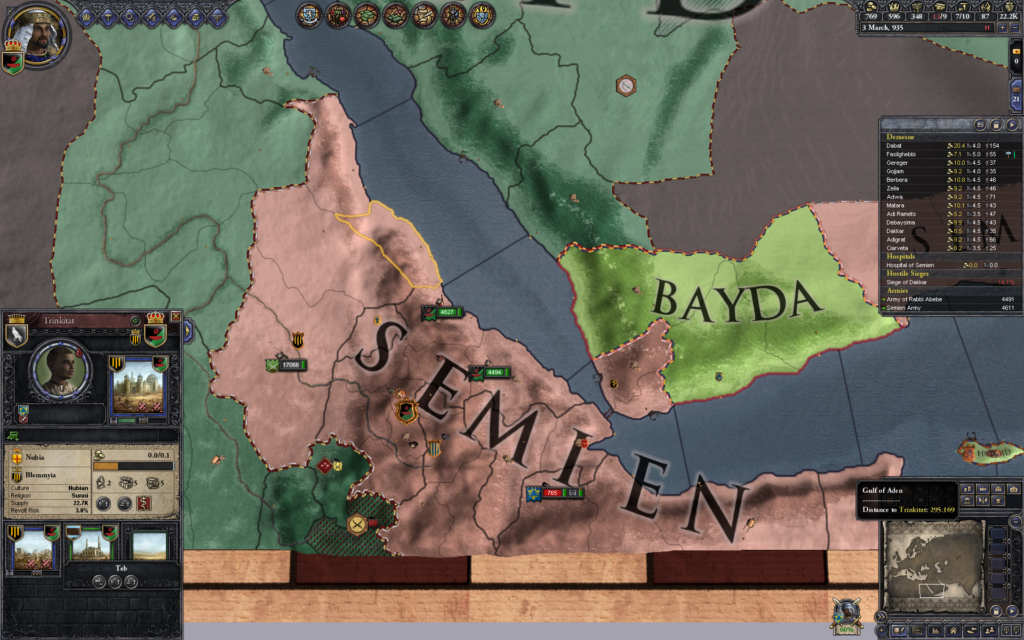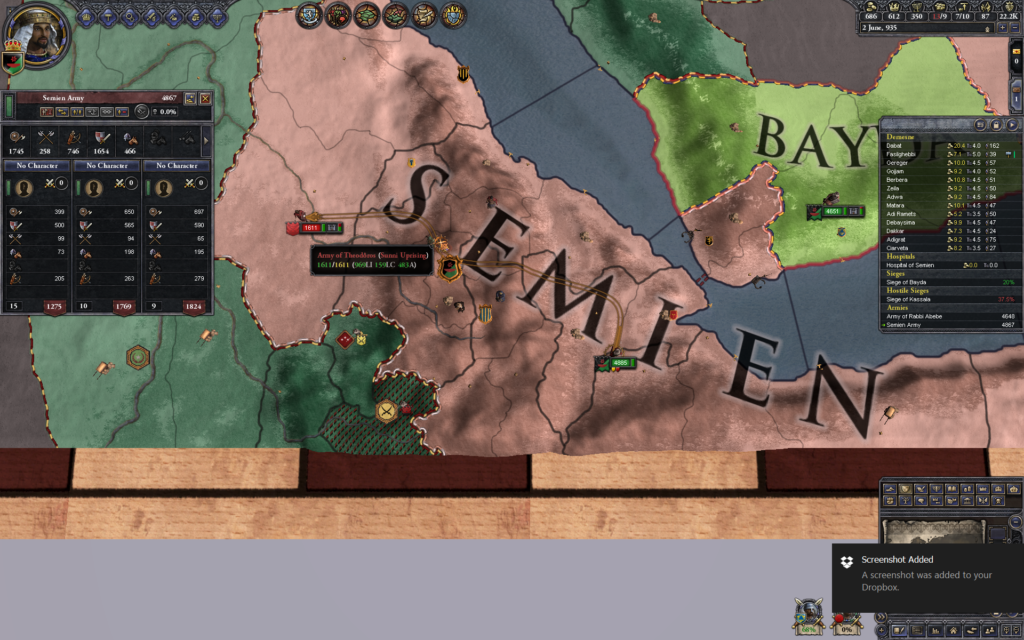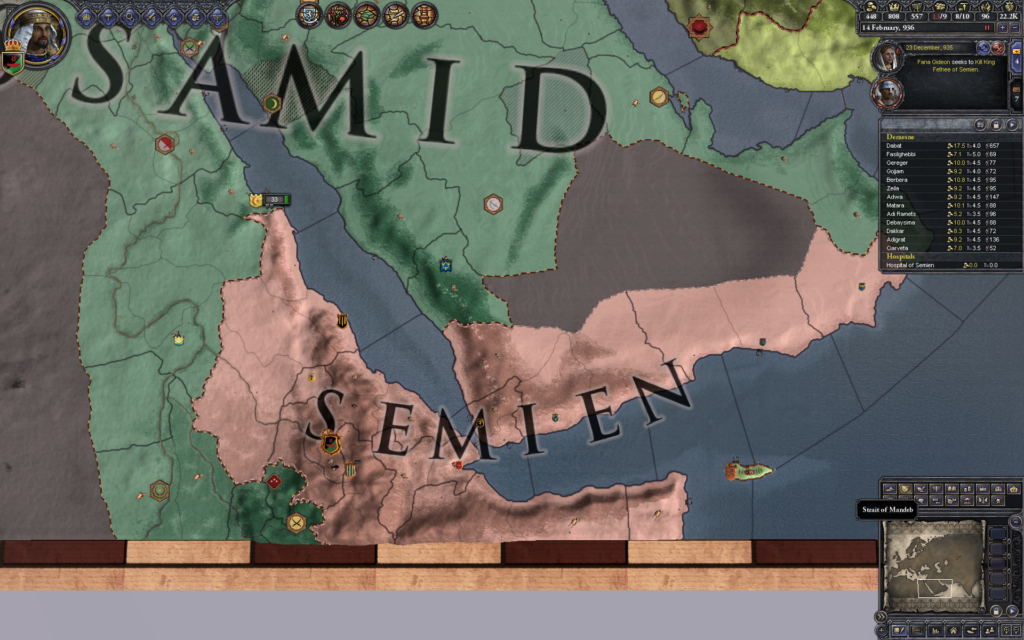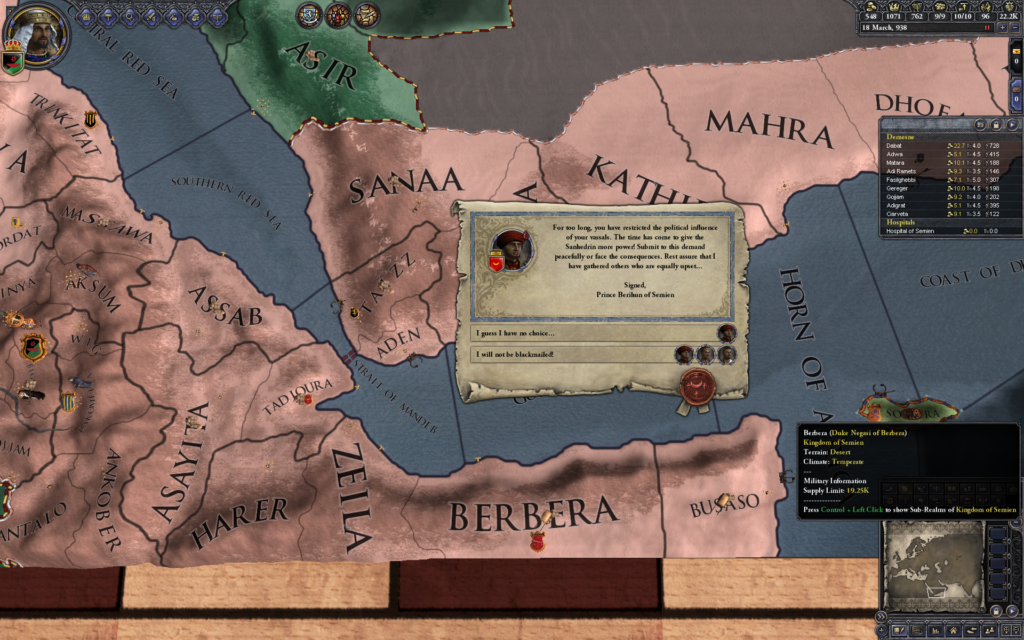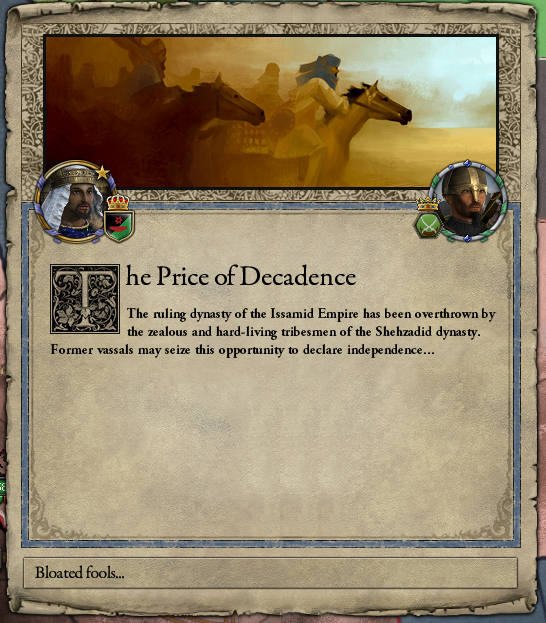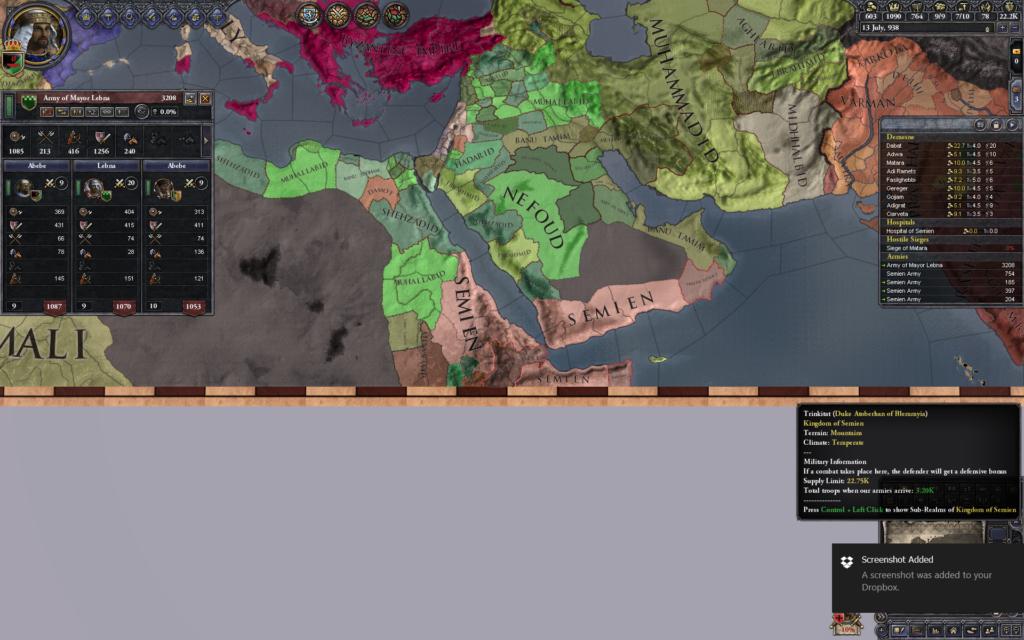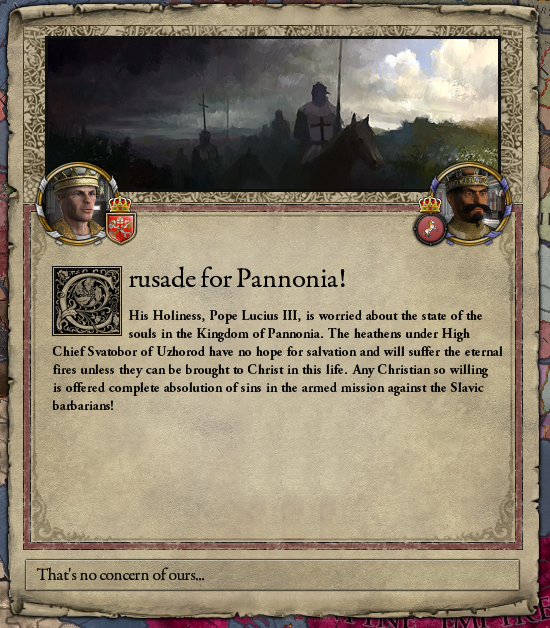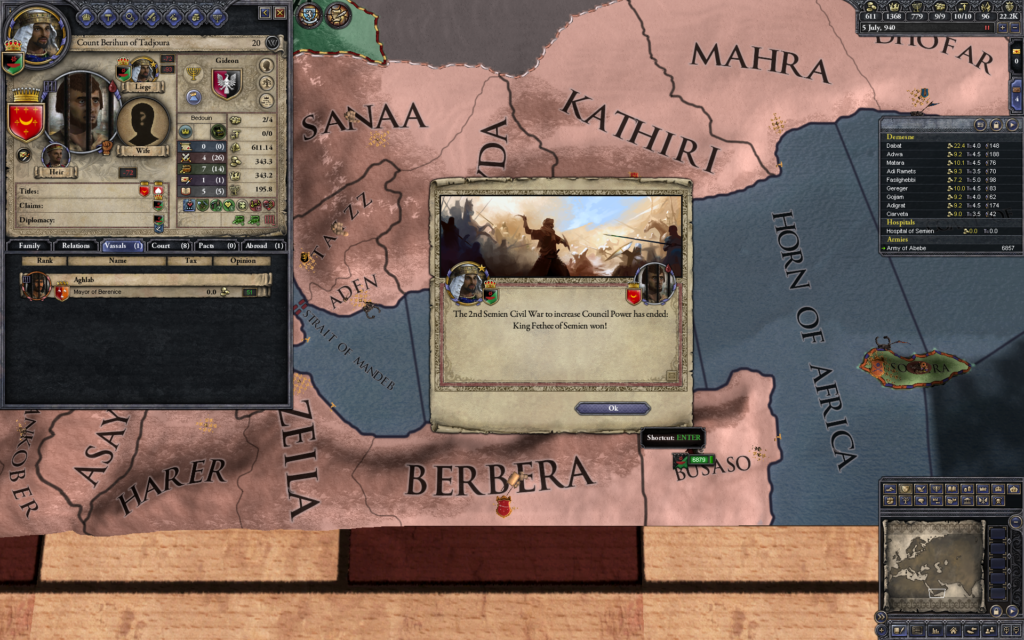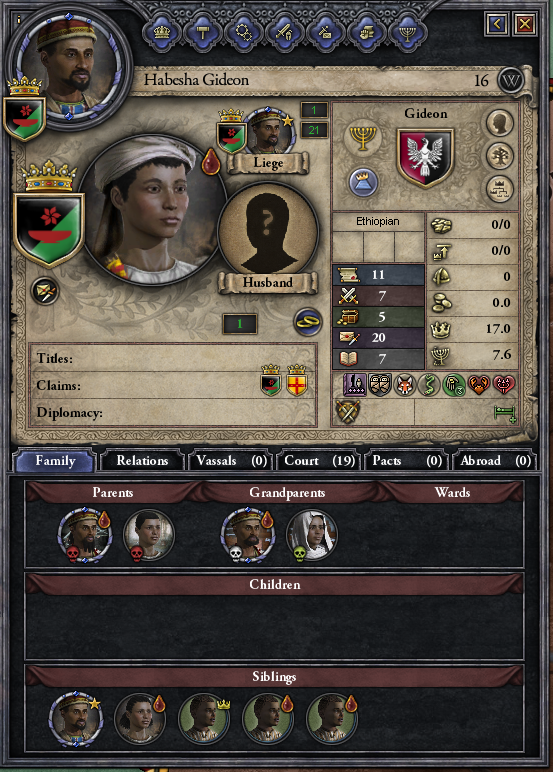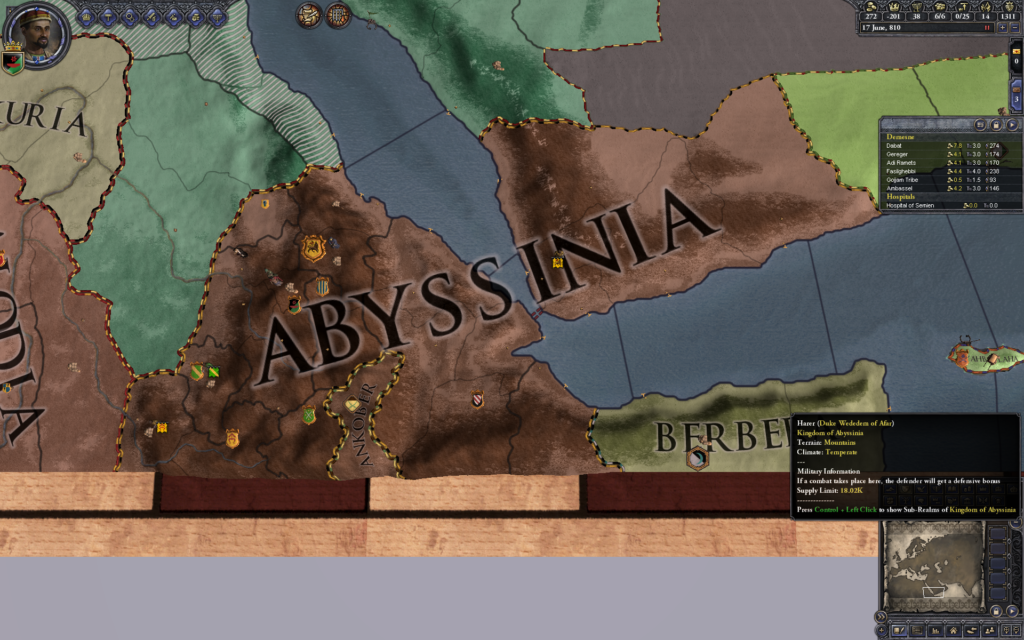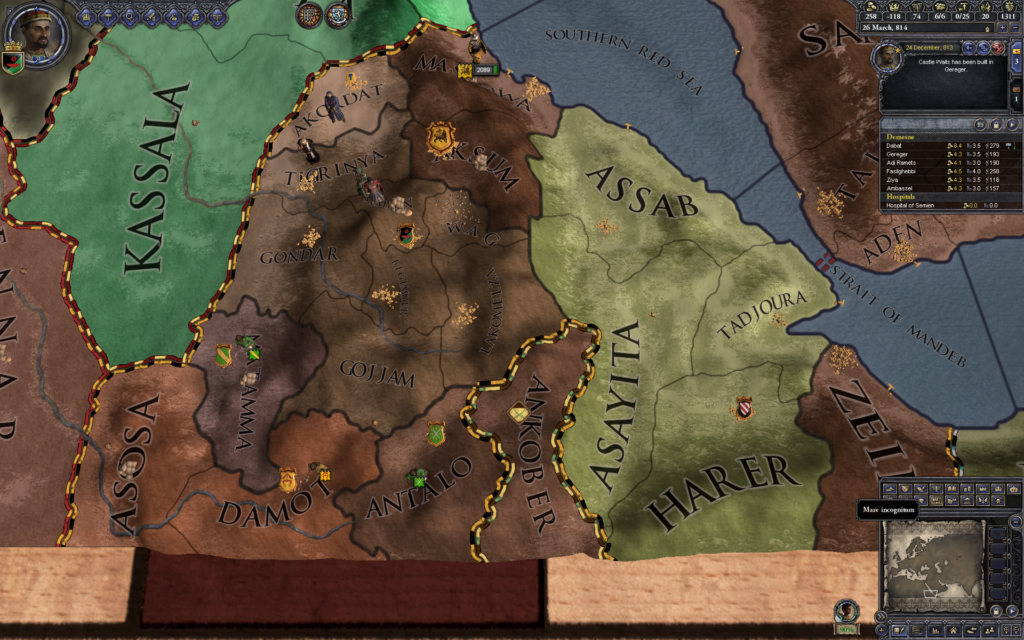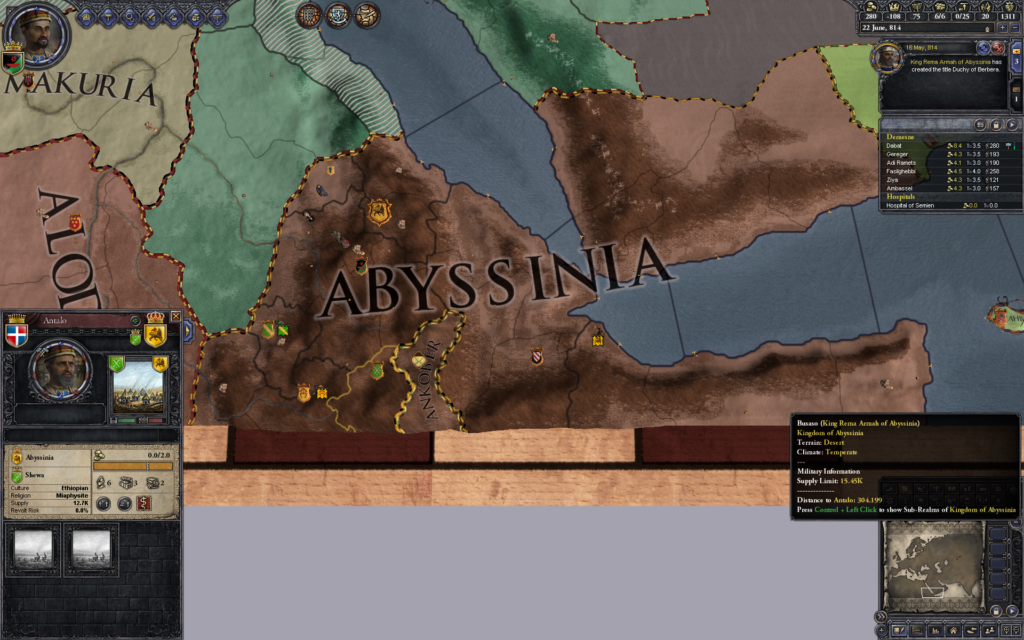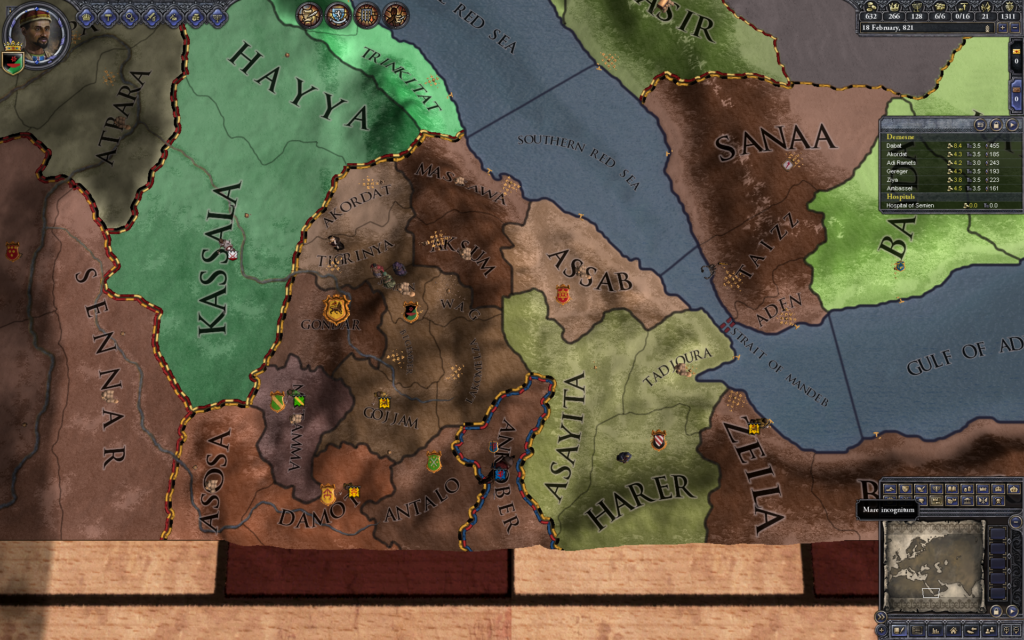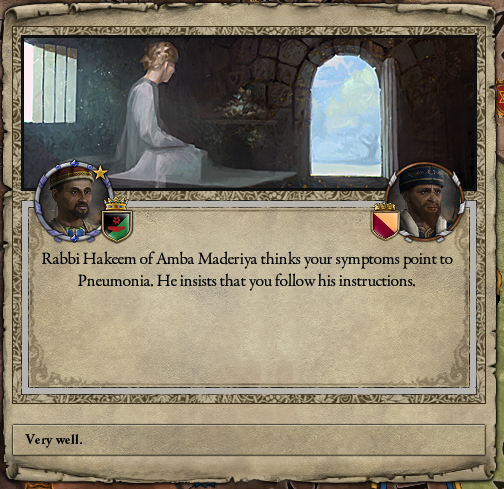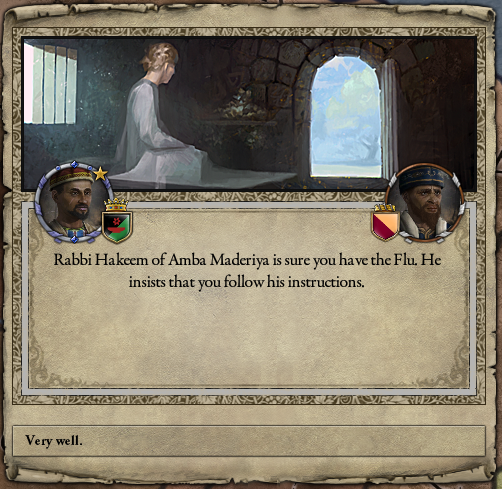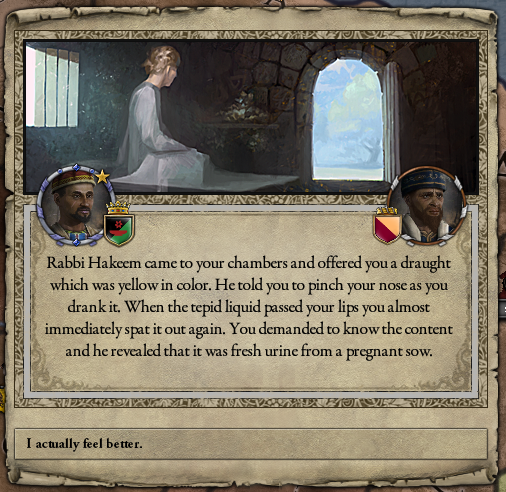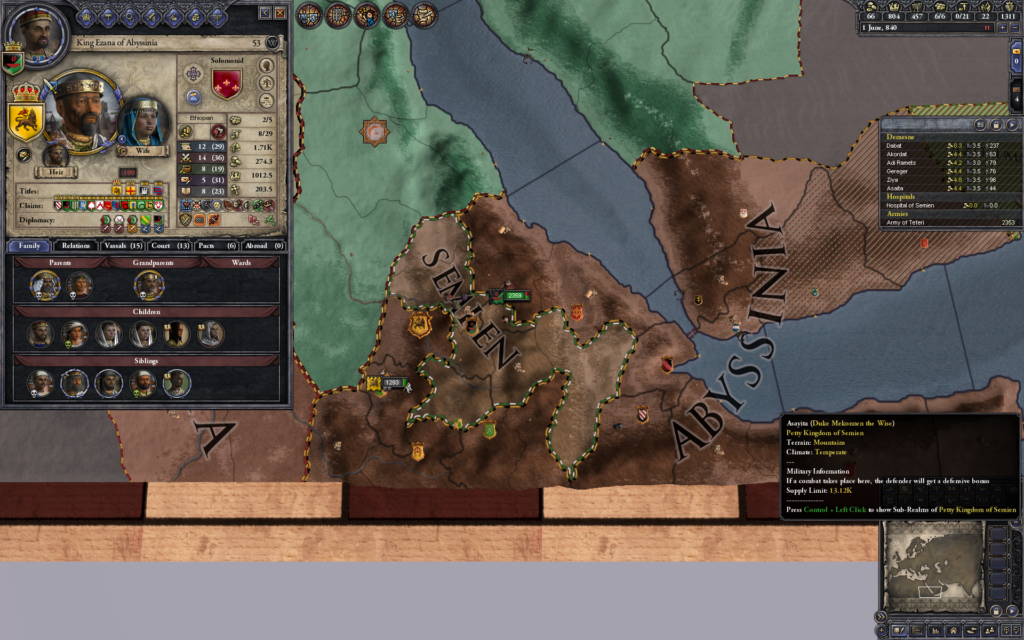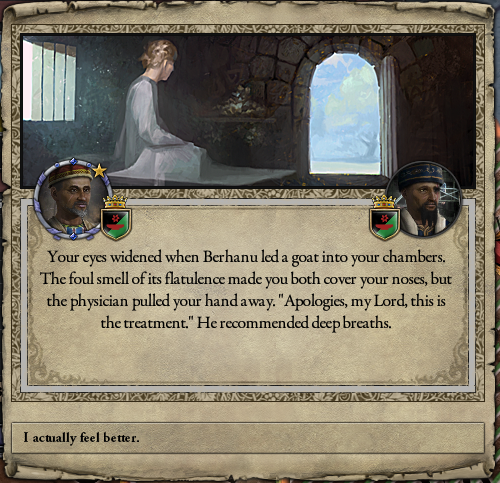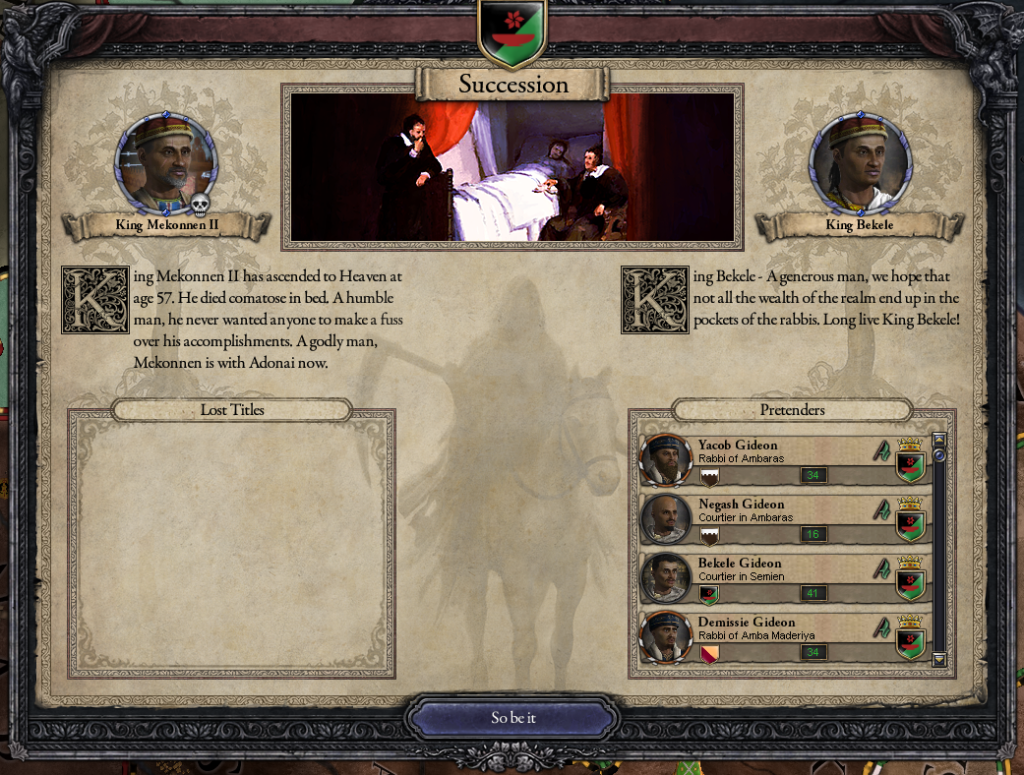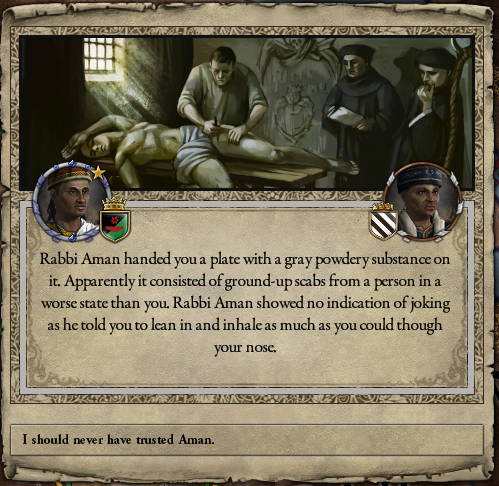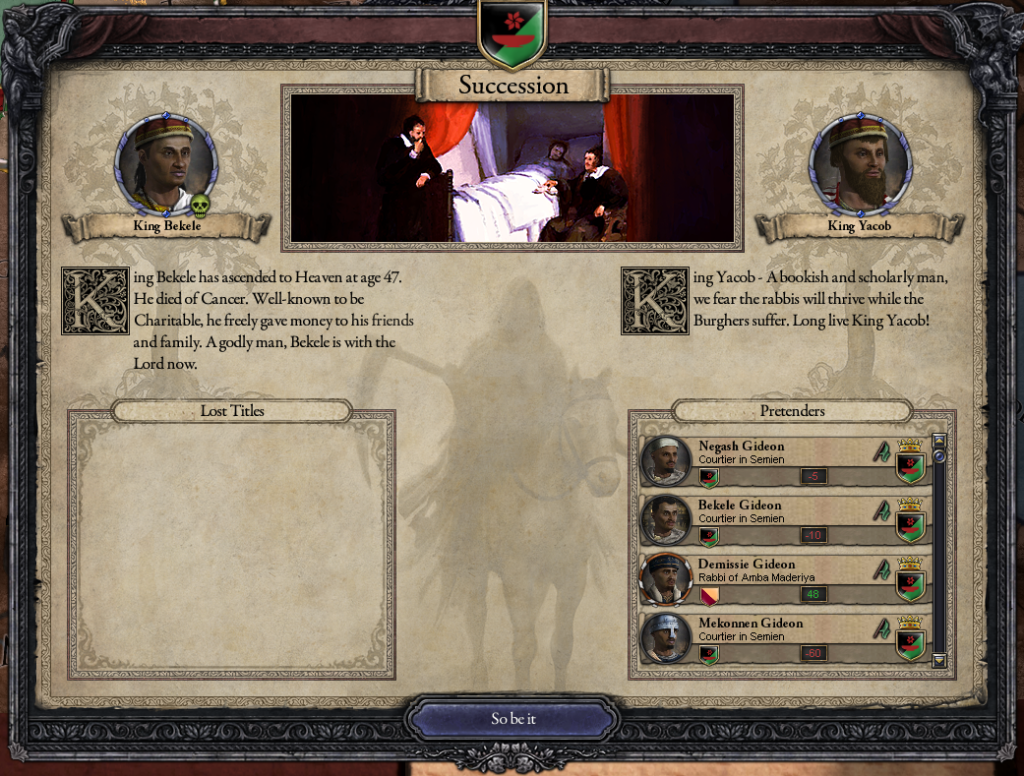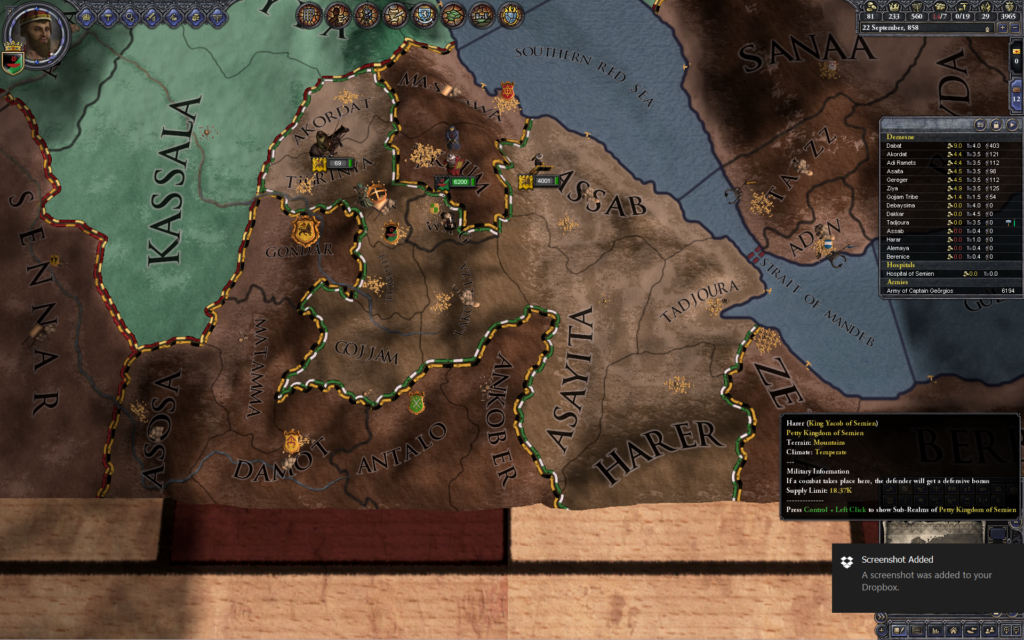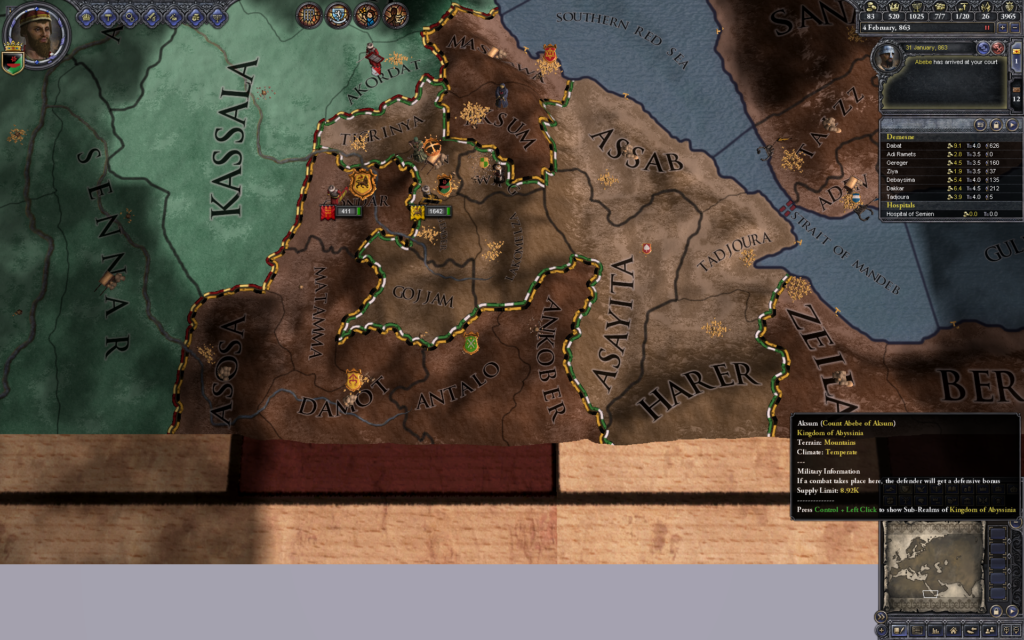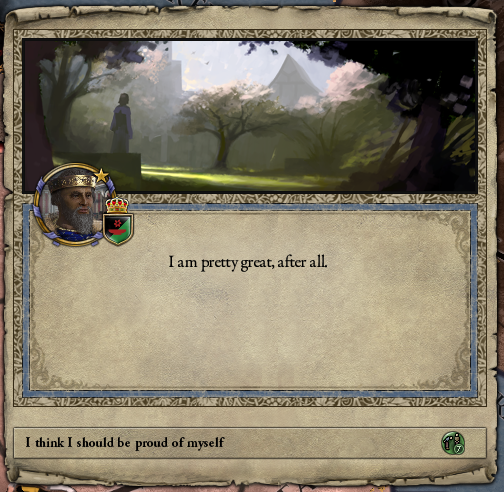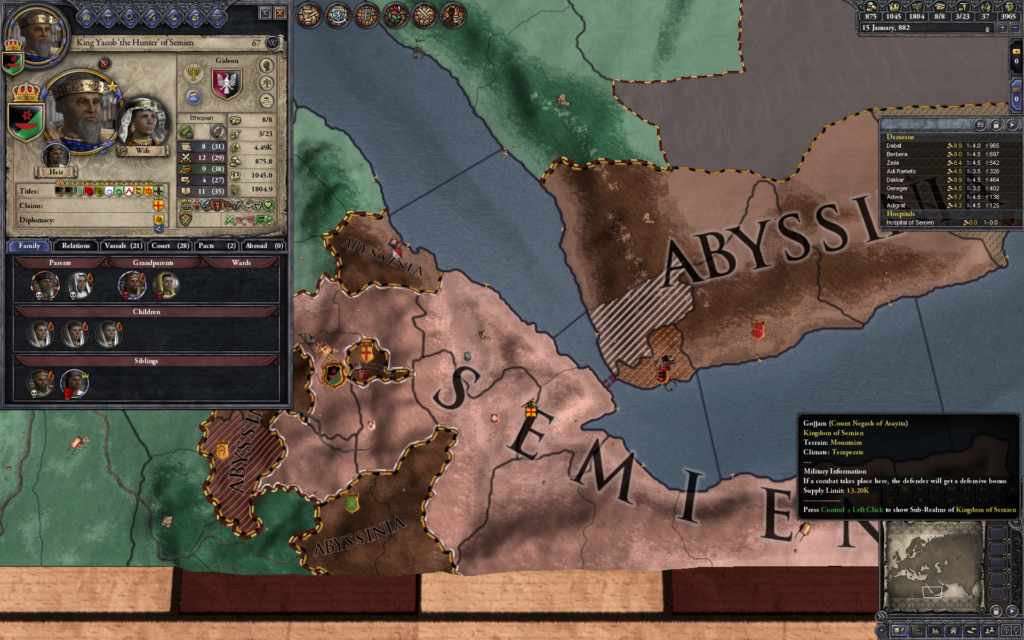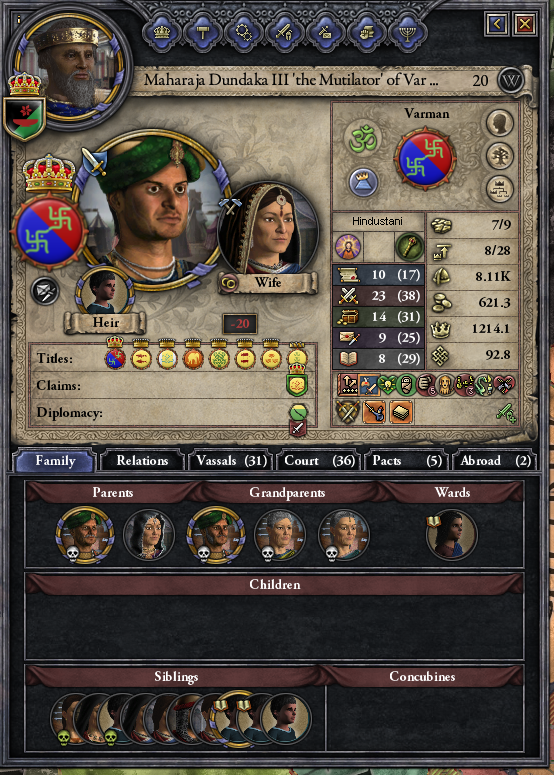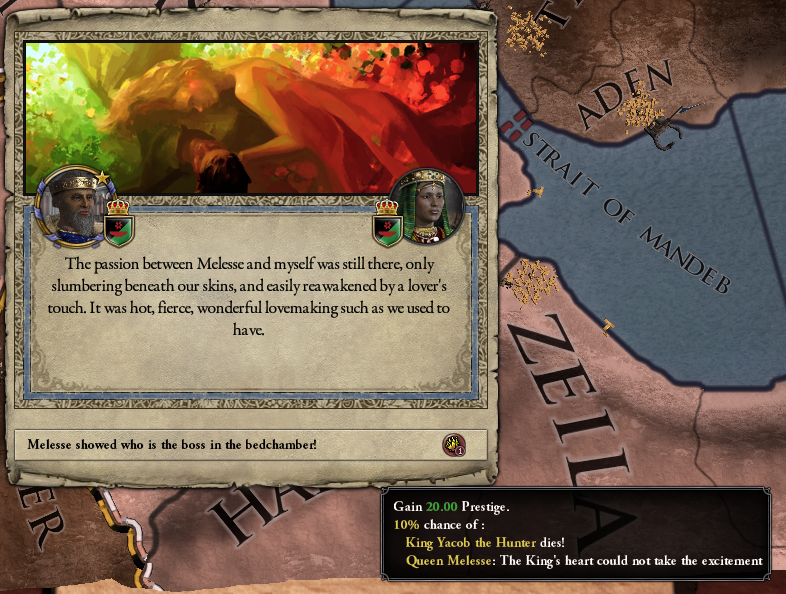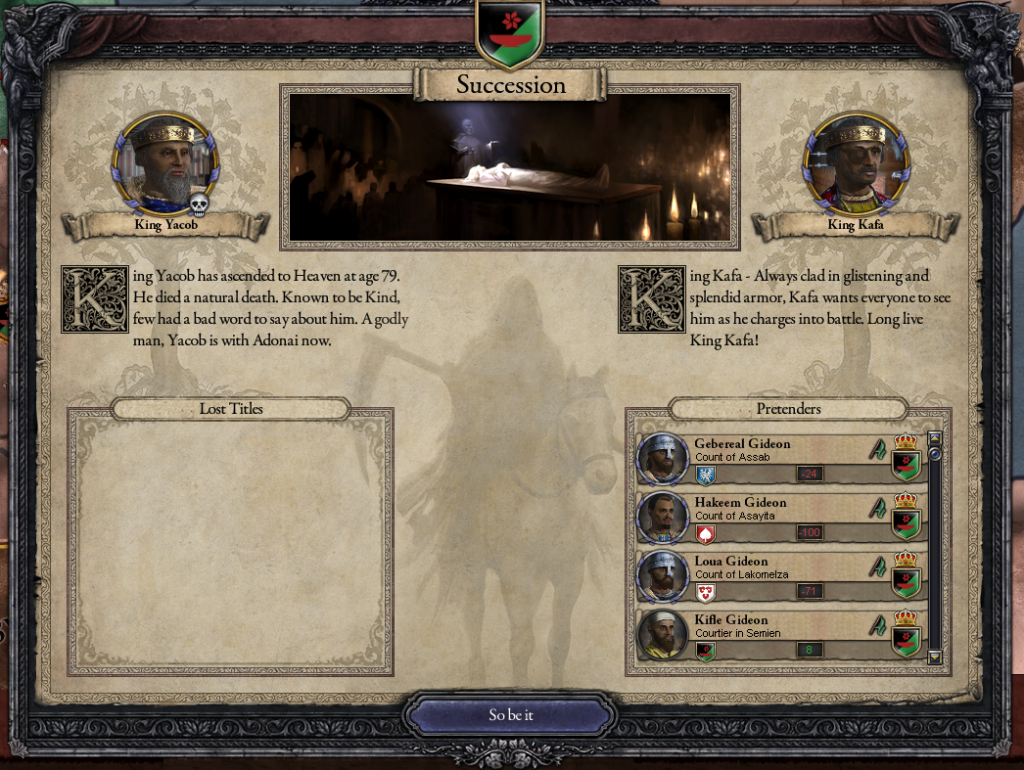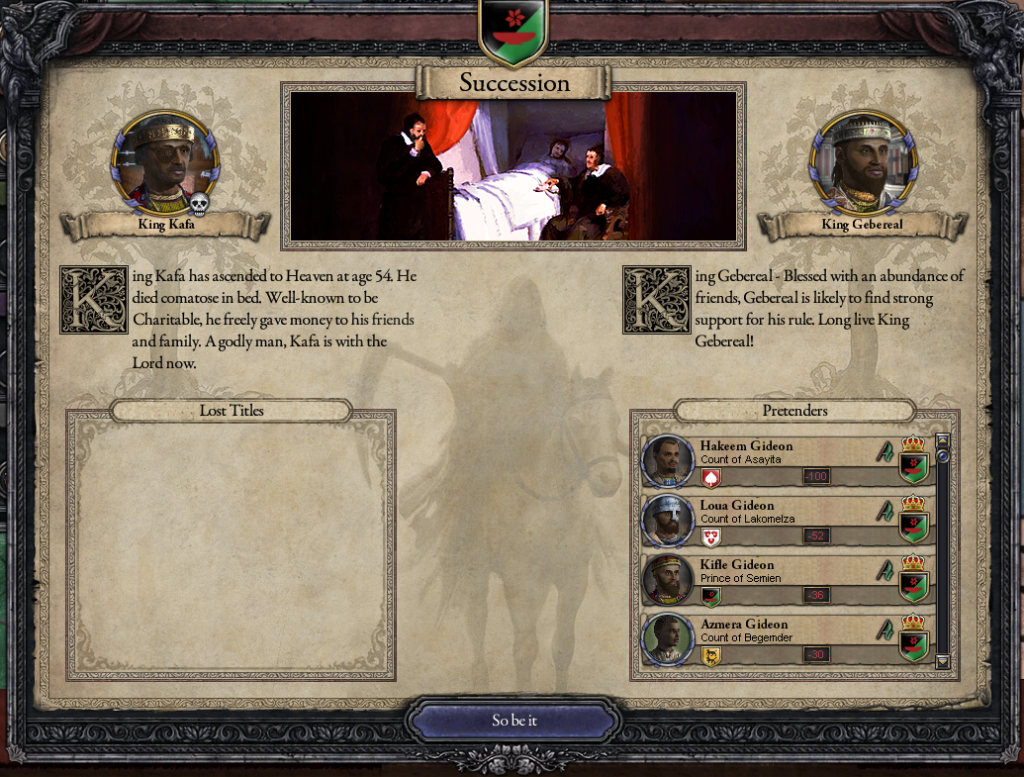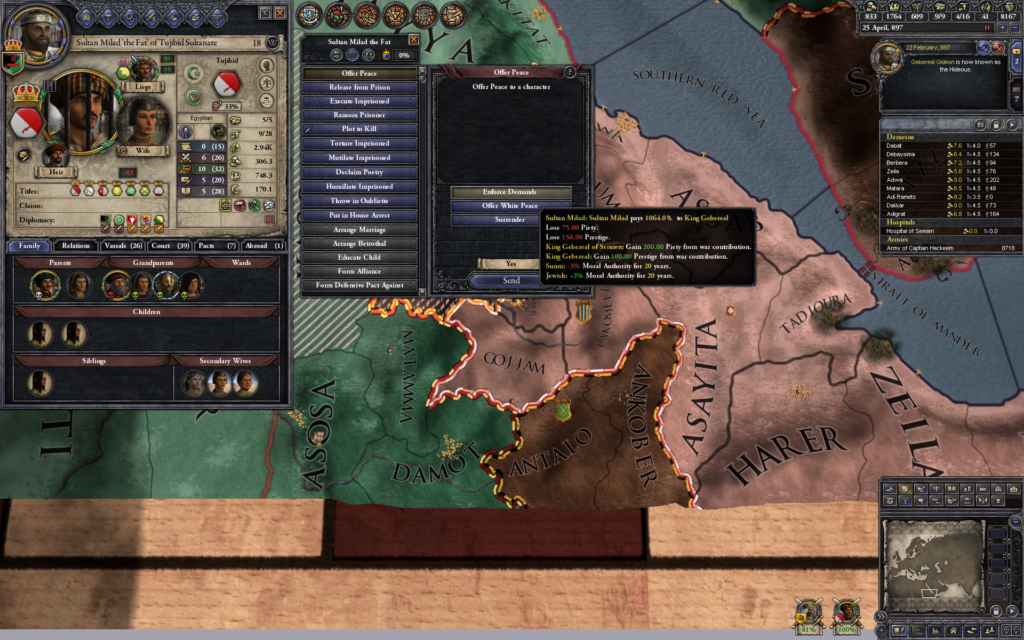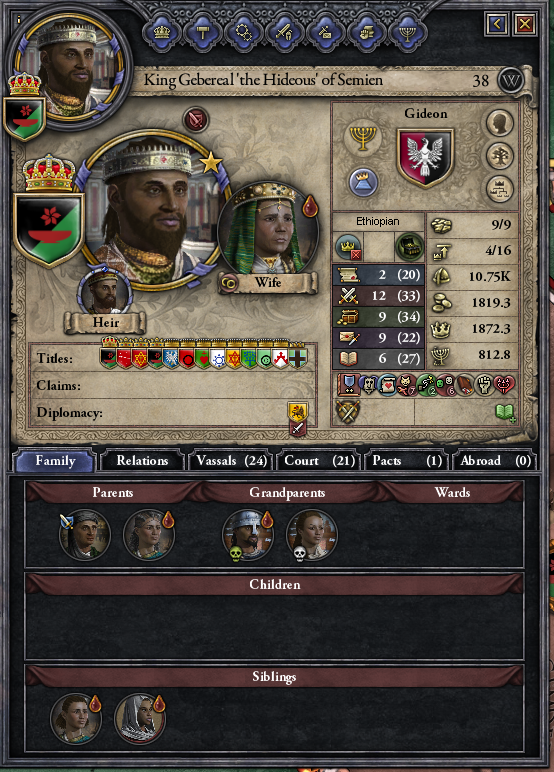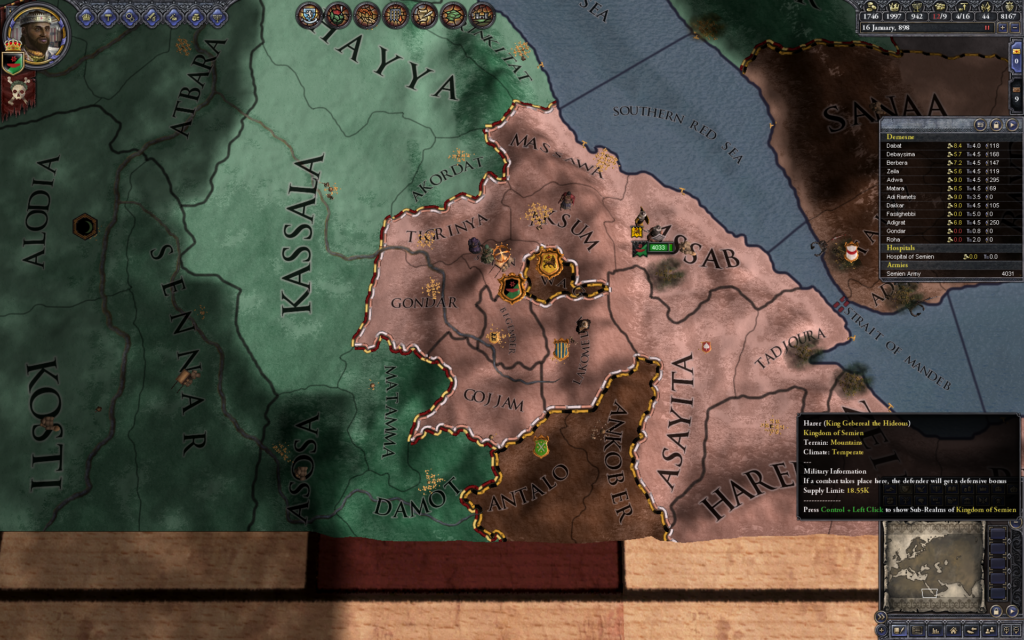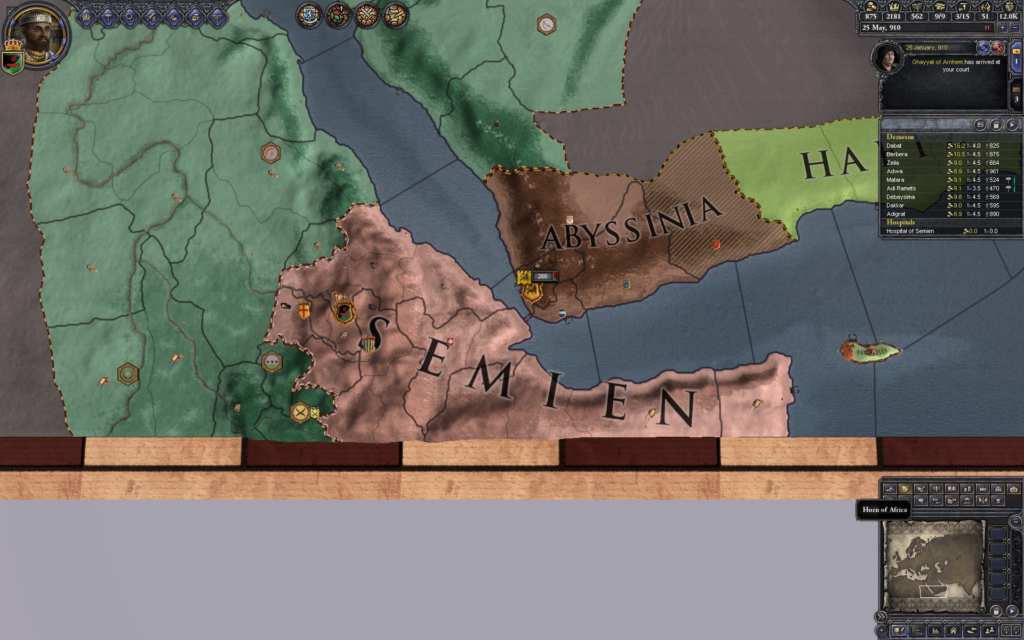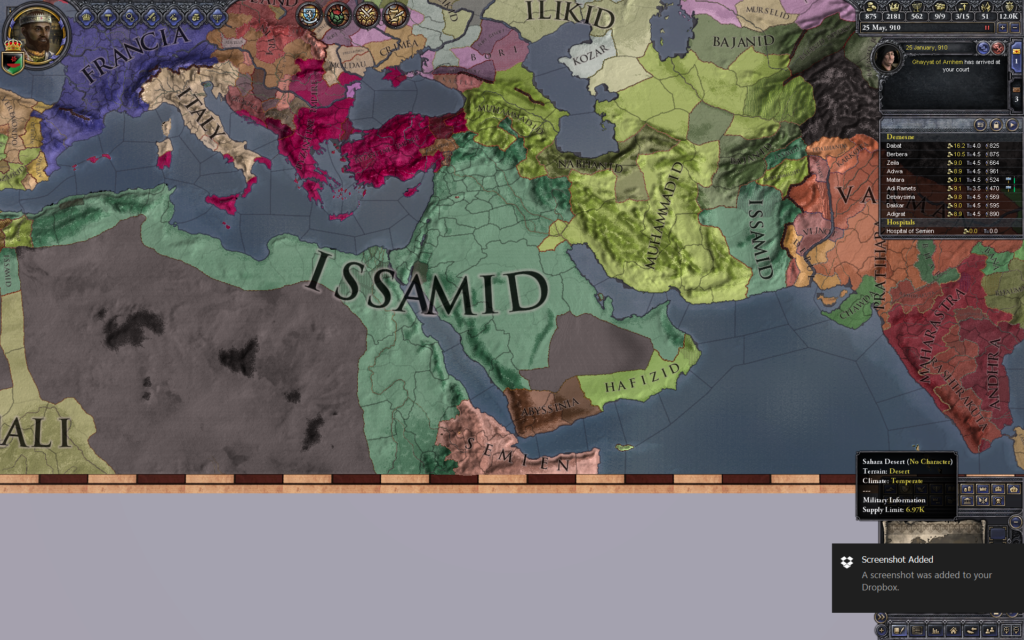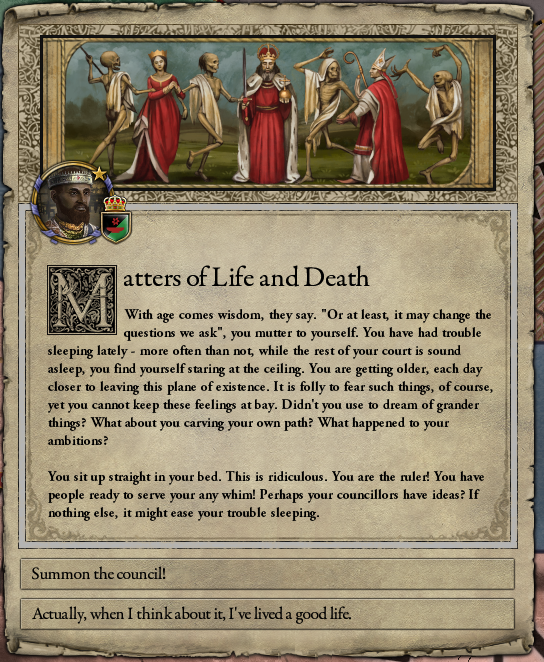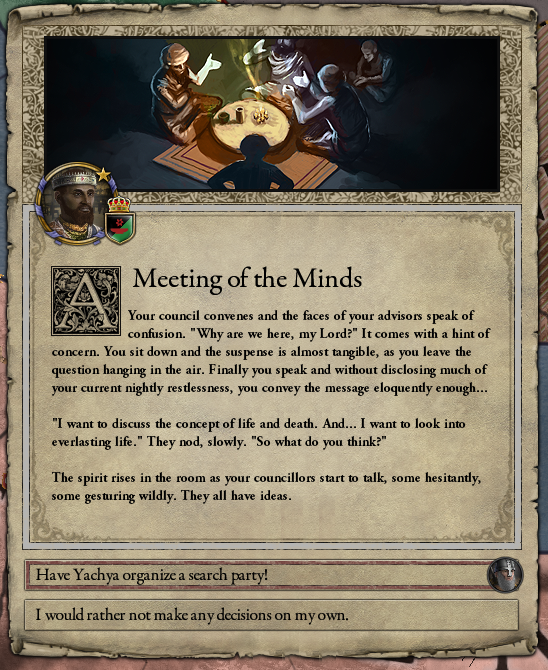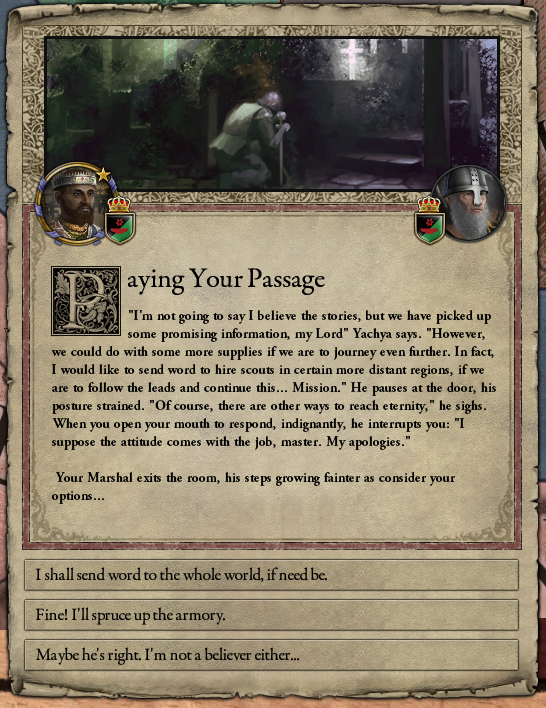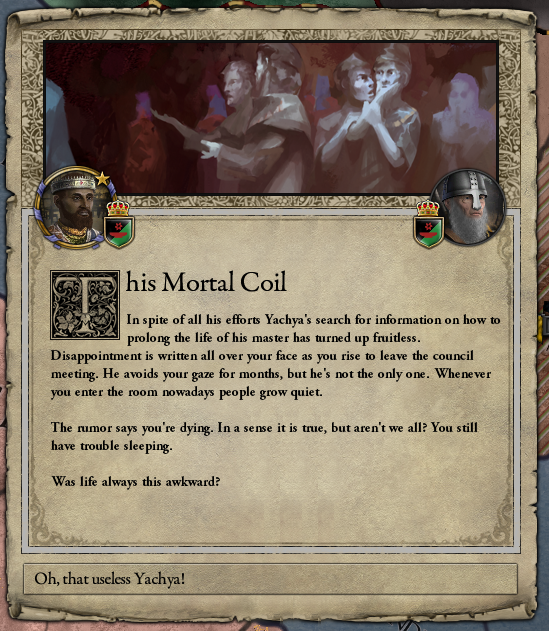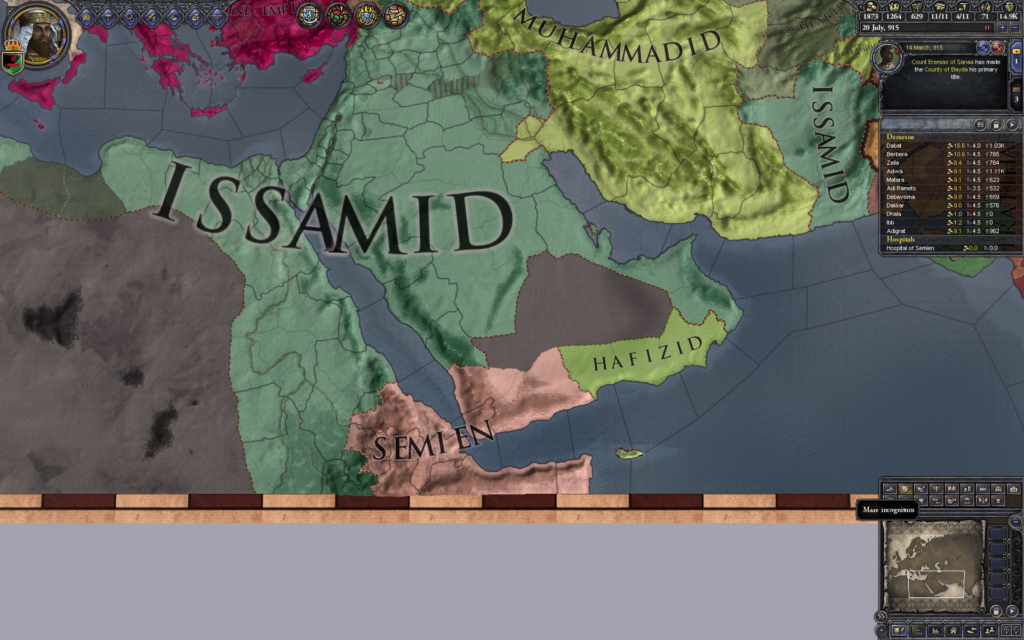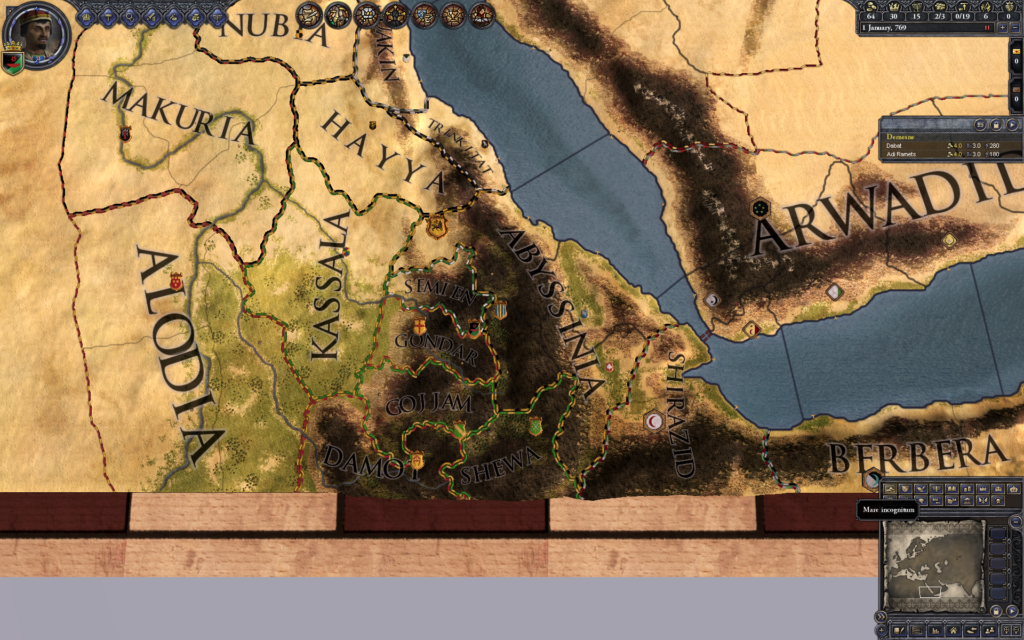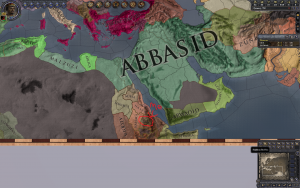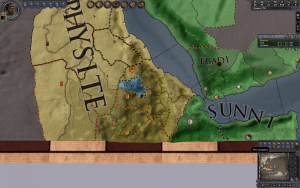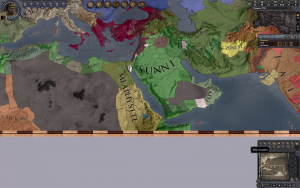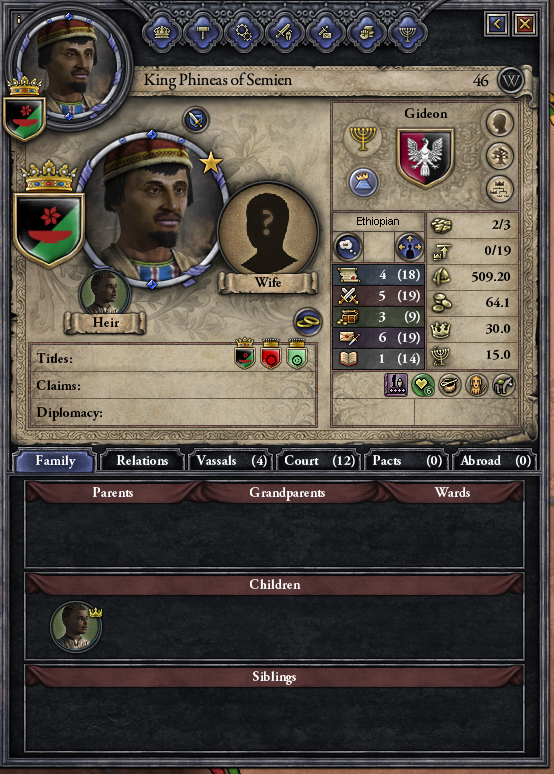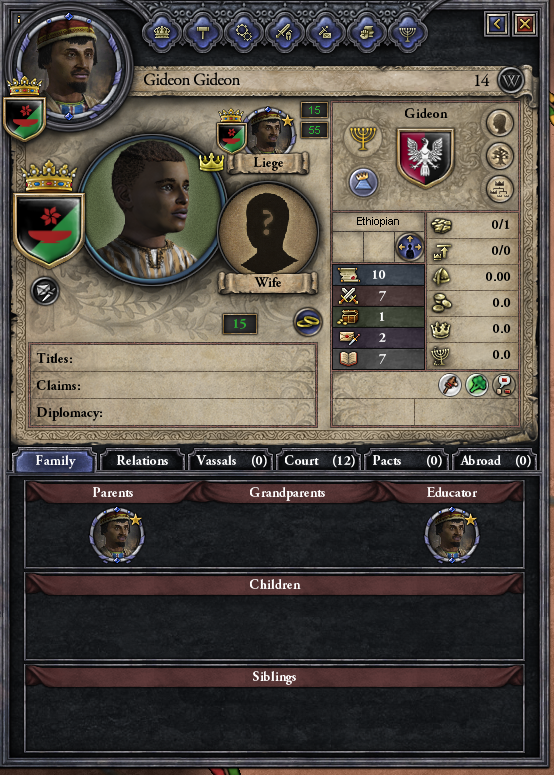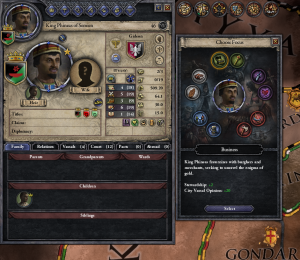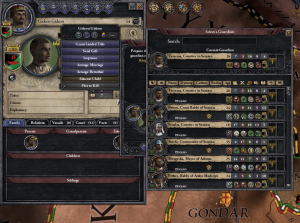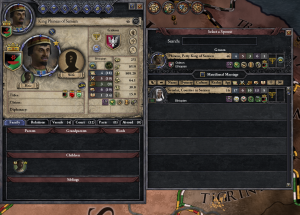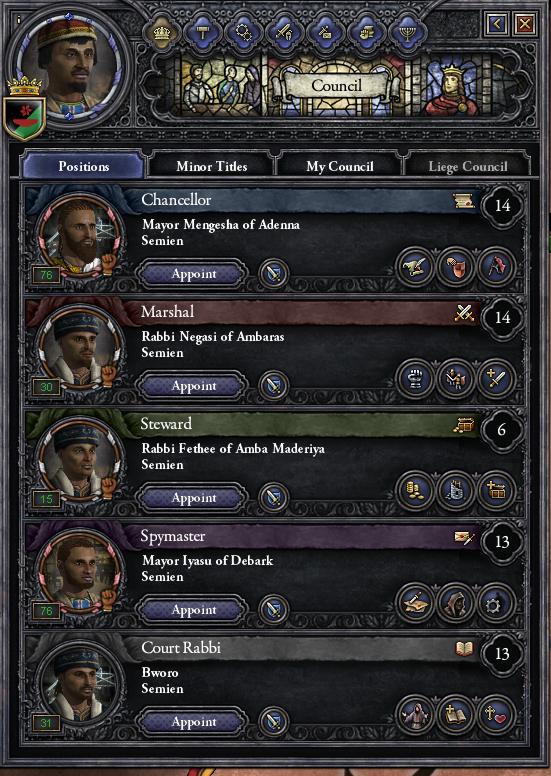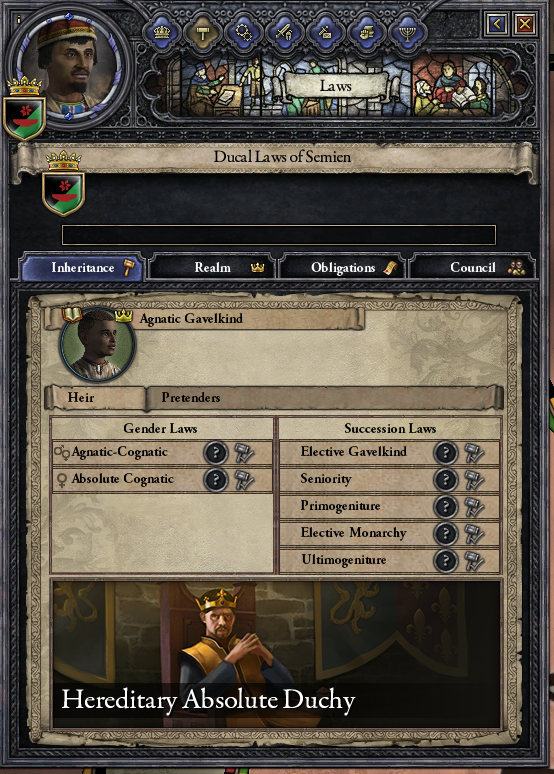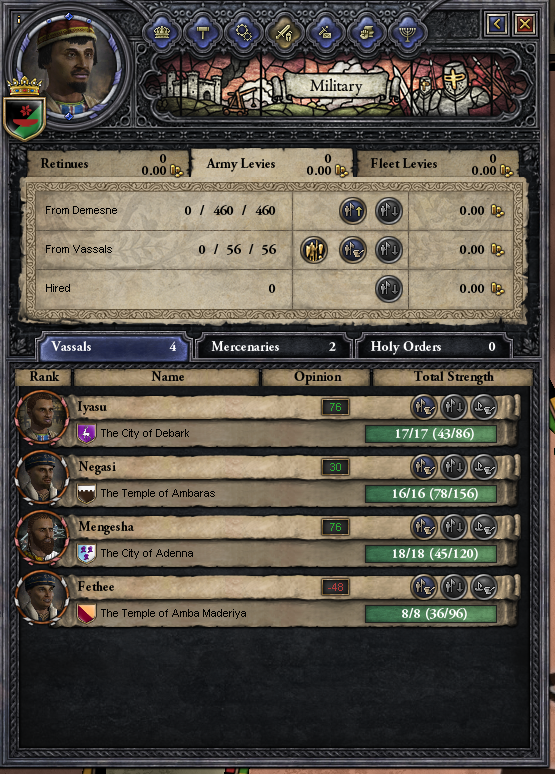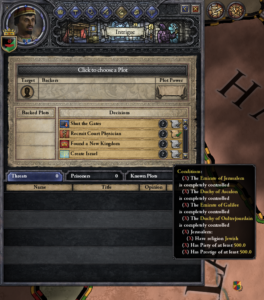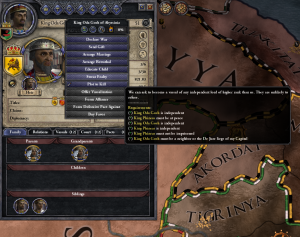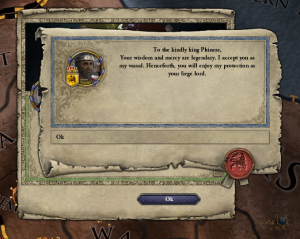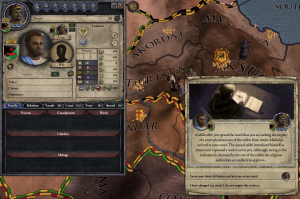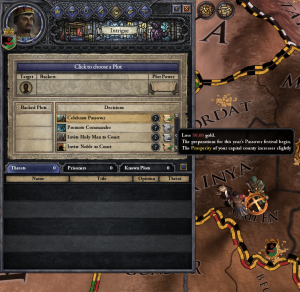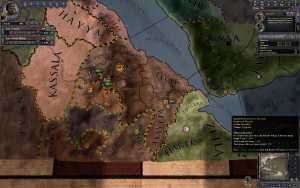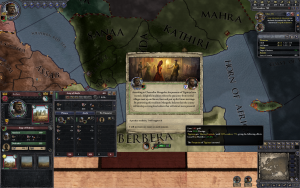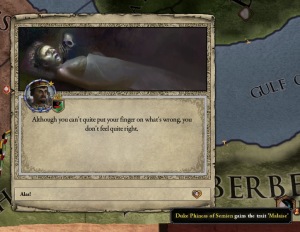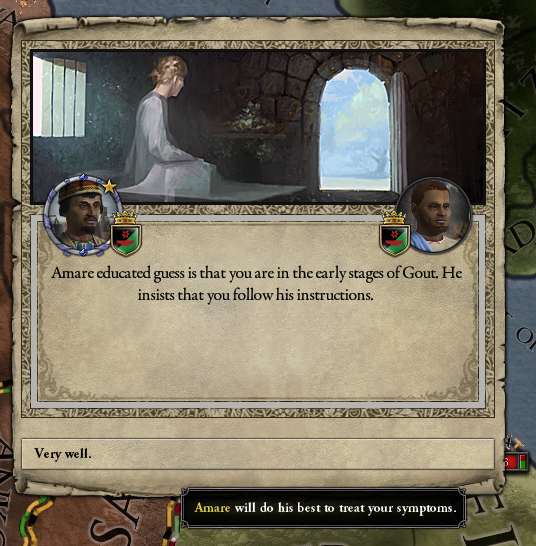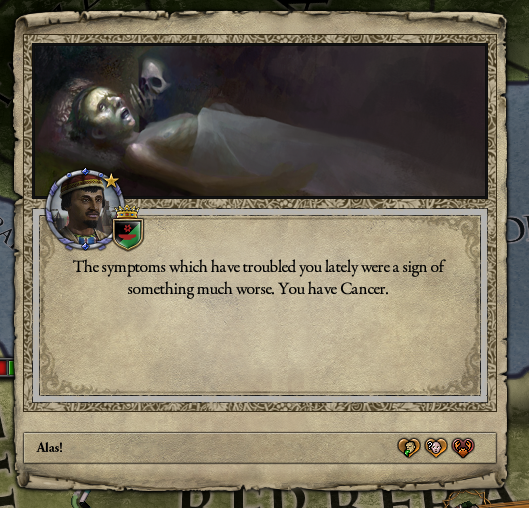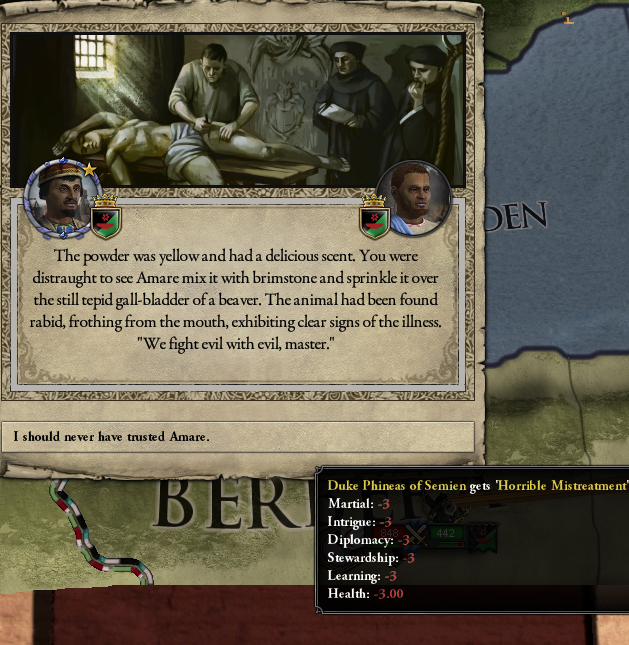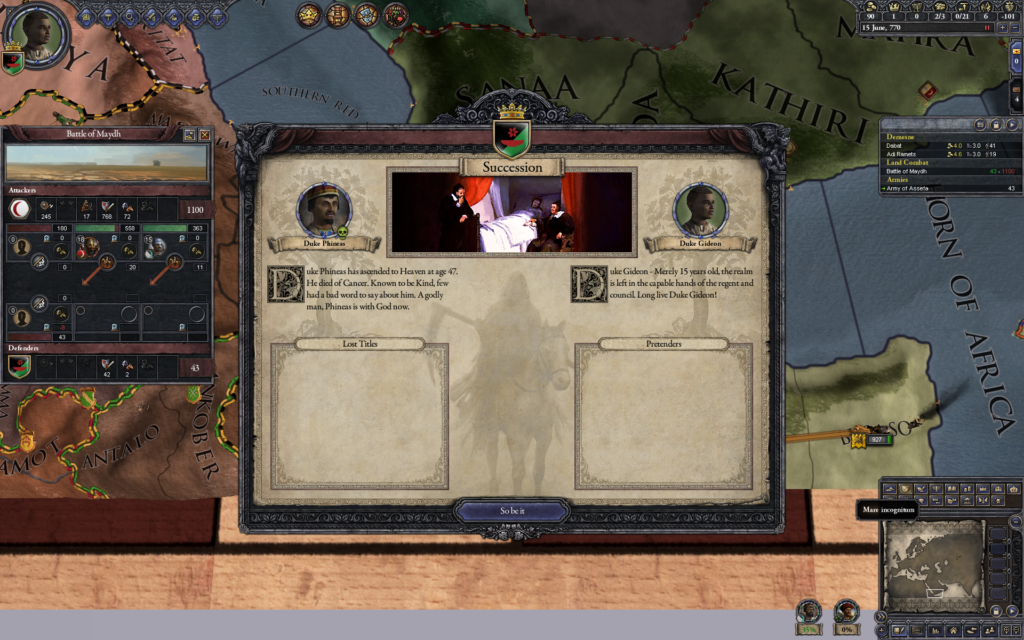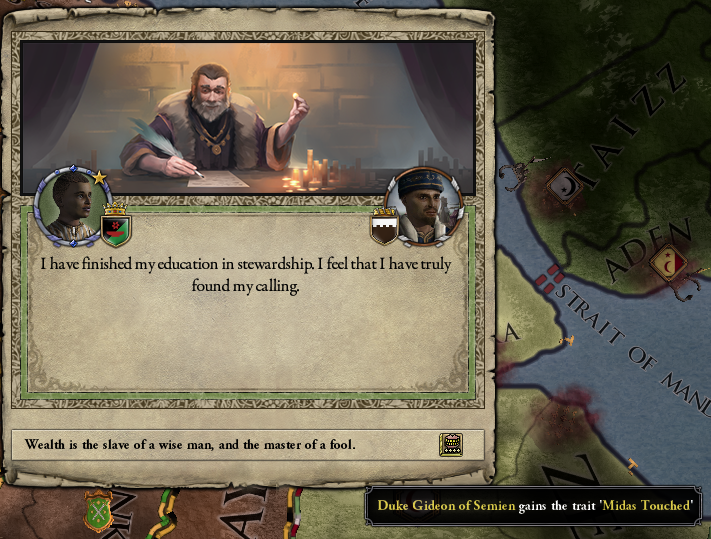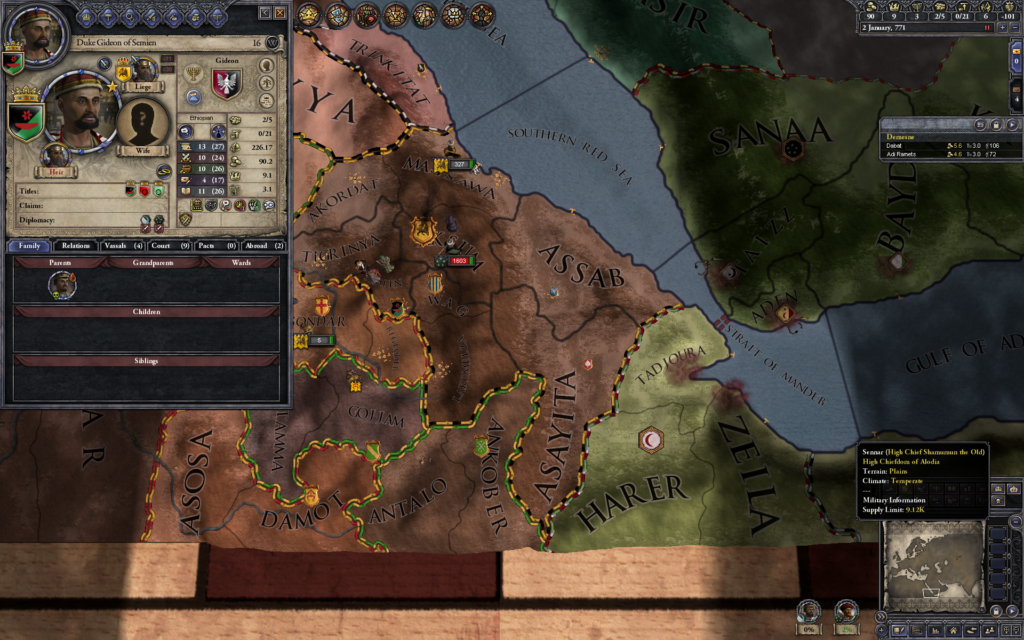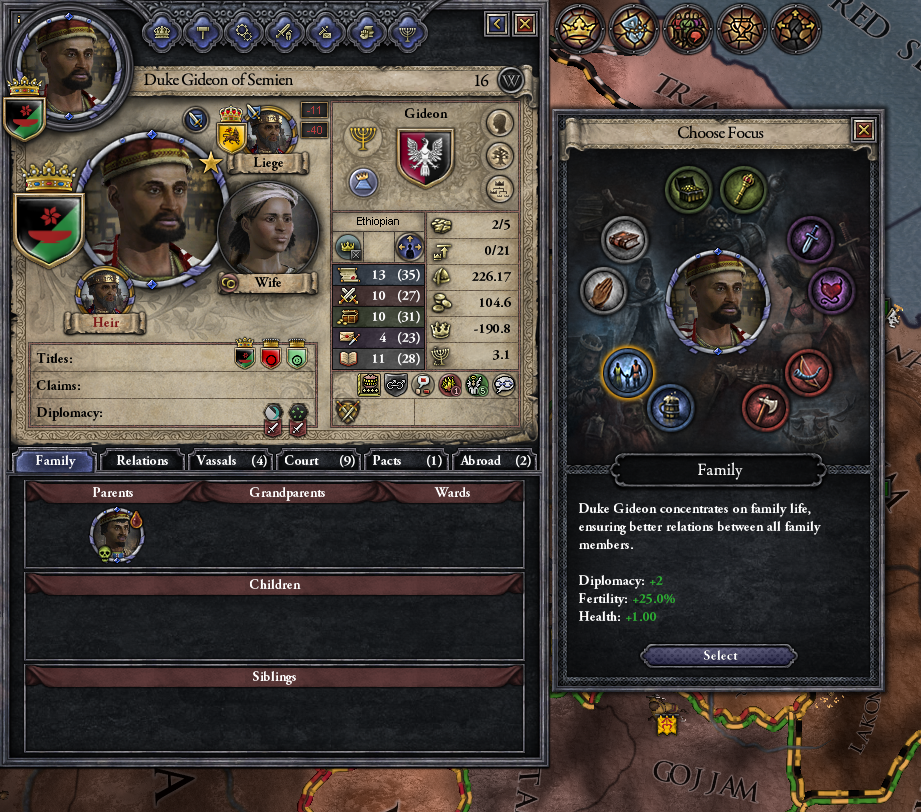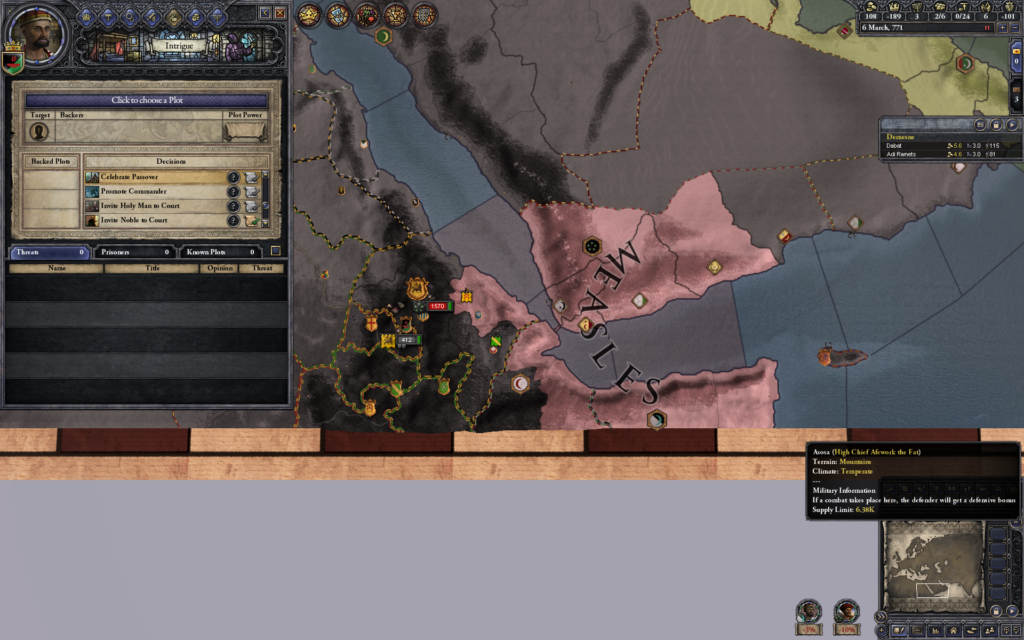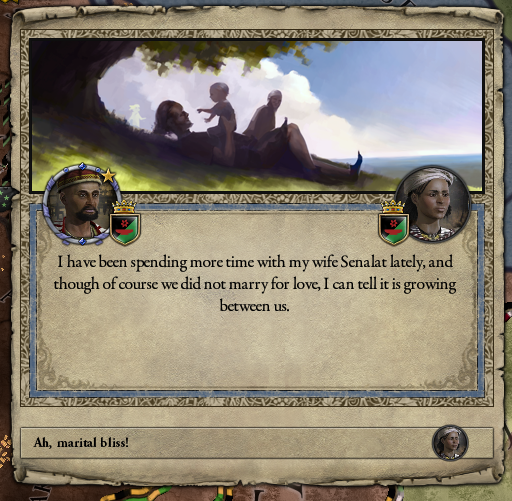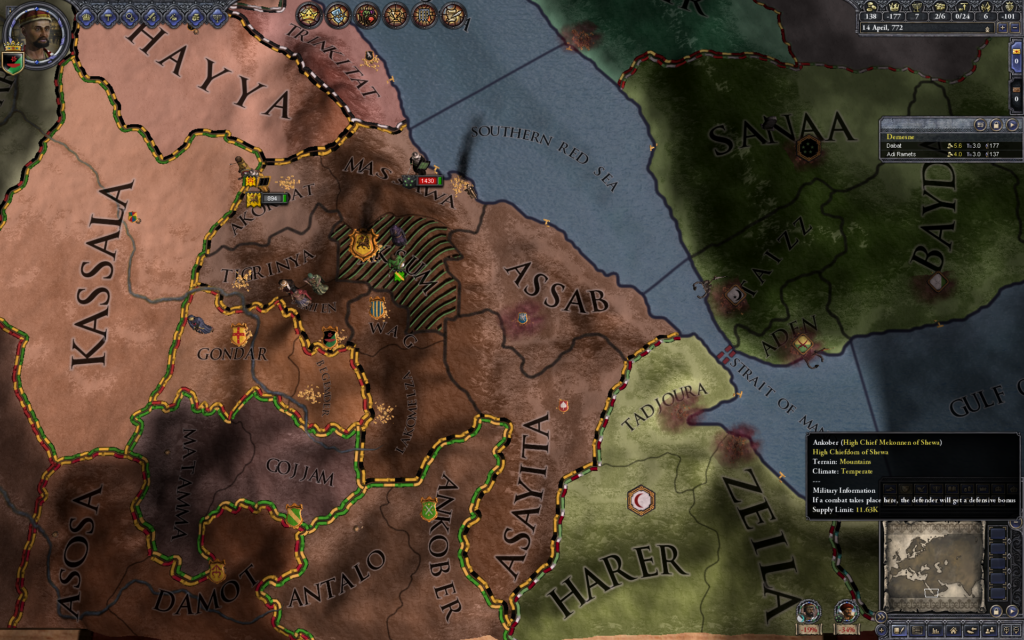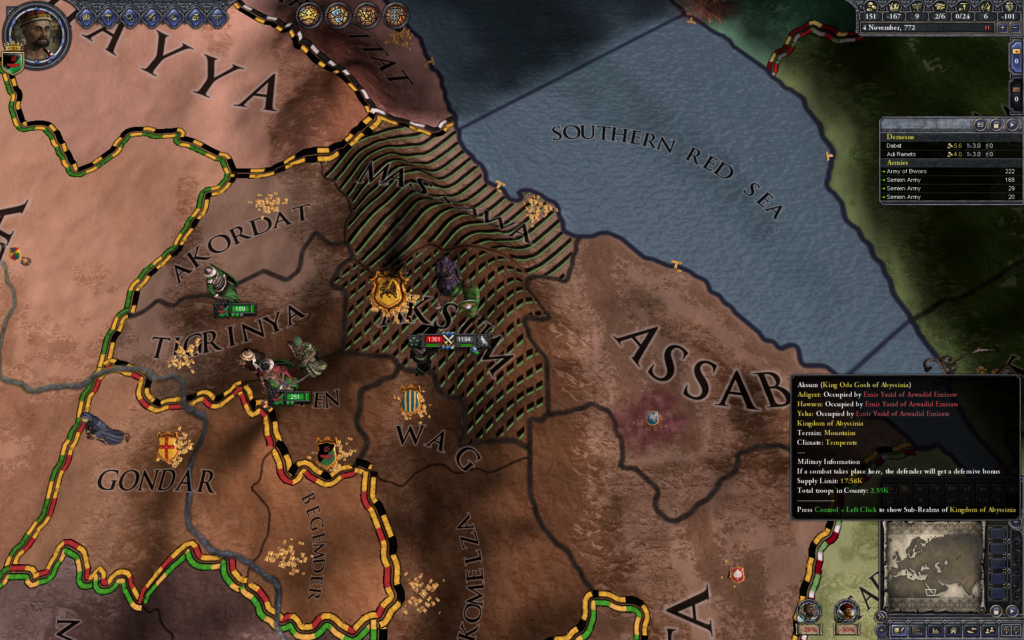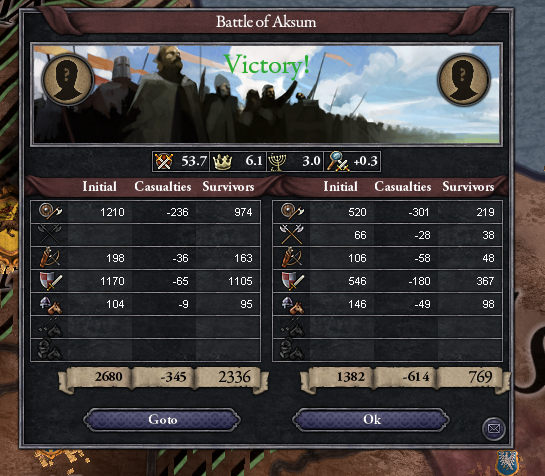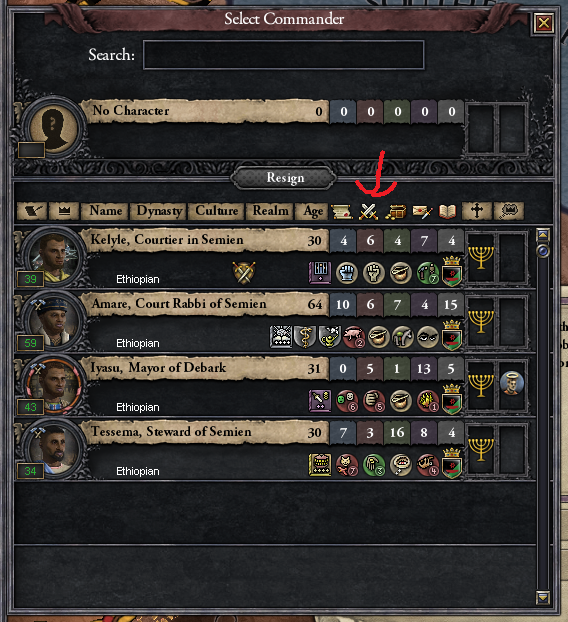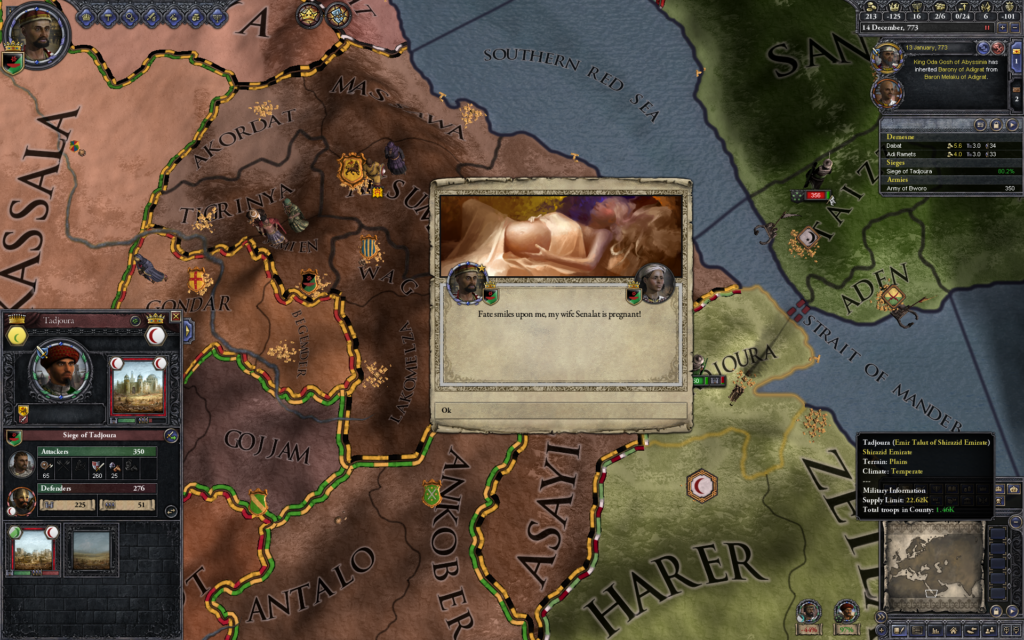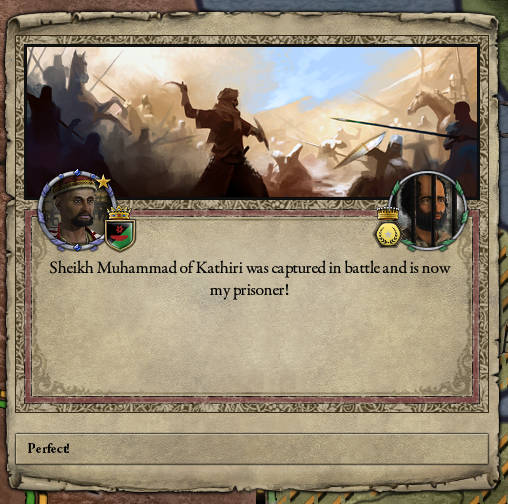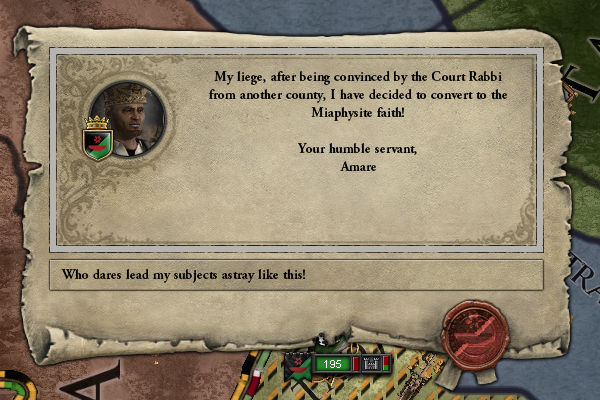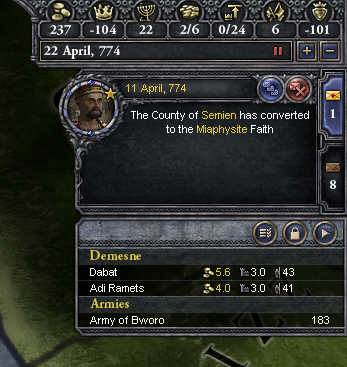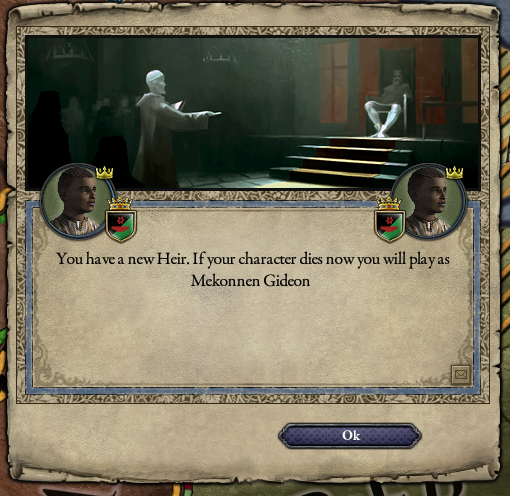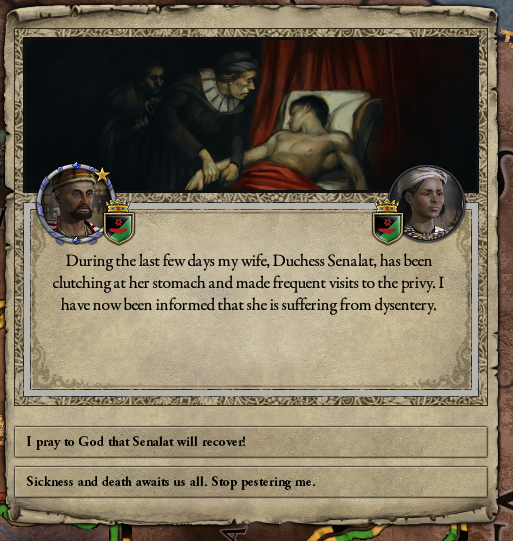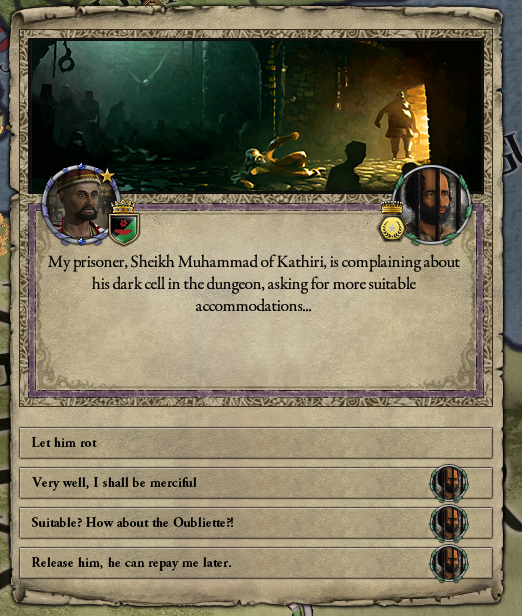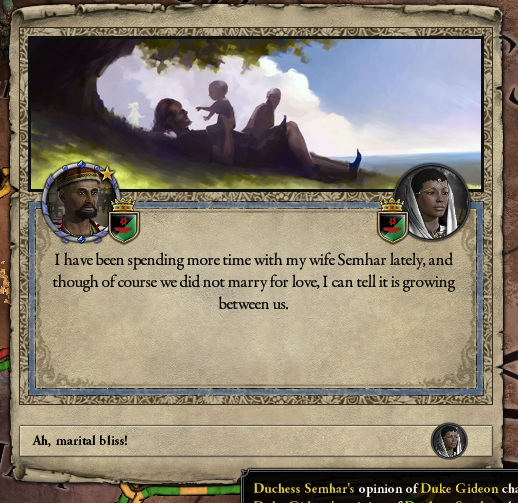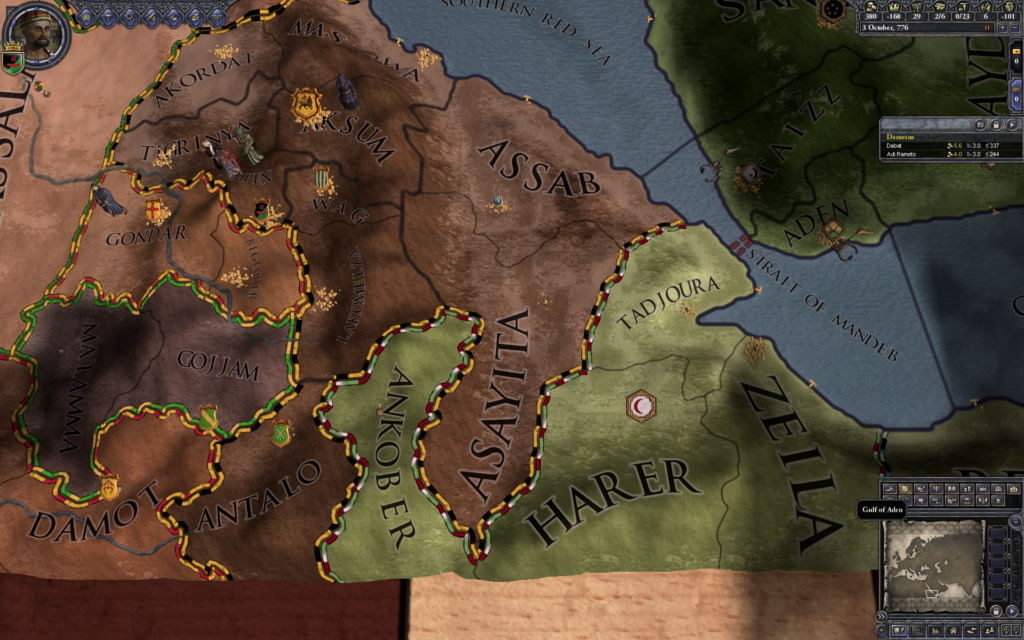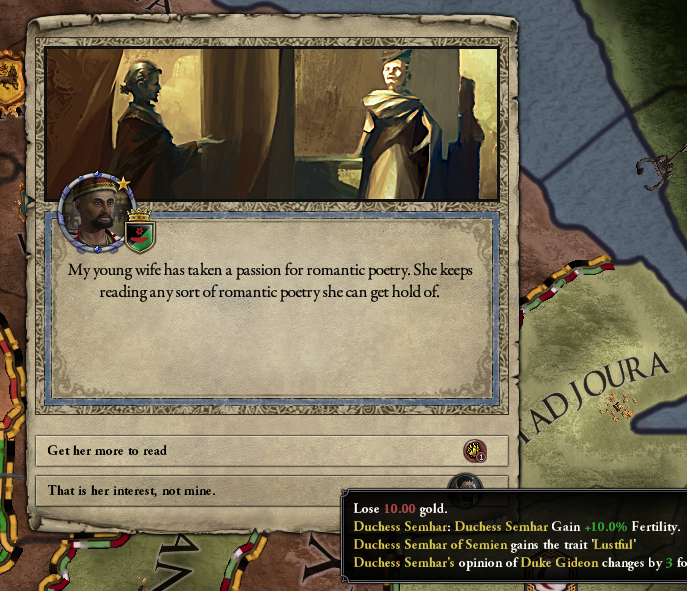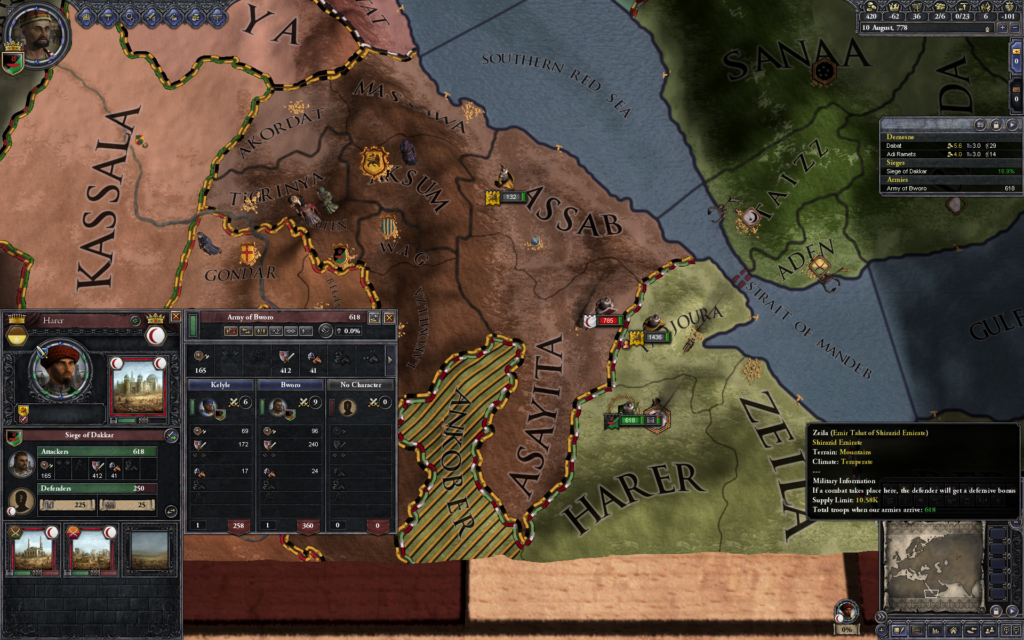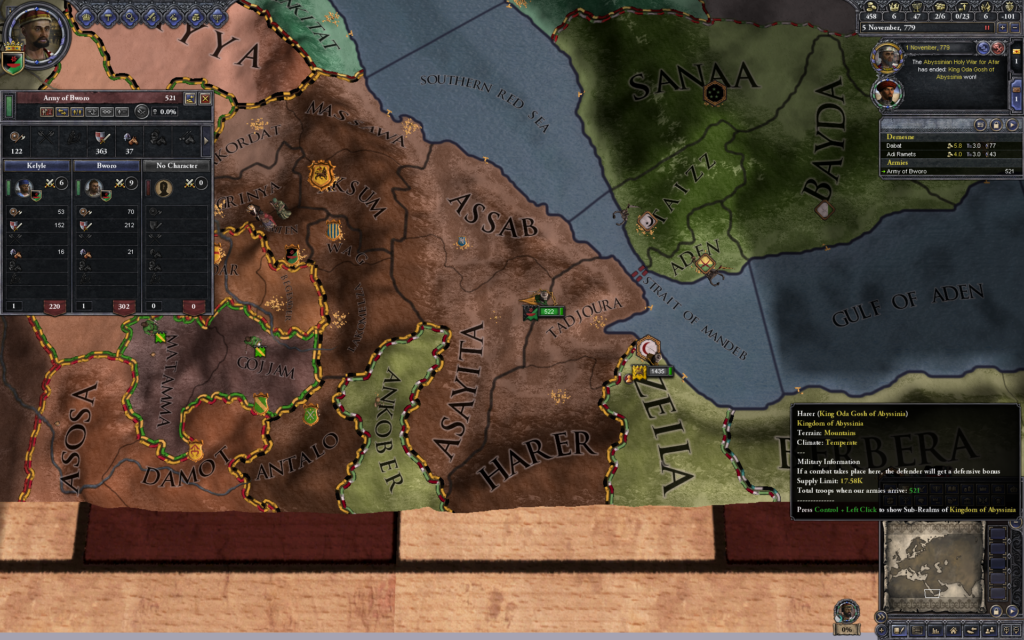Content, Crusader Kings Series 1, Excluded, Games
The Promised Land RELOADED #6
Part One, Part Two, Part Three, Part Four, and Part Five.
Back into the fray! This bit coming up turned out to be particularly war-filled.
Somewhat appropriately, my Marshal kicks things off by inventing the tank about a thousand years too early. Sadly you can’t actually use it.
Our liege for the moment in King Mamo, and his vassals are causing trouble. I send my spymaster to get dirt on them and convince them to stay out of factions. This one is stressed, insane, has syphilis, and homosexual, so I imagine it’s pretty easy.
King Mamo becomes brave via thought experiments.
I start the war against the Yusufids, but Caliph Abdul decides to join his co-religionists. Fortunately he has a lot of other things on his mind, though.
In the meantime, King Mamo grooms his eldest son Tengene to be heir. His stats are progressing nicely for age 12!
My half-sister wants to be on the council. A woman! Scandalous! I would happily support her, but she’s actually not a great choice for steward compared to the guy I already have. A sad day for women’s rights. (But more on that subject later…)
The Yusufids swear loyalty to the Muhallabids, bring them into the war. Unfortunately for the Yusufids, they basically don’t show up.
Another victory! The borders of Semien march north down the Nile.
Not wasting time, I go for Aydhab, the last county south of the Tujibids. It’s de jure part of the duchy I just took over, so I have a reason for war that won’t drag a bunch of neighboring countries in.
Prince Tengene turned out to be pretty smart, and he’s doing a good job as my spymaster.
Meanwhile, King Mamo continues his pursuit of the legendary White Lion and decides he’s found his purpose in life.
Strange things are afoot in the wider world. France is slowly taking over Spain, and the Byzantines are working their way back into Italy.
A random Khagan from the middle of Russia wants his son Crazy-Eyes to marry my daughter. He has an impressive number of umlauts, but I say no. He proceeds to offer every single one of his fourteen sons. There’s no “Take a hint, dude, it’s not which son that’s the problem” button.
Then, disaster! Losing the war, the Shehzadids spitefully decide to murder Prince Tengene, who apparently was not that great a spymaster after all. I have two other sons, but they’re already ruling their own territories, which makes them much harder to groom. Grr.
It’s a little late.
As the war against the Shedazids drags on, my angry vassals get together and demand more power. I’m not about to grant that, of course, so they take up arms.
Fortunately it doesn’t last. In the first siege I capture the son of the leader of the revolt, and he submits almost immediately. Everyone goes to jail and loses some titles, to be redistributed to more loyal followers.
Soon after, the Shehzadids concede the point, and my borders inch farther north. The path to the next target, the Tujibids, is clear, though I need to spend some time rebuilding my strength first.
?I will never be satisfied!?
Sometimes, all you need to do to get someone to stop trying to overthrow you is ask nicely.
With the army back up to strength, I declare war on the one-handed Emir of the Tujibids.
Eh, why not? He literally can’t be worse than some of the other guys.
By the way, if you’re wondering what happened to Jahzara the Demon-Spawn from last time, she apparently became a Jainist monk in eastern India. Waste of great military talent.
Dude, seriously.
Stahp.
Prince Berta, now heir to the throne, follows his dead brother’s footsteps both in the “becoming spymaster” department and in the “figuring out which vassals are gay” department.
The Tujibids are duly crushed. Now we’re getting somewhere! It presents a new problem, though — the patchwork of little countries is actually much harder to take over, since you have to declare war on them one-by-one. (You can do it simultaneously, but most of them aren’t actually tiny countries but small outposts of larger countries, so I don’t want to fight them all at once.) The mess left over from the Arabian Empire is still getting sorted out.
At this point I manage to outsmart myself, or alternately allow roleplaying to coax me into poor decisions. I’ve been working on increasing the status of women during this playthrough (with the ultimate goal of having female rulers) so moving to Agnatic-Cognatic succession seems like the logical stuff. For those of you unfamiliar with obscure inheritance terminology (shame on you!) this means that instead of only males being in the line of succession, women can inherit if there are no male children. (But males always have precedence. This seems to make sense, because my eldest son has three daughters.
Note that in the new line of succession, Berta’s daughters come before their uncles and great-uncles. However, I’d forgotten about a wrinkle that would cause much trouble later, which I’ll explain when we get there.
A consequence of expanding quickly is that people can form alliances against you. Sometimes this is bad, other times it just means a bunch of wimpy countries joining together and remaining wimpy. This, fortunately, is one of the latter times.
Jeez, I can’t see how that could go wrong…
Since I still have a truce with the Tujibids, next on King Mamo’s hit list is Banu Judham. A very complicated war ensues, in which another sultanate has also declared a holy war for the same territory, resulting in a sort of race to knock down the Banu Judham castles.
Prince Berta is a shockingly good spymaster. He seems to dig up dirt on everyone, almost immediately, and as a result my vassals are more obedient then they have been in years.
I realize that I’ve managed to marry one of my daughters to her first cousin. Shelbyville here we come.
Here we go again.
But King Mamo the Hunter isn’t going to let mere pain stand between him and the White Lion!
Again. Could be worse!
Hmm. Ideas?
“First, do no harm,” right?
Finally he resorts to massage.
When that fails, though, it’s back to good old scab-powder, which works its usual magic.
Look at this mess. (Counties with cross-hatches are occupied by invaders.) Every castle within a hundred miles is a smoking ruin as four or five different wars play out simultaneously.
Finally things calm down a bit. I end up with Alexandria, on the Mediterranean, but with someone else holding all its component baronies. At least I get Cairo too, pushing ever farther northward. I’m still not sure why I didn’t get the other Banu Judham county…
With the fall of Cairo (I think) the Caliph decides enough is enough. This bodes poorly. A jihad (in the game, this is historically inaccurate) is the equivalent of a crusade, which attacks a kingdom-sized chunk of land and invites all co-religionists to come help out and get piety rewards. Hopefully they’ll target some Christians and not me.
When my cancer plays up again, I go back to Tengene, and this time he gives me some mercury! What a good doctor.
A strange woman with a martial score of 20 shows at my court. This time, I’m happy to grant her request, since my current marshal is pretty terrible. Welcome, Lady Tavavich!
Now Duchess Falashina wants to be marshal, too! Unfortunately she’s pretty bad at it, though still better than the previous guy. I’ll keep Lady Tavavich.
A quick war with the Tujibids after the truce expires restore contiguity to Semien. I set my chancellor to work forging claims on the counties by the mouth of the Nile, so I can take them without starting massive religious wars. The only power that’s REALLY frightening, though, is the Sadiqids of Persia, who are fortunately Shia and won’t participate in the jihads.
King Mamo the Hunter finally succumbs to cancer after a long and glorious reign. Long live King Berta!
Now we have problems. King Berta is excellent at intrigue and has literally devoted his life to seducing women, although he somehow has only one bastard son. He completely sucks at war, though, which is disappointing.
More alarming, though, I now realize the consequences of my earlier decision. Since Berta has only legitimate daughters, his heir is the eldest, Princess Senalat. Unfortunately, she’s already married, and to someone not of my dynasty! The problem I alluded to earlier with Agnatic-Cognatic succesion is this — if a daughter seems likely to inherit, then you need to either marry her to a dynasty member or do a matrilineal marriage, which will make her children dynasty members. Unfortunately, since Berta wasn’t heir and had land of his own, I couldn’t control her marriage, so now if she has a son he will not be of the dynasty and inherit everything! This would be game over.
I immediately start taking steps to deal with this problem. Step one is to legitimize Loua, my bastard son. As a male, this puts him ahead of Senalat in the succession. That still doesn’t make me comfortable, though — he’s young, and if anything happens to him before he breeds, we’re in trouble again.
Unfortunately, doing this causes my wife to hate me. (She actually hated me already for being a horrible lecher.) Since that means she’s probably willing to help kill me, and it reduces the potential for more sons, she has to go. Send for the assassins!
Hmm, wait. Maybe not?
Nope. Definitely assassins. Though there’s some weird math going on here for those numbers to add up to -100. I think some things trump others.
Keren was apparently very unpopular, so it’s not long before I get my chance. Manure explosions, the old stand-by.
Searching for potential new wives, I find one who is awesome at stewardship (the key skill for wives) and is an old flame of King Berta’s who still loves him! Welcome Queen Kelile.
King Berta just can’t stop falling in love!
On the war front, I’ve managed to grab one additional county in the north. But I’m still more worried about succession. Senalat’s younger sister are both married safely (to dynasty members or matrilineally) so even if Loua dies their sons will be okay to inherit. Killing Senalat would be one solution, but you’re not allowed to assassinate your children, and simply imprisoning and executing her would make everyone in the country hate me as a tyrant. Instead, I try to assassinate her husband. If he dies, then I can remarry her safely or leave her as a widow.
Unfortunately, the inconvenient husband is very popular and difficult to assassinate. I try to invite him to my court, but he’s happily married and refuses to come. This is in spite of his massively favorable opinion of King Berta, which turns out to be because he’s gay and super-attracted to Berta’s wiles! Unfortunately, Berta doesn’t have the option to take one for the team and seduce him, which leaves us at a stalemate.
I’ve been holding off on more wars, expecting a major revolt from my vassals at some point. Unfortunately King Berta can’t act as his own spymaster. It finally arrives, with the dukes once again demanding increased power.
Fortunately, I have a pretty good army ready, King Berta’s crappy military stats notwithstanding. The revolt is led by the Duke of Makuria, so I spend most of the war laying siege to his castles and crushing his armies. In the meantime, my bastard son Prince Loua has turned sixteen and gotten married. If he can just sire some sons, we’ll get through this yet…
Oh, dear. I’m still hip-deep in the rebellion with the Caliph drops the entire Sunni world on my head. I quickly hire all the mercenaries I get my hands on and set about trying to finish things with the rebels, while Muslim armies lay siege to the castles in the north of Semien.
And, of course, it never rains but it pours. Prince Loua dies of pneumonia without offspring, which makes Senalat heir again. Once again the sword of Damocles is poised over my dynasty!
Queen Kelile comes through with a son, which removes the immediate threat. But his older sisters are almost certainly going to plot to kill him.
A Sunni uprising chooses the absolute best time to join the fray.
Finally, my main force catches up to the rebel army and smashes it, which spells the end for the rebellion. Once again, half my dukes go to jail, although Makuria promptly dies and leaves everything to his son. I immediately turn the army north to fight off the hordes who are smashing castles left and right.
There’s quite a lot of them, but fortunately Semien is rather large at this point. Since they’re attacking all of Egypt, it takes a long time to build up enough victories that I’d have to concede, so I have time to go liberate my castles.
As the march goes on, beloved high-stewardship Kelile gets dysentery.
Some large battles result, but thing pretty much go my way. Fortunately, being attacked by infidels makes all your vassals suddenly very friendly, which in turn makes them send more troops. Soon the main Sunni armies are crushed and driven off my soil.
Unfortunately, the queen dies. I quickly pick a new wife, still eager to get some backup sons in play.
King Berta will literally just fall in love with anyone. Which is appropriate, I guess, for someone nicknamed “the Lecher”.
Unfortunately, Nyala produces a daughter, which doesn’t help the situation.
After their armies are smashed, the Caliph agrees to a white peace. (Peace with no victor.) I could have pressed for total victory, but the rewards for winning against a jihad are actually pretty small, so this is fine with me. Egypt is safe, for now.
Nyala gives birth to another daughter. In the meantime Senalat has given birth to a son, Teka, who is now second in line for the throne after Kelile’s son Aman. This calls for drastic measures.
That takes care of that problem.
The Duke of Makuria, apparently have not paid any attention to what happened to his father, refuses to stop plotting against me, rebels, and ends up in prison.
Senalat’s second child is a daughter, which is no threat, and she now has syphilis. Hopefully this means she’ll die quickly. Still nobody wants to help me kill her husband, who is still in love with me, although somewhat peeved I murdered his son.
Finally, Nyala has a son (and another daughter at the same time!). There’s no guarantees until Senalat dies, but I’m probably out of the woods. Note to self — watch daughters’ marriages better!
Makuria is subdued, again, and another county in the north falls. Soon I’ll have completed my conquest of the Nile and start moving on my ultimate goal, the Kingdom of Israel.
Current Year: 1017 AD. Current Status: Relieved.
